






















 by BRUCE WEBER
by BRUCE WEBER



In the mix with:






















































 by BRUCE WEBER
by BRUCE WEBER



In the mix with:






























at Moroccanoil, we are passionate about healthy, naturally beautiful hair: enhancing every style, preserving the integrity of every strand and leading effective innovations in hair care.
Meet our first product: the original Moroccanoil treatment.
a revolutionary product that pioneered the oil-infused hair care category and single-handedly created the worldwide buzz on argan oil. an extraordinary formula that is an essential foundation for hairstyling, conditioning and a luxurious, shine-boosting finishing touch.
discover the oriGinal. Moroccanoil—the brand that started it all, with a product distinguished by its iconic turquoise label and a special seal of originality on every glass bottle.
www.moroccanoil.com
Off the

Rooms fit for living page 76
spring’s freshest uniform is infallible, effortless—and impossibly chic
start your engines with racing watches featuring r ugged, streamlined styling
designs,

Lucite looks page 64
spring’s
with
By



from
spring
light as air and packing a powerful punch, mousse is
Beauty
Ed Henry’s mission page 140

shirt, $950, THE ROW, barneys. com. honey floppy hat, $365, EUGENIA KIM , eugeniakim. com. celtic noir nautical cable necklace, $1,595, and gold collection necklace with chain, $1,995, CHARRIOL EXCLUSIVELY BY ALOR , charriolusa.com


today, men are trading traditional pursuits for an
has the iphone jumped the shark? cue the revival of its rival BlackBerry
Zero in on the new cameras that are much more than point-and-shoot
from customizable planes to five-star food, innovative ways airlines are catering to fliers

get light on your feet with barely there sneakers
the high life comes with problems. we’re here to help
a name-brand prosecco, better bouncers and a revamped nYc nightspot
Underwater images by Chris Leidy page 258

Kim’s place in the sun page 152
THE K FACTOR 15 2
fearless in the face of public scrutiny and a hopeless romantic in a cynical age, everywoman kim kardashian is impossible to define. at a shoot at Bruce weber’s miami home, inspired by his much-missed friend elizabeth taylor, writer alyssa giacobbe asks: is this kim’s golden era?
THE MAGIC OF MOONHOLE 17 0
Born from a dream and fought over for years, a deeply secluded caribbean community is now finally getting a second chance to come to life. george epaminondas takes a trip to the tropics
THEY’VE BEEN FRAMED 17 6
ten notables share with adam rathe the portraits they keep in their homes
UNSINKABLE 1 82
self-made multimillionaire doug Von allmen made a fortune through ingenuity and hard work. as a reward, he commissioned the $37 million yacht of his dreams—only to be hit by unimaginable storms. lisa depaulo on how he weathered those crises and survived to sail again


AMERICAN BEAUTY 186
hilary r hoda shows off some of spring’s most exciting looks and tells lindsay silberman the tale of her rise to the top of the modeling heap
THE THRILL OF SWANEE HUNT 19 2
as an advocate for women worldwide, swanee hunt makes her own legacy. nina Burleigh talks to the heiress about her evangelical upbringing and billionaire tycoon father
THE GREAT DANE 198
nikolaj coster-waldau made his name on Game of Thrones, but hollywood could be the next land the actor conquers. adam rathe charts his course
ASPEN
Kors on Kors page 176
2 06
the best alpine getaways; Brunello cucinelli comes to town; eye-catching art openings
CHICAGO
2 08
the hype behind new restaurants; retail roundup on the gold coast; a breakfast with the sar torialist and cocktails at trunk club
DALLAS
2 11
a nature and science museum doubles as fantasyland; lela rose honored at fashion and lifestyle awards
HOUSTON
2 14
a parisian creperie opens; hot sauces with cult followings; the menil collection turns 25; necessary prep for rodeo season
LAS VEGAS
21 7
simon hammerstein’s burlesque act hits the palazzo; chopard blings out the wynn; mandalay Bay’s revamped dining; four seasons’ art deco redo
LOS ANGELES
22 5
hottest java spots; devi k roell’s poolside dinner; the reigning brow queens; tommy hilfiger’s weho flagship; l.a.’s rising bloggers; art extolling the city’s golden years
MIAMI
2 31
the secret supper club; a hostel that’s hamptons-style chic; tor y Burch’s Bal harbour boutique; DuJour’s jason Binn captures the spirit of his second home; the locals’ favorite neighborhood
NEW YORK
24 3
intermix takes the Bowery; back-walking beauty routine; moma fetes tarantino; atera’s underground lounge; dentist to the stars; fit’s shoe obsession; DuJour celebrates digital cover star coco rocha; atlantic city art; englewood’s iconic mansion
ORANGE COUNTY
256
retro bowling; a russian-inspired black-tie gala; postmodern politics hits the art circuit
P ALM B EACH
258 underwater photographs; polo’s hottest rising star; a pair of notable parties
S AN F RANCISCO
260 hometown chef michael chiarello on the waterfront; julie wainwright shares labels she loves; vintage jewelry essentials; strand theatre’s long-awaited reopening; Belstaff’s neiman marcus bash; sweet and savory new dining spots
L AST W ORDS
264 courtney love lets her handwriting do all the talking
top to B ottom: B ruce we B er, michael mund Y


exquisite timepieces & jewelry • established 1878
700 fifth ave. & 55th st. • new york
• 212.397.9000
at the best addresses in germany, and in london, paris, madrid, vienna and new york
• open sundays 12 to 5
I8K rose or white gold rings, plain or with brilliant-cut diamonds. Create your very own personal combination or match with BLU earrings, necklaces or bracelets. From $625. Exclusively at WEMPE.

Welcome to DuJour’s spring issue. This season is all about coming into bloom, and our spring publication is a perfect example of that. On our cover is Kim Kardashian—or shall we say KIM, no different than how one would refer to Marilyn, Sophia or Liz—who has created a strong, lasting brand, style and sensibility all her own.
When I approached Kim about this project, I envisioned portraying her in a way no one had before. I’ve personally watched her go through many transformations and knew this was just the right time for her to been seen in an entirely new light.
The only person who could make that happen was my friend of over 20 years, Bruce Weber. As you can see, he knocked it out of the park. Kim showed up alone to the shoot, no entourage in tow, and she and Bruce worked together brilliantly. The imagery was so fantastic we decided to make it an 18-page feature— that’s the kind of quality that comes from a shoot lasting more than 14 hours, not to mention the many hours spent editing.
DuJour is about what’s coming into bloom right now—and we’re not the only ones who think so. Since it debuted in September of last year, DuJour has been recognized as “one of the most intriguing launches of 2012” by min and has received endless accolades and attracted millions of readers thanks to smart, interesting stories and breathtaking photography by worldclass artists. We’re not resting on our laurels, though; the bar here at DuJour just gets set higher and higher.
We recently welcomed a new chief digital officer, Robin Keller, to helm our website, which is already robust with the latest in style, celebrity, culture and travel and all the luxury-lifestyle news that you need to know.
(And if you like what you see, you can click to buy on almost every page.) Within just a few months, Robin’s already amped up our site—no surprise considering her amazing experience working for companies like American Media, Fox and CNET.
Off-line, we continue to have a strong presence at important events, from Art Basel in Miami to the Golden Globes in L.A. Everywhere I go, I see friends and loyal readers of DuJour Whether it’s Kellan Lutz at Lacoste’s party at Miami’s Soho Beach House or Nicole Kidman at BAFTA’s pre-Globes tea at the Four Seasons, it’s clear that the people, news and events we’re covering are what’s happening right now.
We’ve also hosted our own soirees, including a buzzed-about party with model, television star and DuJour digital-issue cover girl Coco Rocha and photographer and great friend Nigel Barker, along with his amazing wife Cristen, to celebrate their new hit show, The Face, at Richie Akiva and Scott Sartiano’s Manhattan hotspot The Darby, a truly magical location with a supper club.
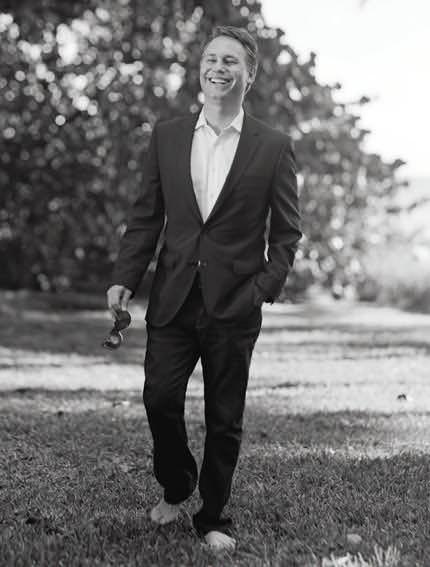
With all of this momentum, it’s not surprising some of the most exciting brands in the world have become new members of the DuJour family. We’re all about being inclusive, and we have been lucky to have such a wide variety of supporters alongside our esteemed partners, Gilt Groupe—especially their fearless leaders Kevin Ryan, Tom Sansone and Liz Francis— and Hudson News’ Jimmy Cohen and his amazing wife, Lisa. All of these people understand what my dear friend François-Henry Bennahmias, Audemars Piguet’s new CEO, once said: “To break the rules, you must first master them.”
None of this would be possible without you—our readers who pick up the magazine, browse DuJour. com and are always talking, posting and tweeting (@DuJourMedia) about our stories. We’re thrilled to present you with our latest issue and can’t wait to keep sharing with you on- and off-line.
See you again in the summer, when our next issue— sure to be full of sun, sand and surf—arrives!








Behind the velvet rope with DuJour CEO Jason Binn
Follow on Twitter @JasonBinn












Rudy Albers
Tracy Anderson
Jesse Angelo
Audra Baldwin
Avi Benayoun
Jeff Bercovici
Steve Birkhold
Matthew Blank
Peter Bonell
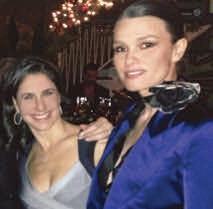



Jacalyn Bouza-Longaro
Randy Brandoff
Seth Browarnik
Nan Bush
Sarrah Candee
Andrea Chao
Robert B. Chavez
Guy Chetwynd
Vananzio Ciampa
Carl Cohen
Steve Cohn
Emily Coppock
Tracy Crane
Lisa Dallos
Chris Daly
Liza DeAngelis
Gil Dezer
Mehmet Dokumcu








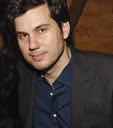



Susan Duffy
Carin Ehrenberg
Roger Ehrenberg
Marcy Engelman
Zach Enterlin
Donna Faircloth
Celeste Fierro
Cliff Fleiser
Trent Fraser
Jill Fritzo
Cori Galpern
JP Geoghegan
Isaac Gindi
Stefania Girombelli
Paul Goldfarb
Larry Goodrich
Bill Gould
Efraim Grinberg
Amy Gross
Desiree Gruber
Dave Grutman
Stephanie Hamada
Jimmy Handcock
Stacie Henderson
Teri Hill
Jeffrey A. Hirsch
Nick Hissom
OFFER NISSENBAUM “It’s nice to have a Peninsula” JASON STRAUSS, MICHAEL BAY #bluesteel DJ IRIE “Heating up the holidays” ELANA BOURKOFF, LARISSA BOND “Happy birthday, Aryeh” ARYEH BOURKOFF “Lion hearted” LA LA ANTHONY, LOREN RIDINGER “BFFs. Courtside of course” JAMES COHEN, CLIVE DAVIS “True leaders” DOTTIE HERMAN “Location location location”
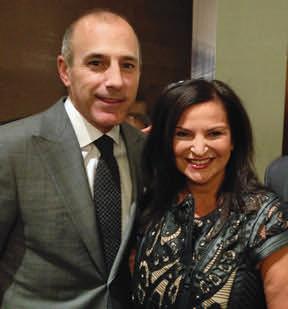







Rudy Albers
Tracy Anderson
Jesse Angelo
Audra Baldwin
Avi Benayoun
Jeff Bercovici
Steve Birkhold
Matthew Blank
Peter Bonell
Jacalyn Bouza-Longaro
Randy Brandoff











Seth Browarnik
Nan Bush
Sarrah Candee
Andrea Chao
Robert B. Chavez
Guy Chetwynd
Vananzio Ciampa
Carl Cohen
Steve Cohn
Emily Coppock
Tracy Crane
Lisa Dallos
Chris Daly
Liza DeAngelis
Gil Dezer
Mehmet Dokumcu
Susan Duffy
Carin Ehrenberg
Roger Ehrenberg
Marcy Engelman
Zach Enterlin
Donna Faircloth









Fierro
Cliff Fleiser
Trent Fraser
Jill Fritzo
Cori Galpern
JP Geoghegan
Isaac Gindi
Stefania Girombelli
Paul Goldfarb
Larry Goodrich
Bill Gould
Efraim Grinberg
Amy Gross
Desiree Gruber
Dave Grutman
Stephanie Hamada
Jimmy Handcock
Stacie Henderson
Teri Hill
Jeffrey A. Hirsch
Nick Hissom
Ken Hogan





Marc Hruschka
Jolie Hunt
Samir Husni
Michael Jesselson
Mitch Kanner
Iraklis Karabassis
Jim Kerwin
Madison Keyser
Jessica Kl ein
Diana Koo
Neal Kusnetz
BERNARD AIDAN “Trés chic” JYOTHI RAO, KEVIN RYAN “Gilt obsessed” TOM FLORIO, PHILIP GUARASCIO, RON GALOTTI, RICHARD BECKMAN, GIULIO CAPUA, LOUIS CONA “Italian guys” KARA AND STEVE ROSS “As good as it gets” LAURA DUPONT, LISA OZ, LISA COHEN “The real bosses” MATT LAUER, VERONIQUE GABAI-PINSKY “Style and substance” #zegnafrangrance FRED WILSON “The Midas touch” STEVE ZACKS “Always up for stone crab at Joe’s” ANDREW HEIBERGER, NICOLE OGE “Perfect team” MITCHELL DAVIDSON AND NINA RENNART DAVIDSON “The best couple!” JAMIE FOXX “Merry Christmas, No. 8” #AmySacco HRATCH KAPRIELIAN, RON JACKSON “Masters of complication” CHARLES KOPPELMAN “The Energizer Bunny” EYAL LALO “Always on Invicta time” Celeste MELISSA PORDY “A true gem” DAMIAN MOULD “Everyone needs a few days off.” #SohoBeachHouse #Belstaff NATHAN LIEBERMAN “My brother-in-law” HOWARD BRESSLER, JEFF ROSEMAN “Real estate moguls”






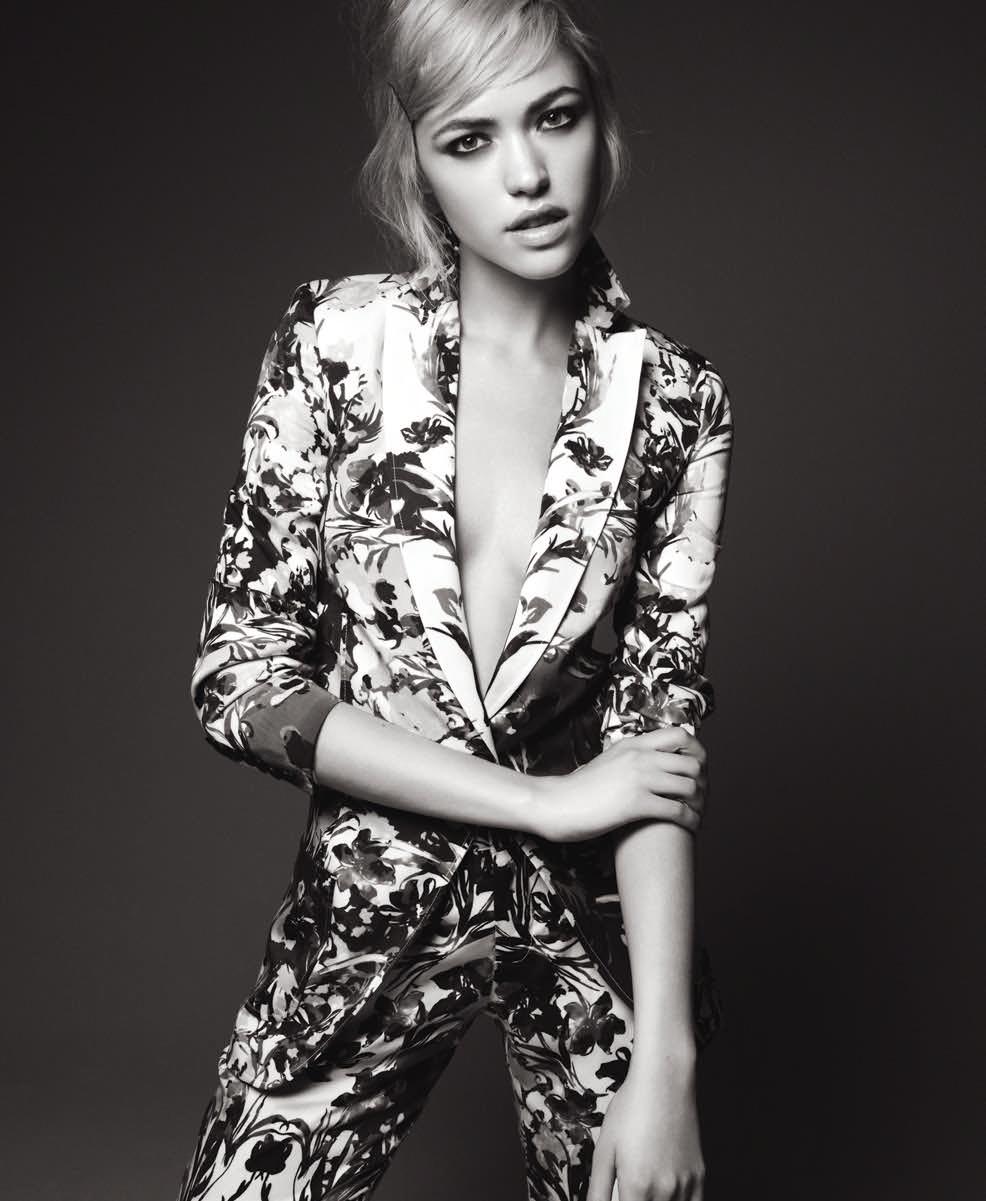





KEITH POLLOCK: Let’s start with the giant reality star in the room, shall we? When we first began discussing our interest in putting Kim Kardashian on the cover of the magazine, we’ll be honest: We got some mixed reactions. It’s fascinating. No matter how successful Kim gets— and she’s phenomenally successful—she remains very polarizing.
N ICOLE VECCHIARELLI: The truth is that Kim Kardashian was a natural fit for DuJour. She’s something of an everywoman: a self-made, work-obsessed branding genius who also happens to look really good. Because she has pretty much lived her entire life on the record, the perception may be that we know all there is to know about her, or that we have nothing to learn from her. But there is, in fact, quite a lot to learn from Kim. For starters, she’s flawlessly professional. She’s also a master of reinvention, a woman who, after all, overcame a scandal to become one of the most powerful media moguls working today.
KP: Reinvention became a running theme throughout the issue, in fact: turning things on their heads, creating unexpected points of view. We know that most people who’ve achieved great success have had to reconsider



something about themselves—reposition or rebrand. So much of success is about image and perception, altering how you see yourself or how others see you. Or both.

NV: Recreating your image, we found, can take on many forms. Sometimes, it can be literal, like in our story about the increasing demand for “foot face-lifts.” Sometimes, it can require assistance. In our Q&A with crisis manager Lanny Davis—who’s bandaged the images of Martha Stewart, Bill Clinton and Whole Foods—he offers readers advice on how to deal when your image isn’t as good as it can be. (Whose ever is?) For our story with Kardashian, we were especially excited to enlist the eye of photographer Bruce Weber, who ultimately captured not just one new way of looking at the reality star but multiple, leading to our first-ever split cover.
KP: The idea of becoming someone new also showed up in our profile of New York Knicks star Tyson Chandler. Not long ago, Chandler was searching for an off-court style that would suit him—and his 7-foot-1inch frame. Not every experiment worked: his skater phase, for instance. Now, though, he’s regarded as one
of the best-dressed men in sports, and is helping other athletes discover their own personal style. We also spent time with Josh Groban, the “popera” superstar with surprising edge; the once-snubbed American supermodel Hilary Rhoda; and Eleanor F. F. FábregaBush, who went from living on the streets in Panama to playing muse to one of America’s most powerful political dynasties.
NV: Even food critic Gael Greene’s ode to eating at the bar is about a shift in perception. In her story, she dethrones the coveted restaurant corner table, arguing that the best seat in the house may be the one you least expect.
KP: Speaking of powerful politicians, as this issue was going to press, legendary New York City mayor Ed Koch passed away. Just weeks before, Koch had given one of h is last interviews to DuJour —originally intended for our portfolio of celebrity portraits, “They’ve Been Framed”—in which he looked back at his work with gay rights, some of his more divisive decisions and the recent documentary about his life, Koch He also, quite poignantly, talked about the importance of public perception—and how easily it can shift.
NV: We encourage you to check out Adam Rathe’s interview with Koch on DuJour.com and hope as you read it—and this issue—you’re inspired to look at the people, places and things in your life a little differently. Maybe even yourself. Maybe, even, a certain reality star.
THOMAS WHITESIDE Split covers by Bruce Weber: Nicole Vecchiarelli & Keith Pollock Left: Corset, $128, MARCIANO, marciano.com. Right: Sierra dress, $598, DIANE VON FURSTENBERG , 646-486-4800. Custom headpiece by Eloitse Corr Danch. On eyes: Eyes to Kill Shimmer Quad in Mirage, $59, and Face Fabric Foundation, $49, GIORGIO ARMANI BEAUTY, giorgioarmanibeautyusa.com




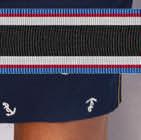


Co-Editor in Chief keith pollock
Co-Editor in Chief
Nicole vecchiarelli
Art Director
Stephanie JoneS
Executive Editor
nancy bilyeau
Editor at Large alySSa Giacobbe
Features
Deputy Editors
Daryl chen (Features), nataSha wolFF (cities)
Articles Editor
aDam r athe
Staff Writer linDSay Silberman
Research Editor ivy paScual
Associate Editor
natalia De ory
a rt + Photo
Photo Editor
etta meyer
Designer
Gina naStaSi
Fashion + Beauty
Senior Market Editor
SyDney waSSerman
Assistant Fashion/Market Editor paul FreDerick
Editorial Assistant brooke bobb
Regional Editors
anna bleSSinG (aspen, chicago, las vegas, San Francisco), holly crawFor D (houston), rebecca kleinman (miami), chaDner navarro ( new york, tri-State), maxine trowbriDGe (Dallas)
Correspondents
anDrea ben nett (las vegas), Genie FitzGer alD (los angeles and orange county), car loS lopez (los angeles), DaviD naSh (San Francisco), linDley pleSS (tri-State), nicki r icheSin (San Francisco)
Contributors
paul bieDrzycki (automotive), patricia boSworth, liSa cohen (home), Dor i cooperman, DouGlaS FrieDman, caSSan Dra Grey, beth lan Dm an, alexan Dra peerS, J eFFrey poDolSky, mickey r apkin, r hon Da r iche, lee brian SchraGer, michael Solomon, tyler thoreSon, lauren waterman, thomaS w hiteSiDe
Contributing Editors
melanie carnSew (art), kate crane (copy), kara cutruzzula (Features), antoine DozoiS (copy), nick earhart (copy), kelly StaikopouloS (research), anne torpey (copy)
Interns
GwenDolyn belanD, eSmae Dur an, meaGhan hartlanD, eFi turkSon
Director of Editorial Operations haley
copyright
Web Design coDe
Chief Revenue Officer alan k atz
Executive Director
Gayle perry Sobel
Executive Director
phil witt
Executive Director ron Stern
Project Manager
iSabelle mctwiGan
Executive Assistant
caitlin hoSek
Sales Assistant
JenniFer lentol
Chief Advisor
monty ShaDow
Executive Vice President
cynthia lewiS
Vice President, Production
Shawn lowe
Prepress Managers
Joh n FranceSconi, michael oh Coordinator robert cohen
Print and Paper Management
calev print meDia
Financial Controller allie SchiFFmiller
Chief Digital Officer robin k eller
Vice President of Product Development
max mcDonnell
Digital Strategy Director
linDSay k aplan
Web Editor
Sarah leon
Senior Web Developer
DaviD De loS SantoS
Web Producer
Julianne moSoFF
Founder/ceo JASOn BInn
chief Financial off icer
co-chairman JAMES COhEn
CARyn WhItMAn
co-chairman K EVIn RyAn

General Counsel
John a Golieb







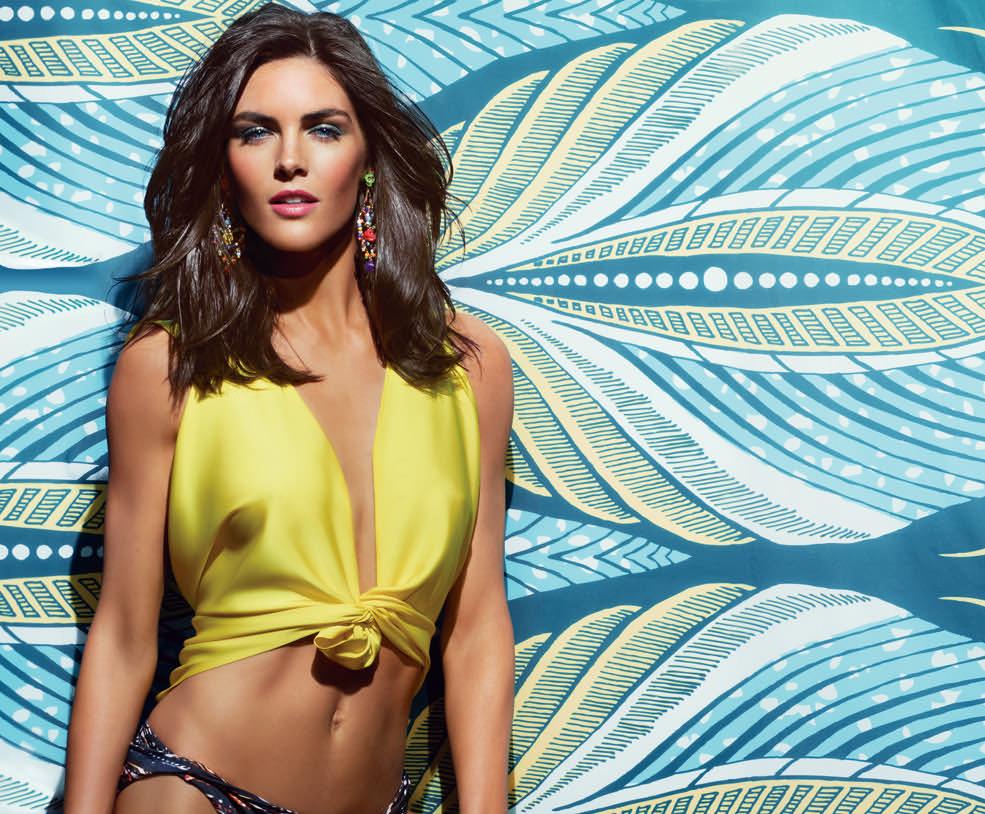

du jour [ doo zhoor ] adjective [from French: of the day] example: What is your soup du jour? Getting to know some of the talent behind this issue—lunch order and all!

w RIT e R , “ B a R CO de,” page 80
Soup DuJour: My Mother’s Pea Soup
For her debut story in DuJour, former New York magazine restaurant critic and essayist Gael Greene was forced to dine where she had never dined alone before: the bar. The author of Insatiable: Tales from a Life of Delicious Excess discovered the new trend of going solo was accompanied by charming service from the bartender and unexpected benefits. “It’s always sexy when you are a two, but it can also be sexy if you’re a one surrounded by people who are trying to make you a two,” she says. Her dream dining partner is The Omnivore’s Dilemma author, Michael Pollan, whom she would try to persuade to “let go and have a little pork belly.”

ST yl IST, “ T he g R eaT da N e,” page 198
Soup DuJour: Vegetarian Chili
Despite being a fan of Game of Thrones, Allan Kennedy resisted asking Nikolaj Coster-Waldau for spoilers, even though the actor recently wrapped filming on the upcoming season. For DuJour’s “The Great Dane” shoot with CosterWaldau, whom Kennedy says exudes a “rugged and relaxed” style, he chose clothes that weren’t too structured in order to allow the actor to lounge and act natural. The Scottish-born stylist has worked with everyone from Samuel L. Jackson to Michael Phelps to David Beckham.
w RIT e R , “wh IT e CO lla R ,” page 46
Soup DuJour: French Onion Longtime fashion journalist Lynn Yaeger admits her own 1920s-inspired style may appear at odds with the simple white shirt, the virtues and allure of which she explores in this issue, but she certainly appreciates the appeal of a uniform. “As I got older, I started to live out my clothing fantasies much more. My look is very much like the toddlers I see on the street wearing polka-dot tights, a tutu and a little sweater,” she says. “I think, Oh, that’s kind of what I’m wearing today, too!” Yaeger, who began her career 30 years ago as a fashion reporter at the Village Voice, is a contributing editor at Vogue and writes for other publications.

p RO p ST yl IST, “ T he k fa CTOR ,” page 152
Soup DuJour: Duck Soup
“One day you are creating a snow-covered mountain ridge and the next day a Hawaiian beach scene,” says Dimitri Levas of the everchanging nature of his career as a prop stylist, which has placed him alongside such famed photographers as the late Robert Mapplethorpe and, in this issue, Bruce Weber, whose images of Cy Twombly, Louise Bourgeois and Eudora Welty are some of Levas’ favorites. For the sun-dappled Weber shoot with Kim Kardashian, Levas took inspiration from a Hawaiian Polynesian princess and crowned her with a bold headpiece fashioned by artist Eloise Corr Danch.


w RIT e R , “ UNSIN ka B le,” page 182
Soup DuJour: Any of Mom’s Italian Soups When Lisa DePaulo began researching the story of multi-millionaire Doug Von Allmen and his over-the-top yacht, she was intrigued by the strangely calm attitude of a man who lost a ton of cash to a larger-than-life Ponzi plot. “If there weren’t a Madoff, this would have been all over the place,” she says. “It was a sexier scheme, one with fascinating characters who all basically came from nothing.” DePaulo, who has written for GQ, Vanity Fair and The New Republic, was particularly fascinated by the boat, which “even included plans for an outdoor airconditioning system.”


ph OTO g R aphe R , “ T he g R eaT da N e,” page 198
Soup DuJour: Split Pea
“Working with him was a total pleasure,” photographer David Armstrong says of Nikolaj Coster-Waldau, the actor enjoying success for roles in TV’s Game of Thrones and the film Mama. For the “The Great Dane” portfolio, Armstrong, who is one of the industry’s most celebrated men’s portrait and fashion photographers, took inspiration from his subject and the ideal ambience created by “divine” surroundings in an apartment on Washington Square in New York City. “The quality of light was perfect,” says Armstrong, whose work has appeared in French Vogue, L’Uomo Vogue and GQ “I’m currently drawn to a high ratio of light to shadow and am particularly loving the darkness.”

ph OTO g R aphe R , “g O f OR B a RO q U e,” page 51
Soup DuJour: Mom’s Kimchi Stew
In pairing spring fashions with intricate wallpaper prints, Ina Jang conceptualized a bold new trend for this season. The photographer, who recently graduated from the fashion photography program at New York City’s School of Visual Arts, says that her goal was to “create an optical illusion, as if the model was cut out or merged into the actual paper,” while ensuring she appeared “simple and elegant.” As to whether she could pull off a daring wallpaperinspired print in real life, the New York–based Jang replies in the affirmative: “Perhaps I could wear Cavalli’s blue and white jacket with the backdrop behind me at all times.”
aly SS a g I a COBB e
ed ITOR aT la R ge, “jewel O f jama IC a,” page 88, “lap O f l U x UR y,” page 92, “ f ee T O f p lay,” page 96, a N d “ T he k fa CTOR ,” page 152
Soup DuJour: Minestrone While interviewing DuJour cover girl Kim Kardashian, Alyssa Giacobbe found the reality star “open and strikingly honest, even at a time when things are crazy for her,” with a new boyfriend and house and, of course, a baby on the way. Says Giacobbe, “I think a lot of people have this perception of her as stiff and calculating, but she is sweet, genuine and doesn’t make any apologies for who she is.” In this issue, Giacobbe also reveals a new trend of nips and tucks for the feet and discovers how the pampered pet of Barbara Bush lives, in “Lap of Luxury.”

C had N e R N ava RRO

CORR e S p ON de NT, CITI e S : la S vega S , page 217
Soup DuJour: Guy Savoy’s Artichoke Soup
As the Cities correspondent for Las Vegas, Andrea Bennett most enjoys the “outrageous openings” that take place in America’s epicenter of excess. Luckily, those will be in abundance this spring, with an influx of technologically savvy spas, a new boutique from luxury jewelry maker Chopard inside the Wynn and chef Akira Back’s upcoming restaurant at Mandalay Bay. But Bennett also appreciates a throwback. She names the kitschy, 24-hour hangout Peppermill as her favorite oldschool spot on the strip, where its Fireside Lounge is complete with the “last real, live lounge lizards... and everyone else.”
ed ITOR , CITI e S : New yOR k, TRI -STaT e, page 243
Soup DuJour: Fish Soup Chadner Navarro came to Jersey City by way of Manila 18 years ago and has made his career exploring the area’s burgeoning nightlife and culture scene. As DuJour’s Tri-State editor, Navarro explains that one of the most enjoyable aspects of the job is getting the opportunity to reveal to a wider audience many of the amazing places in Jersey City, “a town that lives in the shadow of Manhattan, which is not always a bad thing.” In this issue, the regional section spotlights Atlantic City’s transformation into an art hub with its new Artlantic project, which is installing contemporary artwork around the famous boardwalk.








































































What happens when you pair a reality-TV siren with one of the most highly regarded photographers in the world? Here’s a behind-thescenes glimpse: On set at Bruce Weber’s beachfront home in low-key Golden Beach, Florida, newly pregnant Kim Kardashian transformed into the exotic Tahitian princess Weber had envisaged, moving from his guest house to his garden and backyard beach (with paparazzi silently lurking, of course). Just as the sun began to set on the Atlantic,



the photographer’s shaded gunite pool served as the backdrop for the final shot—an image that ultimately became one of our two spring covers. Later in the evening, Kardashian sat down with entrepreneur and former Warhol darling Cornelia Guest—who, like Kardashian, knows a thing or two about living in the cultural spotlight. For their on-camera interview (which you’ll find at DuJour.com), the two headed to C. Madeleine’s, a 10,000-square-foot vintage showroom on Biscayne Boulevard in North Miami Beach. From ’30s-era furs to
exotic-skin bags and everything couture in between, C. Madeleine’s is bona fide fashion wonderland—and it also happens to be one of Weber’s favorite hunting grounds for unique pieces to use on set. (Guest was so taken by the store that she ended up falling in love with—and taking home—a sharp Thierry Mugler suit.)










During their chat, Kardashian opened up about the experience of working with Weber for the first time. “I’ve been such a huge fan of his work for so long,” she said. “It was just such a dream come true.”




























They might look effortless draped around Kardashian’s neck, but these Tahitian pearls by Graff are among the most complex in the world. Organic pigments in the oyster cause their coloration to vary drastically (from charcoal to silver and even shades of so each strand is enexotic-skin and cou-







one of a kind. Find out more about the jewelry

green), therefore entirely one of a kind. out more about the on set at DuJour.com.


Looking for a restaurant recommendation in Chicago? The hottest new hotel in Houston? From New York to Palm Beach to Los Angeles, DuJour. com/Cities has the latest news in nightlife, food, real estate, parties and cultural happenings.










Spring’s uniform is infallible, effortless—and impossibly chic. Lynn Yaeger tries it on. PHOTOGRAPHED BY GRANT CORNETT






It’s crowded out there. Busy, noisy. Even those among us who pretend to have no interest in fashion must have noticed the panoply of choices, the endless clamor of suggestions, the dizzying array of garments at every price point, for every enthusiasm, every fantasy: Floating ankle-length caftans or semipornographic jeggings? Jailbird stripes or exploded peonies?

With spring 2013 designs arriving by the truckload, is it any wonder that so many exhausted people, visually stimulated to the point of near-blindness, seek a solution by taking refuge in a uniform, a mode of dress that refuses to go in or out of style? We are not talking here of bland shufflers who retreat to the dull, the obvious, the depressingly practical— not for this discussion are t he khakisand-polo addict, the shift-and-stilettos settler. No, under our micro scope are those who’ve dreamed up ingenious solutions, stalwarts strong enough to stick to convictions even if their ideas are seen by the larger world as slightly nutty.




ly composed of a droopy cardigan and a glittery tulle dance skirt in places where other grown-ups thought a sober Chanel suit was in order.)

Or, sometimes, more than slightly. Consider the case of designer Peter Marino, so comfortable in his own skin that he can stroll around town in full-on leather-daddy regalia, looking like the world’s oldest extra in The Wild One Or recollect the choices of the Italian writer Anna Piaggi, whose insane eclecticism encompassed Poiret cocoon coats and McDonald’s employee aprons.And what of Diana Vreeland, with her all-black outfits relieved only by a crimson mouth and a pa ir of rouged earlobes? Or the artist Frida Kahlo, who spent the 1930s swanning around Mexico City in tiered peasant skirts and offthe-shoulder blouses? (Full disclosure: This author has for years—OK, decades—sported ensembles frequent-

Maybe you’re thinking, sure, that Peter and Frida can spend all of their time hooking up outfits in front of the mirror—but what about the vast silent majority who crave simpler solutions? Luckily for you, good news is afoot: Lots of chic characters have spent the past 200 years constructing clever uniforms around that blissful basic, the white shirt. And—more good news, if you can stand it—this season those bits of starched heaven have been trotted down runways from Balenciaga to Hermès to Stella McCartney (which means that inevitably—and very soon—Zara, H&M and Forever 21 will st ock them too).
What other single item suits both Ralph Lauren and Janelle Monáe? Is there another innocent top that begs to be dressed up with a bowler hat and a



pair of braces in a ’70s revival à la Diane Keaton’s Annie Hall but is just as appropriate covering the aristocratic Nan Kempner, dressed down for a bit of tony landscaping? And when it came to putting something atop a lilac Vera Wang skirt for the 1998 Oscars, what did Sharon Stone employ? And how effortlessly cool is this item that when you emerge from the fitting room, wearing torn jeans and an Ann Demeulemeester youknow-what, with your hair a mess, and your best friend says you look like Patti Smith, you know exactly what she means? With a shirt so enticingly austere, we wouldn’t be surprised if Peter turns up next season with an ex panse of tidy white flung casually over a harness, or if even this author caves in and throws an oxford circus over her tutu.




Start your engines with racing watches featuring built-in tachymeters, chronographs and rugged, streamlined styling
PHOTOGRAPHED BY BRAD BRIDGERS


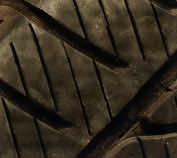
Clockwise from top: Mille Miglia GMT Chrono watch, $6,610, CHOPARD, us.chopard.com Conquistador Grand Prix watch, $30,500, FRANCK MULLER , Neiman Marcus, 800-365-7989. Oyster Perpetual Cosmograph Daytona watch, $37,450, ROLEX, rolex.com Monaco watch, $3,600, TAG HEUER , shop.tagheuer. com Barnato Racing watch, $12,130, BREITLING FOR BENTLEY, breitlingforbentley.com TW607 watch, $850, TW STEEL , bloomingdales.com
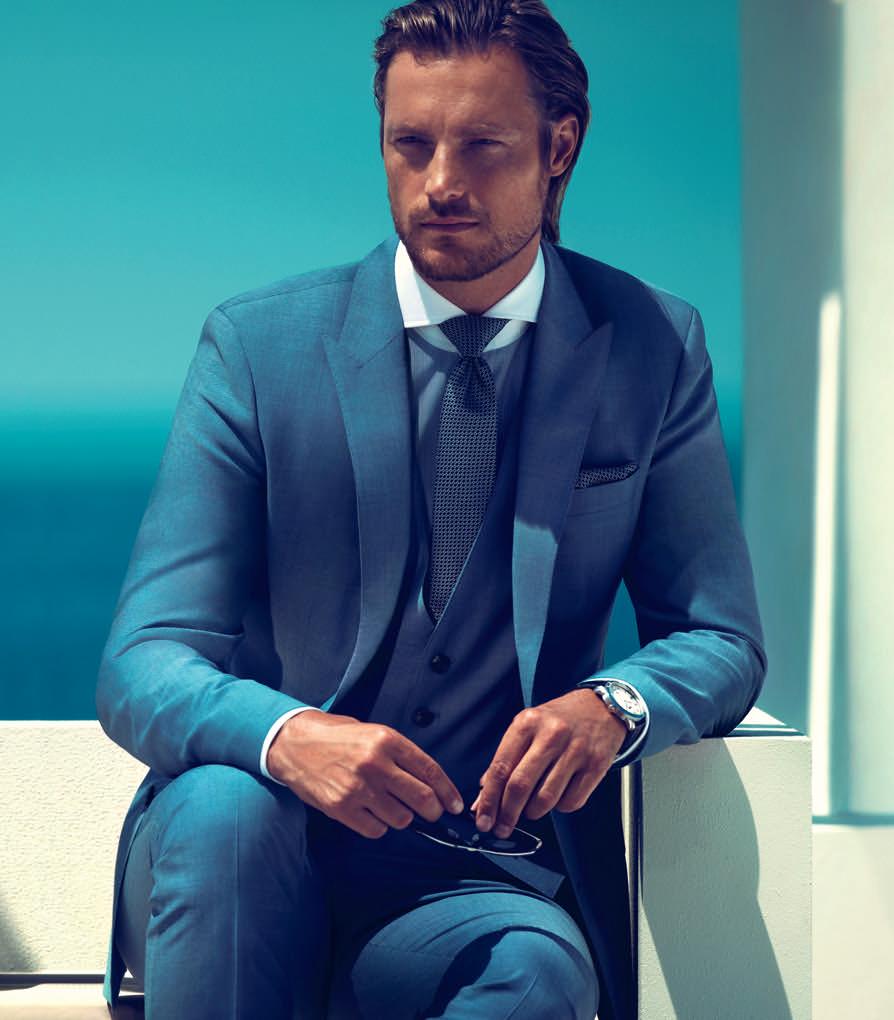
An offshoot of classic and floral designs, wallpaperinspired prints are in bloom this season
PHOTOGRAPHED BY In A J A n G

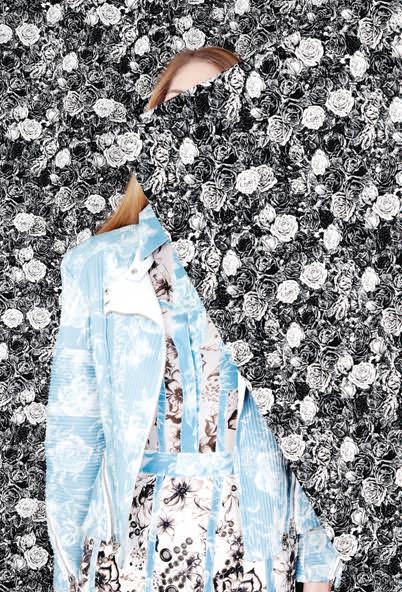












For most people, the words “10-year reunion” are enough to send them into a panic, but for the boys behind Proenza Schouler, the post-college decade mark means a chance to bask in their prodigious accomplishments: a newly opened flagship on Madison Avenue, a growing trove of CFDA Awards and a cadre of PYT fans, like Kate Bosworth and Rihanna. When Jack McCollough and Lazaro Hernandez showed their thesis collection before graduating from Parsons design school 10 years ago, they never imagined the kind of success it would beget. “We had no idea what was to come or the level of attention that followed shortly thereafter,” McCollough says. “As students, we would always dream, of course, but having our own c ompany wasn’t talked about much,” Hernandez adds. “It really just sort of happened.” That’s in no small part thanks to Julie Gilhart, who was the fashion director of Barneys New York in 2003 and purchased the entire collection on first sight. “When they were so young, their work changed the game,” she says. “I remember being surprised at the complete organization of the thesis presentation and the way they expressed their thoughts on the collection. It captivated me.” And 10 years haven’t done much to diminish their youthful glow. Despite 20plus collections, they’re still widely referred to as wunderkinds in the press. But perhaps even more tellingly, Gilhart still has—and wears—a metallic tank from that debut collection.—

 TRACEY LOMRANTZ LESTER
TRACEY LOMRANTZ LESTER











Before Ph oebe Ph ilo w as n ame-checked in a Kanye s ong and Karl Lagerfeld i ntroduced Choupette to the world, both designers lent t heir talents to Chloé. To c elebrate the brand’s 60th ann iversary, the house is reiss uing iconic archival pieces, i ncluding the camera bag and p ython boots.

Even a heritage label can play w ith this season’s punk trend. Comme des Garçons has teamed up with Hermès to create two limited-edition capsule collections of scarves, called “Noir et Blanc” and “Couleur,” with the entire “Comme des Carrés” line mixing classic prints with Rei Kawakubo’s black-and-white


Up your style portfolio with investment pieces that are covetable and collectible. Brooke Bobb buys in.

When Nicolas Ghesquière stepped down as creative d irector of Balenciaga last November, his fans wept and h is cr itics fervently s peculated how much the seismic change would rock the industry. Ghesquière’s fi nal collection i s a nod to his reinvention of t he brand, infusing Cristóbal’s ’60s-era ruffles with a modern yet timeless twist.
Up your portfolio with investment that are covetable and collectible.

The day of Mugler’s spring show, c reative d irector Nicola Formichetti tweeted a photo of a bag with the caption, “ This is ‘Monster X’ inspired by Gaga’s great ass.” And t hus his debut collection of h andbags p roved t wo t hings:
T he 40-year-old label has been r einvigorated w ith p op-culture f lair—and i nspiration r eally c an come from anywhere.



The simple driving shoe may b e Tod’s signature accessory, b ut this Italian luxury label i sn’t afraid to walk on the w ild side. T hey’ve r ecently i ntroduced a m ade-to-order c ollection of Gommini loafers i nspired by their bespoke DB ags. H andmade of ca lfskin leather, these spring flats g ive new meaning to the term




After making their first foray i nto couture last summer, D olce & Gabbana showed pieces that hover between r eady-to-wear a nd h igh f ashion—the s pring s how closed with a bodysuit worn u nder a corset made of bent c ane. This ethos is evident in t heir latest jewelry collection, w hich is lavish in material but
Versace has always given off a tropical vibe, so it’s o nly fitting that the label is r eleasing a new swimwear l ine for spring replete with g listening fabrics and gilded h ardware. Think old-school G ianni, South Beach style, w ith bikinis, bags and heels
e mblazoned with the iconic Versace prints that only get b etter with age.


Mary Katrantzou’s trompe l’oeil prints and architectural silhouettes might make her a n unlikely candidate to d esign denim. This spring, h owever, she’s taken on the c hallenge and partnered with C urrent/Elliott on a jean line t hat incorporates images of p assports, postage stamps and b ank notes.

As Saint Laurent’s new head d esigner, Hedi Slimane imm ediately dropped the Yves a nd injected some rock on the r unway w ith b ow-tie blouses a nd floppy wide-brim hats. Slimane’s debut pieces were i nstant “It” accessories, not o nly because they were a hit for the house, but because t hey signaled a new era is on


Raf Simons hit the ground r unning as the new creative d irector at Dior, with his ready-to-wear and two couture collections w idely praised. Each of his shows featured similar metallic pumps with a subtly curved heel that just m ight become Simons’ most recognizable accessory—and a must-have for the modern-day Dior lady.

Kings royal-length topcoat, $2,360, WARAIRE BOSWELL , waraireboswell.com Shirt, price upon request, RICK OWENS, 212-627-7222. Bespoke denim, $650, 3x1, 3x1.us Necklace and bracelet, both price upon request, ANN DEMEULEMEESTER , anndemeulemeester.be Atlas Chronograph Automatic watch, $6,900, TIFFANY & CO., tiffany.com Battalion boots, $2,500, ESQUIVEL , esquivelshoes.com

Tyson Chandler is setting a new standard in off-court style. Yaran Noti plays offense. PHOTOGRAPHED BY ERIC RAY DAVIDSON
You can’t help but feel a little bad for New York Knicks center Tyson Chandler. The 30-year-old is that rare breed of basketball player who unabashedly loves fashion, but because of his 7-foot-1-inch frame he has a hell of a time finding clothes that fit him. He can rattle off a whole look book of dashed hopes and disappointment: the Louis Vuitton sneakers impossible to get in a size 15, the Rick Owens rain jacket with sleeves that came to his forearms. And Prada? Forget it.
On the surface, Montreal-born, New York City–based menswear designer Antonio Azzuolo appears to be Chandler’s opposite in every respect, but he shares a similar frustration. When he moved
to New York from Paris, it seemed to his eyes that American clothes came in one size: too big. So, the designer (who’s “5 feet 9 inches tall on a good day”) started making his own clothes. Now, 13 years later, he has a booming custom-clothing business tailored to men who, he says, “want to express themselves and who take pleasure in dressing.”
Chandler is one of those guys, which is why, despite the unlikeliness of their pairing, the duo seem to get along swimmingly at a fitting for a bespoke suit in the fifth-floor offices and tailoring studio of Jeffrey, a high-end store in Manhattan’s Meatpacking District.
As Azzuolo takes Chandler’s measurements, his eyes start to p op: “A 39inch sleeve!” he exclaims as Chandler and his fashion and style consultant,
TO BREAK THE RULES, YOU MUST FIRST MASTER THEM.






THE GRANDE COMPLICATION IS THE ULTIMATE EXPRESSION OF THE WATCHMAKER’S ART. AUDEMARS PIGUET HAS BEEN MAKING SUCH COMPLEX PIECES CONTINUOUSLY SINCE 1882.
ONE WATCHMAKER IS RESPONSIBLE FOR EACH WATCH IN ITS ENTIRETY – THE 648 INDIVIDUAL PARTS, THE DETAILED ASSEMBLY AND THE FINE DECORATION. TO ACHIEVE THIS, THEY HAVE MASTERED THE UNIVERSE OF THEIR CRAFT, A TOUR DE FORCE OF EXCEPTIONAL COMPLEXITY. FINALLY, THEY MUST TUNE THE CONCENTRIC CHIMES OF THE MINUTE REPEATER TO AN INTERVAL OF A PERFECT MINOR THIRD. TECHNICAL MASTERY AND THE EAR OF A CONCERT SOLOIST. THE VIRTUOSO HERITAGE OF LE BRASSUS.
HE
ROYAL OAK
COMPLICATION IN TITANIUM AND STAINLESS STEEL.













Browne Andrews, smile, almost proudly. But the designer is not intimidated. “Tyson is... impressive.” he says about the athlete’s size. “Thankfully he’s lean. If he was a football player, it would be different.”
Seven years ago, before Chandler was getting fitted for custom suits or referencing top designers, his fashion journey started with a promise he made to himself: “I said, ‘OK I’m going to find things that fit me so I can express myself the way I want to,’” he recalls. His first step was a short-lived skater phase. (“That didn’t work out,” Chandler says, laughing.) Next came a vintage period, but there aren’t a lot of vintage jackets out there for a man with a seven-foot wingspan, s o he had to get creative. “As my style evolved, I started to manipulate things and let in my artistic side,” he says. “I have this vintage U.S. Navy jacket I love that I got at a military surplus store. I put new sleeves on it and now I wear it with everything.”


collection for Macy’s in 2011.
Today, ask Chandler about his style and you’ll hear the same two words: rugged and slick Luckily, where the two intersect is right in Azzuolo’s wheelhouse. “I like the juxtaposition of dressing up and dressing down,” the designer says, “like $28 jeans with a custom-made $2,800 jacket.”
Such extravagances work for Chandler, who favors basic, albeit upscale, items like beanies and boots—but in all black and from fashion-forward designers. “That’s why I love Rick Owens,” he says. “Because so much of his stuff is black. You have to be a great designer to pull off an all-black collection.” Black jeans, black T-shirts, black YSL sneakers—it may all seem r epetitive, but Chandler is careful not to go overboard. “Some people look the same every single day, but I don’t want to be one of those guys,” he explains.


Among his basketball peers—some of whom he accuses of focusing more on color and conspicuousness than on cut—Chandler’s burgeoning interest in fashion made him an anomaly. But soon all his teammates’ wives and girlfriends were begging him to stage interventions with their significant others. Over the years, Chandler has seen fashion become increasingly significant in NBA culture—one of his teammates, Knicks forward-center Amar’e Stoudemire, joined up with Rachel Roy for a capsule
That’s when he goes “slick.” This means a slimcut suit from American designer Waraire Boswell (whose Knicks-blue tuxedo Chandler wore last year to the Metropolitan Museum of Art Costume Institute Gala) or custom wear by Savile Row’s Ozwald Boateng, who has also made bespoke suits for Chandler’s style icon David Beckham. (“Whatever look he’s going for, he’s always nailing it,” Chandler says about the soccer star.)
Slick also means wearing a slightly shorter pant leg so he can show off his custom-made George Esquivel boot-oxford hybrid shoes, and it definitely


me ans the right accessory, which in Chandler’s case, surprisingly enough, is a brooch.
That’s right—to complete a look, Chandler doesn’t reach for a tie clip or a lapel pin, but for one of the many vintage brooches he’s collected. “My favorite is this old brass one with arty pieces hanging down that I got from a flea market,” he says.
Chandler often finds inspiration off the beaten path, especially when it comes to his budding interest in photography (“When I’m on the street taking pictures and there’s this cool old dude that has a dope look, he makes the picture”), films (he was impressed with the suits worn in last summer’s Prohibition drama Lawless) and even women’s fashion shows. Yes, Tyson Chandler has a bit of a thing for ladies’ clothing. “I love Alexander Wang and Stella McCartney,” he says. “I go to women’s shows to enjoy the beauty, the fabrics and the ideas.... I like clothes that complement both genders, and I think fashion is moving more in that direction.”

The basketball star’s biggest source of inspiration, however, is the same as Azzuolo’s. They arrived in New York a decade apart, but the city has completely changed the way each thinks about his own style. For Azzuolo, New York broke him of his exclusively Parisian sensibility and introduced a downtown vibe to his clothes. Chandler sees a similar change in himself. “New York—the streets, the grit—has really inspired me,” he s ays. “You’ve got to be able to mix it up.”

 Chandler’s not the only boldface name with a thing for brooches: Former Secretary of State Madeleine Albright wrote a book on her collection, also the subject of an exhibition.
Chandler’s not the only boldface name with a thing for brooches: Former Secretary of State Madeleine Albright wrote a book on her collection, also the subject of an exhibition.













































By saving some venerable artisanal workshops, Chanel is ushering in a new era. Ha rriet Mays Powell investigates.
On Rue Cambon, a narrow street at the center of Paris’ 1st arrondissement and just steps from the splendors of Place Vendôme, is Chanel’s flagship store, where Coco Chanel worked and entertained for 50 years, until her death in 1971. Today, the building remains fashion’s ultimate inner sanctum—the second floor houses the legendary haute couture fitting rooms—but not, perhaps, the heart of Chanel.
That, one might argue, lies just four miles to the northeast, amid the infinitely less salubrious surroundings of Pantin, a nondescript industrial suburb, where on the Rue du Cheval Blanc a new facility contains several of Chanel’s so-called Metier d’Arts companies, long-established enterprises that manufacture everything from buttons to the world’s finest fabric flowers.
Fo r more than two decades, Chanel has been buying ailing companies vital to its couture business, conserving centuries-old practices that otherwise would have been irretrievably lost. The first purchase, in 1984, was Desrues, the button and costume-jewelry company. The milliner Michel and feather dresser Lemarié were added in 1996.


It was not until 1997, however, with the establishment of subsidiary company, Paraffection (meaning “for the love of”), that these acquisitions were addressed in a settled policy, with the expressed aim of preserving the heritage and skills of fashion artisan workshops. In 2002, the embroiderer Lesage and the Italian shoemaker Massaro were brought into the portfolio, followed by the gold- and silversmith Goossens in 2005 and the fabric-flower manufactu rer Guillet in 2006. The embroiderer Montex was acquired in 2011. In many cases, these companies didn’t have the money, or they didn’t have the right people, to continue their businesses.

before. “They [the Wertheimers, Chanel’s owners] let me do whatever I like,” Lagerfeld says.

In 2012, the house bought glovemaker Causse and the famous Scottish cashmere house, Barrie Knitwear. For 25 years, Barrie had supplied Chanel with knitwear, including its famous two-tone cardigans. But recent times have not been kind to the Scottish cashmere industry, which has been faced with relatively high labor costs and a flood of cheap imports from Asia. Additionally encumbered by pension debt, Barrie was in the midst of bankruptcy proceedings, which is why Karl Lagerfeld decided to step in, as he’d done so many times

The link between Scotland and France has historically been a strong one, and Coco Chanel herself had a personal tie to the country. During a 1920s affair with the fabulously wealthy Duke of Westminster, a young Chanel encountered Scottish woolen sweaters, Fair Isle knits, jersey yachting outfits, tartans and classic tweed jackets at the Duke’s Scottish sporting estates. She loved the comfort and unstructured informality of the clothes so much that she decided to adapt the cuts and proportions of men’s clothing by tailoring them to the female body. Handwoven woolen fabrics with natural irregularities became a staple of her collections beginning in 1924. By the 1950s, C hanel’s braided tweed suits had become iconic and she was creating her own tartans as well as matching berets and their Scottish equivalent, tams. “Chanel discovered tweeds and knits here,” Lagerfeld says.
For 10 years, Lagerfeld has staged an annual extravaganza to highlight his Metier d’Arts acquisi-



tions. To celebrate the new Scottish brands coming into the fold, the company hosted “Paris-Édimbourg” at Linlithgow Palace, located 15 miles west of Edinburgh, an immensely grand skeleton of the original castle, which was the birthplace of Mary, Queen of Scots. The event was as dramatic as you’d imagine: a ruined Scottish castle at twilight, light snow falling, the skirl of bagpipes and huge flaming braziers illuminating the massive stone walls of a s hadowy interior courtyard. It was rumored that Chanel had spent close to $2 million on the venue alone, and on every seat there was a muted plaid woolen blanket embellished with the house’s entwined double C’s and an embroidered thistle.
The undisputed star of the show was Lagerfeld’s muse, Stella Tennant, who still lives within the Scottish borders where she grew up. To the international fashion audience and a sprinkling of celebrities, Lagerfeld showed a collection marked by classic elements of tartan and tweed reinterpreted, of course, in entirely original ways. The clothes made repeated and explicit reference to Chanel’s






Visit www.montblanc.com/signatureforgood to learn about our Signature for Good initiative and to build a better future - brick by brick. With the Signature for Good Collection, Montblanc supports UNICEF’s education projects in Asia, Africa, and Latin America. Montblanc will donate 10% of the retail price excluding VAT/Sales Tax to support UNICEF’s education programs in these regions and help children pave their way to a successful, self-determined, and happy life.











other Metier d’Arts artisanal suppliers. For example, embroidery on chiffon by Lesage mimicked traditional Fair Isle knitwear patterns, while Lemarié had produced sensational pheasant-feather neckpieces. And, of course, Barrie’s elongated cashmere cardigans were a showstopping highlight.

Afterward, I caught up with Lagerfeld to ask him about the genesis of his Scottish experiment and how it played into his goal to preserve fashion’s future (or at least Chanel’s). I suggest to him that conservation and fashion, with its obsession with novelty, are unlikely bedfellows, but he laughs.
“You can preserve things but make something different with them,” he says. “It’s not because we want to repeat things. We want to design new things but to employ the tradition and craftsmanship o f the past. We’re not creating museums!”
Still, while Lagerfeld’s love and admiration for traditional craftsmanship is transparent, he is also a shrewd businessman. The acquisition of companies like Barrie signals a policy of enlightened self-interest. Indeed, during our chat, he makes no effort to conceal the fact: “If you want to do haute couture, to do things that nobody else does, then you must have these companies,” he says. “If they disappear, you will disappear too.”


This is a sentiment echoed by the president of Chanel fashion, Bruno Pavlovsky, who notes that knitwear represents about 30 percent of the company’s ready-towear collections. “It is the second largest category after jackets. And knitwear is a growing business, given the casual na ture of life today and the demand for ‘easy’ clothing. So this was not a vanity or a charity project, but a smart business venture,” he says.

To maintain its position within the industry, Chanel needs to have access to materials and accessories that cannot be readily duplicated. Potential Asian competitors enjoy cheap labor costs and can easily copy Chanel designs using inferior materials at a fraction of the cost. The acquisition of Metiers d’Arts companies is the way that Chanel intends to protect its market niche and to preserve its privileged status at the apex of the luxury market.
Before we part, I ask Lagerfeld if other acquisitions were to be expected. “I don’t foresee any right now,” he replies. “We have them all. There may be something in a few years, but now it is important to train a new generation of skilled seamstresses. I always quote my favorite saying from Goethe, his famous motto: ‘Build a better future by expanding on elements of the past.’ That’s what we have to do.”













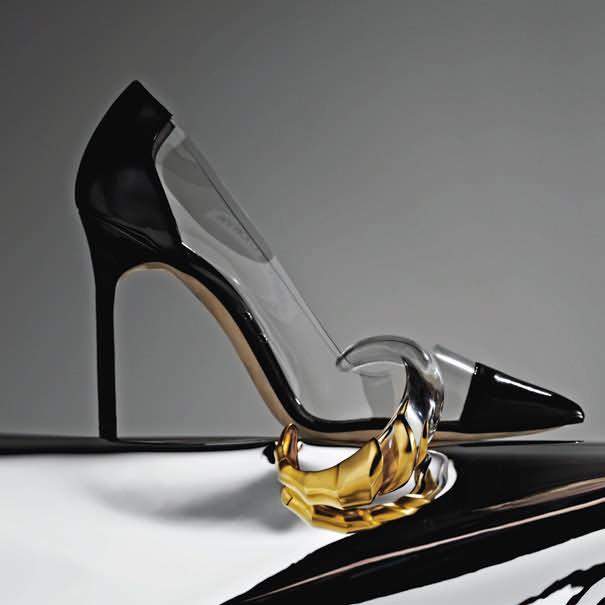





















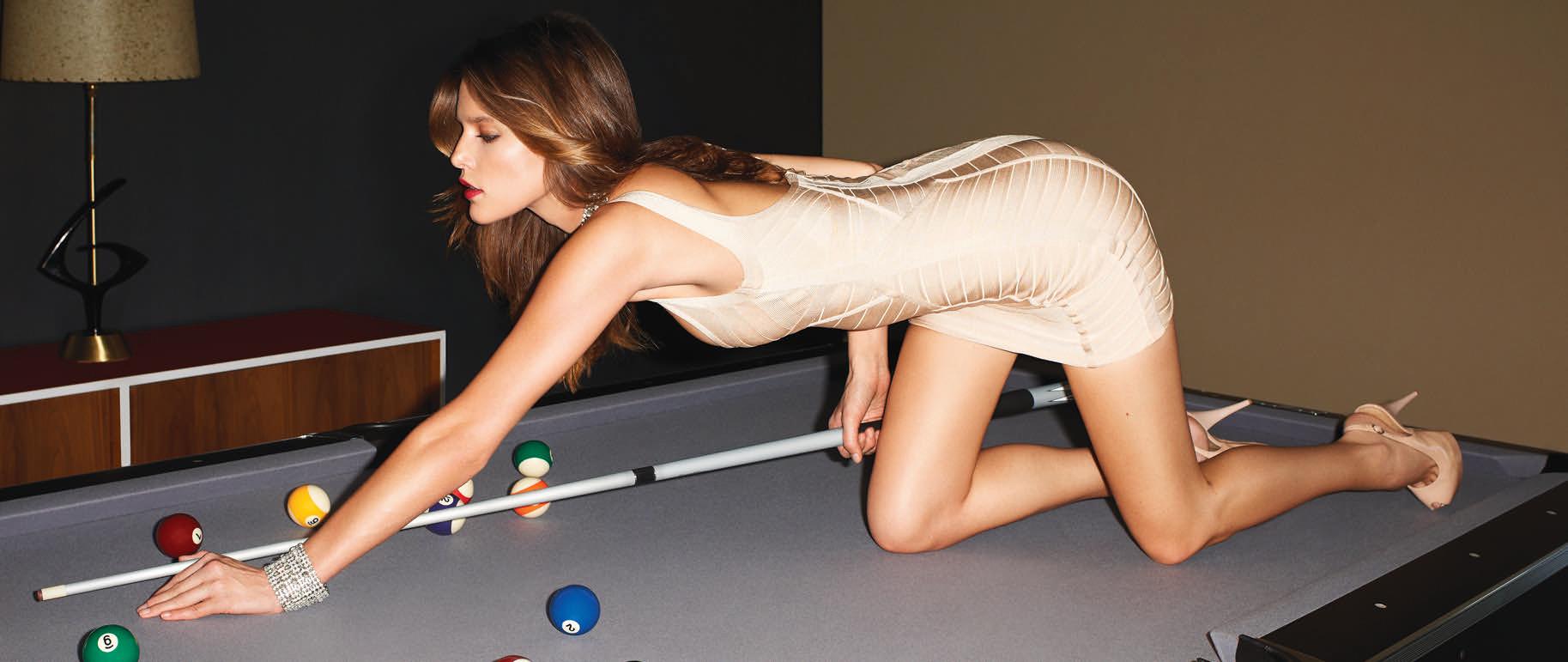






At once glamorous and sporty, C.Z. Guest was a true original. With a new book on her style hitting the shelves, Jeffrey Podolsky pays homage. ‘B
eauty is truth, truth beauty—that is all ye know on earth, and all ye need to know,” wrote the great poet. And in a certain (now long lost) time, an era in which socialites were celebrities unto themselves, Keats’ ode to all things aesthetic was taken very seriously to heart. Today, we hero-worship these so-called swans— Babe Paley, Slim Keith, Gloria Guinness, C.Z. Guest—for the way they unfurled their wings, whether it be for their impeccable plumage or decorous nests. In truth, there was a bit of the ugly duckling lurking

in all of them. But, in many a way, Guest was the exception—the rara avis who would have most delighted in (or, more aptly, roared at) the notion that European nobility once contended that a swan’s neck made for the best toilet paper.
And in Susanna Salk’s C.Z. Guest: American Style Icon , published by Rizzoli in April, the majestic Guest prowls across its pages not for the social lion that she was but for the adventurous soul who embraced the good fortune with which she was blessed—and then ran with it. At full horsepower. Unlike many books of its sort, this effort, with its earthbound intimacy of text and photographs, leaves you with an indistinguishable itch not t o revel in the past but to perhaps take a page out of Guest’s no-nonsense playbook.
She spoke in the genuine Boston Brahman lockjaw of her youth (who else could ring you up and declare “Tallyho! It’s C.Z.!” and get away with it?), but there was nothing precious or lily-livered about her. When she graced the cover of Time in 1962 in a button-front shirt, tie and jodhpurs, the magazine was distinguishing her from the rest of the flock because of her sporting blood. She was sportif. “If others of her ilk were in the drawing room, she was also in the barn and on the tennis courts,” remembers the publicist Paul Wilmot, her longtime friend. Her coltish ways weren’t just t he stuff of legend. The musical satirist and close friend Christopher Mason recalls waking up one morning at Templeton, the Guest property on New York’s Long Island (an English country estate where one was served breakfast in bed and one’s shoes were properly shined overnight) and peering out the window: “There was C.Z., cantering away on her horse. I thought, She really does do all that!”


Of course, she was graced with what her pal Truman Capote memorably termed “just blanc de blanc perfection ” (“It was Grace Kelly who had her looks,” observes good friend and Vanity Fair contributing editor Reinaldo Herrera) and a fierce chic (Mainbocher, mainly) that expressed itself in its simplicity (picture a l ong, gray satin skirt coupled with a cashmere pullover)—as well as an adoring husband, Winston, heir to the Phipps steel fortune, second cousin of Winston Churchill and one of the premier polo players of his day, who could call upon Ernest Hemingway to be his best man. Hemingway no doubt admired the young hoyden who, as Wilmot notes, definitely enjoyed the trappings of international society—but saw the ridiculousness behind it too. “She liked things glamorous—yet she had a feel for the real deal,” he says (prior to marrying Guest, she posed au naturel for Diego Rivera: “That was C.Z.,” opines Herrera). She counted the Duchess of




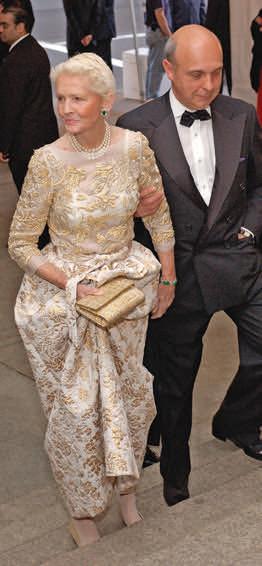






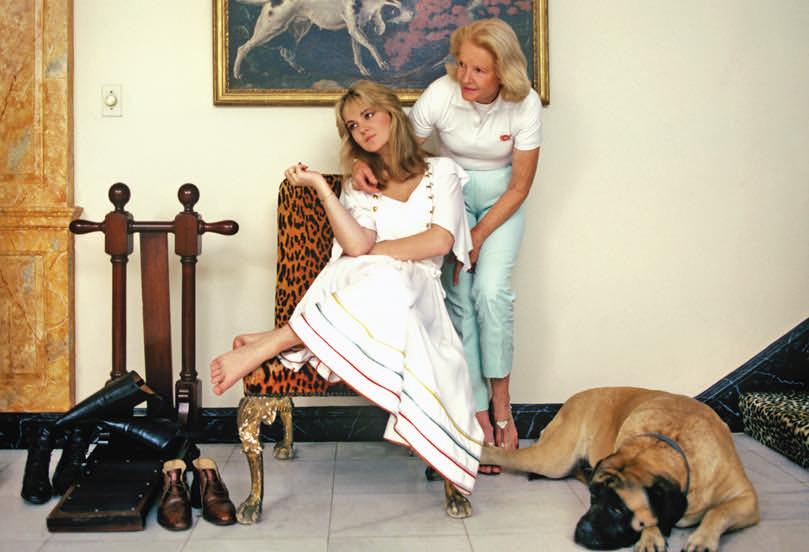
Windsor and the Ayesha of Jaipur as good friends, but she reveled in shocking the stiff swells in crisp linen suits at Saratoga Springs by having a white-hair-wigged Andy Warhol accompany her to the races. She brazened her way into the home of her neighbor Victoria Gotti to marvel at the faux Italianate statuettes, recollects her friend William Ivey Long, the Tony Award–winning costume designer and chair of the American Theatre Wing. “‘Can you believe it?!’” Long remembers her saying. “‘You just have to see it!’”
Norwich, who penned the foreword to C.Z. Guest: American Style Icon “She had a subtle compassion that life is hard.” G uest, for example, understood that the reclusive heiress Doris Duke had few friends and was lonely—but, unlike some, did something about it and had her over for Thanksgiving.


Wilmot, for one, attributes her palpable excitement at the prospect of meeting baseball Hall of Famer Reggie Jackson to her plucky spirit. The rabid Red Sox fan was simply dulled by the dr y-as-dust, purely white bread, frosty WASPs of her youth. It was she, he remembers, who fi rst dragged him, along with Diana Vreeland, from a dinner at River House to the then-nascent Studio 54. Later, C.Z. would write to its impresario, Steve Rubell, when he was in prison for tax evasion and wasn’t necessarily the most popular guy in town. She may have hailed from the Henry Ford II “Never complain, never explain” school, but she was empathetic to the plight of others. “She was no fool about the ups and downs of life—she got it,” says author and editor William
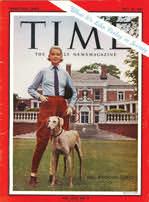
Guest was a woman of mettle. She publicly upbraided the president of the Everglades Club in Palm Beach after he suspended her for bringing along a Jewish guest, Estée Lauder. She famously stood by Capote after Babe & co. became a wedge in flight following publication of the not-too-thinly veiled roman à clef La Côte Basque, in which he exposed their between-the-sheets confidences. Then again, Guest was savvy enough not to have confessed all her intimate secrets to a writer—not to mention, as Herrera notes, “Truman knew she wouldn’t have whined—she would have gone right up to him and given him a black eye.” True, Duke, Lauder and Capote were estimable figures in their own right, but Guest savored a potpourri of people. “What amazed me was the incredible mix you’d see when she entertained,” says Herrera of her famous buffets of delicious comfort food amid the family Sargents, Dalís and signature leopard-spotted upholstery and rugs. “There’d be

an aging hooker at a table with friends from her childhood. You wondered: What the hell are they doing here? Yet it worked.”
When Winston Guest lost a good chunk of his fortune in an eponymous airline that never got off the ground, his “Little C.Z.” went to work a t full gallop, writing a syndicated gardening column for the masses (she didn’t just prune her beloved orchids, paper-white narcissus and peonies; she also raked and hoed), authoring books on gardening (the fi rst of which was illustrated by her dear friend Cecil Beaton) and hawking C.Z.’s Bug Spray. (Other ventures, such as growing heirloom tomatoes with the imprisoned John Gotti and trumpeting elephant manure— she termed it “zoo-doo” and had Siegfried and Roy sample the extremely rich substance—never quite germinated). Rather than navel-gaze, she became more modern as a result of her fi nancial misfortune. And when cancer struck, Wilmot recalls, her gritty refrain was: “Oh, I’m great. I have to go have my little cocktail at Memorial Sloan-Kettering.”


Prior to her death 10 years ago at the age of 83, she’d insisted there be no swan s ong. Toadyish testimonies weren’t her way. Yet it was only fitting that “The Battle Hymn of the Republic” (sung by her masseur, John) was played at the funeral of this forceful, positive spirit who chewed up—or, rather, devoured—life with the same relish as her beloved pack of white Labs, Dalmatians and mutts who leapt into her hearse.





It was the winter of 1975, in Paris. I wandered into the Galerie Proscenium, where there were 30 or 40 pieces on the walls. The simplicity of this piece spoke to me. And the extraordinary resemblance [to Serge Diaghilev]. There’s something light about it; there are very precise lines as well as wit. Cocteau uses a fi rm hand, but it’s almost abstract. I was staying in a hotel when I bought it, so I put it in my room and spent a lot of time looking at it before I went to sleep and in the morning. It was mine—and I was excited and proud.

It’s still very fresh to me. I’ve read so many stories about Diaghilev, the legendary impresario who opened the doors to Russian art at the turn of the last century. He w as one of the most important people in Russian cultural life, period. Without him, Russian art and the avant-garde would have been in a very different place.
This piece was the beginning, and I got hooked; I studied art and developed a larger interest. I never really considered myself a collector. I just bought what caught my eye whenever I had enough money in my pocket.
In the past few years, most of my art has been in storage. Some of it I rotate—this piece has been in a few different homes: in Paris, in the Dominican Republic and in New York. Sooner or later, it will be in the hands of my foundation. I’m not interested in contemporary art, the big, expensive pieces. It’s more a business than anything else—and anyway, I can’t afford it. — As told to
ADAM RATHE










DESIGNER:
PRODUCED BY LISA COHEN
The best-designed rooms look effortless, with everything—from furniture to colors— meshing together seamlessly. These spaces are never the result of any one bold stroke but come from countless touches and tweaks. DuJour asked six top designers to choose their favorite room to furnish and to tell us how to create inviting interiors of our own.
DESIGNERS:
TONY INGRAO & RANDY KEMPER
ROOM: BEDROOM
STYLE MANTRA:
Shown here, Tony Ingrao and Randy Kemper’s New York City bedroom is a mix of mid-century and modern, reflecting their eclectic tastes. Unsurprisingly, they love working with clients who have different styles. “Some bedrooms we design are chaste; others are provocative,” Ingrao says. THEIR BEST
Tone down the lighting. Skip harsh direct lights, and opt for fixtures like swing arm lamps, bedroom favorites of the pair. “Mood lighting can work well here, too,” Ingrao says. “I like it beneath a platform bed.” Invest in a striking headboard. “A strong headboard makes the bed feel welcoming and embracing, and it can serve as the cente rpiece of the room,” says Ingrao. Bedside tables are always a must. “They should be good-looking and large enough to be functional,” Kemper says.
Standout item: A mirrored Lorin Marsh table lamp ($5,025) not only provides gentle light but also reflects it. 212-759-8700


ROOM: LIBRARY





DESIGNER: CELERIE KEMBLE ROOM: KITCHEN
STYLE MANTRA:
“I WANT TO CREATE COMFORTABLE, PERSONAL AND FUNCTIONAL SPACES.”




A kitchen is the center of the home just as much as the den, especially if Celerie Kemble has anything to do with it. Here, she created a special workspace with powder-coated blue desks so that the client's five children can do homework while their parents are cooking.
HER BEST ADVICE:
Be practical. If something isn't easy to clean, Kemble says, it doesn’t belong in the kitchen. Add a conversation piece. The map is more than a design element—the parents use it as a way to talk to their kids about travel and current events. Go conservative with counters. “You can always change up the other elements later,” says Kemble. She used a free-floating stone top on a pedestal table in this space.

Standout item: Paint the cabinet interiors with Rollinson Hues paint in Tranquil ($85 per gallon) to get a refreshing burst of color in a shade similar to these desks. christopherrollinson.com












STYLE MANTRA:
“I’M ALWAYS ON THE PROWL FOR KOOKY, ODD THINGS.”
“The library should be cozier and sexier than other rooms,” says Penny Drue Baird, who feels as comfortable decorating tiny piedsà-terre as she does mansions. Created for a young couple, this room “is jewel box–like, but warm and welcoming,” she explains.
Use colors that make sense with the rest of your home. “As a rule, your public spaces should coordinate,” Baird says. Since the rest of the apartment is white, she amped up this room with gray and lavender.
Think about how often you’ll use the space. If you want the room to be more everyday, go for lighter wood and “friendlier” objects.
Add the unexpected. Baird’s favorite piece in the room is a Christian Liaigre cocktail table (not shown in photo), which can turn into a bar. A unique lamp or rug could also work.
Standout item: This Christian Liaigre Cathare coffee table (price upon request) makes a strong statement and gives ample space for books, accessories and drinks. christian-liaigre.us






STYLE MANTRA: “DESIGNING AN AREA WITH GREAT SYNERGY IS ESSENTIAL.”
Kelly Wearstler focuses on color and texture when she's putting together a home offi ce. “I love working with refi ned and raw minerals in all my designs,” says Wearstler, who also has jewelry and ready-to-wear clothing lines. The decor of this particular room was inspired by the oversized lavender artwork.
Use trays—lots of them. “I use one tray for magazines and incoming mail and another for my sunglasses, camera and other things,” Wearstler says.
Weave in decorative books and objects. Don’t relegate your art and design books to other rooms. Move a few favorites into your office to give it a more personal feel.
Gravitate toward what you love. “Be inspired by the colors in your closet!” Wearstler says. “If you love to wear a certain shade, surround yourself in it in your home.”
Standout item: Corral your office items with a lacquered malachite tray ($795), designed by Wearstler herself. kellywearstler.com

DESIGNER:



Many people regard their living rooms as spaces to be seen and not touched, but Todd Alexander Romano sees his as the heart of his home. “I don’t think it should have anything so precious or off-limits that you and your guests would be inhibited from enjoying yourselves,” he says. This space was a temporary living room while the designer was working on his apartment.
Seating is important. “Look at your living room after you've had guests over and see how they pulled out the furniture,” Romano suggests. Then, arrange couches and chairs in a way that facilitates comfort and conversation.
Give it a “wow” factor. “Every room needs something glamorous, a thing that turns the owner on,” Romano says. Here it's supplied by the glossy blue walls and blue mohair couch. Make peace with multi-purpose. “We all multi-task these days. Our rooms have to keep up with that,” the designer declares. So don’t be afraid to put a desk in the living room or section off an area for your children to play.
Standout item: A gilt-and-brass ottoman ($2,400) does double-duty—as seating and as a visual punch. toddalexanderromano.com


DESIGNER:




STYLE MANTRA:


“I’M ALWAYS STRIVING FOR SOMETHING THAT SURPRISES AND DELIGHTS.”
As the creative director of Oscar de la Renta Home, Miles Redd has been dreaming up new table settings since 2003. “I like dining rooms to have a little bit of fantasy,” he says. He adores combining dining rooms and libraries—“dining with books is cozy”—and he also loves tented dining rooms. For this space, Redd channeled “the New York Public Library’s tables of reading lamps. And the color was inspired by [legendary interior designer] Henri Samuel’s living room in Paris.”
Foundation comes fi rst. “If you get the floor and walls right, the rest is easy,” says Redd. Make over your tablescape. “A new setting can change the feeling of the room,” he says. “It’s like changing the sheets on your bed.” Pay attention to scale. “I think people love dramatic light fixtures, and I’m a fan of them too, in the right setting,” he says. “But you need to have high ceilings. When your fixture is scraping the table, you’re in trouble.” Standout item: Oscar de la Renta Brushstroke dinner plates ($46 each), designed by Redd, can add a painterly quality to your table. oscardelarenta.com


*More @ DuJour.com




Legendary food critic Gael Greene tells why the most exclusive seat in the house may not be the one you think


Ieat out six nights a week, always meeting two or three friends for reviewing dinners. So I can’t quite say when eating at the bar finally crept into my consciousness. Maybe it was in September, when Manhattan’s Le Bernardin, staid and very properly French, installed a lounge and introduced a menu up front along with a shocking “no jacket required” policy. “Even some of our regulars want to eat
etiquette. The Friday-night jam waiting for tables is three deep, hands reaching for drinks between tall leather stools mostly claimed by ba r diners. I look for a spot where coffee and a check seem imminent.
“You better tell the bartender you’re waiting,” a diner-about-to-exit warns me. I catch the bartender’s eye between a margarita and a spritzer. Kenneth, Gotham’s guardian of the 20-seat bar for a decade, could be a Hindu
“EVEN SOME OF OUR REGULARS WANT TO EAT AT THE BAR.”
—ERIC RIPERT, LE BERNARDIN
at the bar,” chef and co-owner Eric Ripert observes. “And not just for a quick snack. Maybe they’re alone. Or they’re in a hurry. We have two women who eat only at the bar now. They order from the regular menu.”
While waiting for a booth to clear at chef Laurent Tourondel’s Arlington Club Steakhouse on the Upper East Side, I was fascinated by the raucous bar scene. Barely visible behind a noisy clot of great-looking guys and savvy millennial couples sipping cocktails and waiting for tables to turn was a pair of svelte dames, spike heels tucked into bar-stool rungs, sharing a steak, oblivious to the clubby din. Surreptitiously scoping out the pickup potential, I imagined.
When, I wondered, did bars—in restaurants high and low, uptown and down, at taverns and neighborhood hangs—become so cluttered with eaters that determined drinkers are forced to guzzle on the perpendicular, blocking the aisle, jostling up against tables? Chef Alfred Portale recalls perfecting black-painted wooden boards to span a break in the bar and make dining easier at the Gotham Bar and Grill almost 20 years ago, when he noticed that nearby Union Square Cafe was making noise with its bar menu.
VIA GETTY IMAGES BLOOMBERGI remember how my cousin Mitch and his wife, Alison, showed up once a week at Lupa, Mario Batali’s instantly popular, no-reservation-required Roman-style trattoria. With hopefuls lined up outside, they perched at the bar. They drank and ate and drank until one day they were perceived as regulars and offered a table.
Tonight I’m solo and anonymous at Gotham, trying to scope out the bar-eating
god with multiple arms, scribbling dinner orders with one hand, tapping the terminal with another, swizzling cocktails with a third. The busboy clears dishes. I hover.
“You can sit down now,” Kenneth says, smiling at me. “This is your home for the evening, my dear.” Just like that, I’m not really alone. I have Kenneth checking in and mydear- ing me. Then there’s chatty Trevor on my right, discoursing on what makes a great negroni. And on my left, a nameless bareating regular grabs my stool when it starts to tip, helps me switch to a sturdier seat and recommends the chicken.
I haven’t been here in a long while. I love Portale’s embellished American cooking. If I gave stars, he’d get four from me. I order the $125 tasting menu and a French Syrah blend, a $10 glass that sells for $16 here. Actually, a very generous pour in a beautiful goblet. I’m assuming the eaters around me couldn’t get a table, maybe decided on dinner at the last minute or saw the house’s raves online and arrived solo too.
Since he went on t he road selling wines and usually dines alone, my Neapolitan friend Francesco has become a connoisseur of bar eating. In Los Angeles he favors Cecconi’s for the “great-looking barmaids” and the comfy chairs (“unlike the torturous stools everywhere else”). “The bar is open and airy, with a view of the room that makes for a convivial vibe. I’ve had luck meeting women there.”
In San Francisco, he prefers the bar at Zuni Café because it’s open till midnight on weekends, “which is late by San Francisco standards.” He’s a fan of the marvelous chicken for two. “So if
I meet another single at the bar, I normally suggest we share the chicken.”
Francesco is a fan of the Spanish chef José Andrés and his tapas at Jaleo in Washington, D.C. “It has great service and a great choice of sherries. I run into other European expats like me who know tapas are best enjoyed at a bar counter.” Craigie on Main is his Boston-area call for excellent bar fare and killer cocktails, “especially since it serves a three-course prix fixe in the dining room.” In Chicago, he likes the Publican: “Great atmosphere at fantastic, tall cocktail tables, beautiful people and really good bar food, oysters to charcuterie.”
My friend Barry Wine—the influential chef of the top-rated Quilted Giraffe till he got bought out by Sony—introduced me to the elegance of lunch at the bar of La Grenouille, with its s ignature explosions of flowers in every corner. “It’s easier to get your second and third drink if you’re eating at the bar,” he observes. “At La Grenouille, Bryan the bartender is already shaking my next Tanqueray cocktail while I still have a few sips left in my glass. No matter how often you go to a restaurant, you rarely get the same waiter [twice]. But Bryan is always there at the bar. He remembers what I ate, what I liked the last time, and he’s discreet about who I was with.”
Barry likes the brie stuffed with black truffles and Friday’s lunch special, pot-au-feu with horseradish cream. “A seat at the bar has a great view of the coming and going. I can say hello or goodbye to people I know.”
As for me exploring the bar scene, maybe I shouldn’t have ordered Gotham’s tasting. But the season for Nantucket Bay scallops is short, and I have a weakness for squab. Alas, it’s taking forever. If I were falling in love with my date or even flirting with a neighbor, I might not mind. Now it’s already 11 and I’m alone. The restaurant is full, but the bar is a desert with no Lawrence of Arabia in sight.
“May I top off your glass, my dear, so you can enjoy the wine with your squab?” Kenneth asks, making a hefty pour, half-filling my glass again. The squab is rare and delicious.
I w arn him I’m fading fast. “Quickly, please, dessert,” I beg. At last: yuzu crème on a sable Breton with yogurt sorbet, matcha tea crumble and two kinds of powder with a veil of pulled sugar. The critic in me finds it too gussied up. But I’m wild about the intense little midnight-chocolate, vanilla and pistachio truffl ish squares that come with the check. Knees stiff, I stagger to the coat check. Guess I’m not the adventuress I thought I was. Next time I eat at the bar, I’ll bring a friend.
I









Lee Brian Schrager scopes out the trend of communal tables at fine restaurants—and lists 11 favorites
flourandwater.com
Inventive pizzas and fresh, delicate pasta are the highlights of this restaurant from chef Thomas McNaughton, two-time James Beard Award finalist for Rising Star Chef.
VENICE, CA
gjelina.com
Small plates such as roasted cauliflower, scallop crudo and mushroom toast take center stage here. Edison bulbs swing above a long communal table surrounded by drafting chairs, and there’s also a quieter patio in the back.
LOS ANGELES, CA

Gluten intolerant, carb conscious or too busy to zigzag the Whole Foods aisles?
There’s a solution for that. New gourmet food-delivery services in Los Angeles are bringing healthy and balanced meals directly to doorsteps—and wooing A-list clients who love the convenience. With a day’s meals ranging from 1,200 to 1,800 calories, “it’s the simplest way to avoid temptation,” says celebrity personal trainer Paul Lubicz. And with some companies expanding nationwide, these customized meals will soon please discriminating diners all over the U.S.—
and happy diners pass fried chicken, greens and biscuits at tables set for 10.
PITTSBURGH, PA
saltpgh.com
After conquering all things meat with Animal, chefs Jon Shook and Vinny Dotolo opened this seafood spot in 2011. Fishing nets and anchors surround diners sharing lobster rolls and octopus salads.
CHICAGO, IL
thepurplepigchicago.com
As promised, this popular restaurant fronted by a quartet of chefs is all about swine, wine and group seating.
SAVANNAH, GA
mrswilkes.com
Here, diners are instructed to “come as you are.” Walk-ins can take a seat at one of the three communal tables on the sleek first floor and watch chef Kevin Sousa in the exposed kitchen.
pecorinos. Beyond the shop, communal tables and benches lend the vineria a rustic ambience.
NEW YORK, NY
momofuku.com
The crowd refuses to be tamed at David Chang’s boisterous East Village outpost, an early entry in his fast-growing Asianfusion empire.

aroadatree.com/twodudes/ soag/reservations
Late owner Sema Wilkes originally ran the kitchen in this space which used to be a boardinghouse. The lodgers left in the ’70s, but the dining room remained

SERVICE AREA: L.A., ships nationwide
BEST DISH: Ricotta-and-mushroom flatbread
CELEBRITY FANS: Mila Kunis, Channing Tatum

PROS: Gluten-, dairy- and soy-free diets, with ingredients sourced from nearby farms
CONS: Customer service isn’t always quick.
PRICE: $46 to $76 a day
SERVICE AREA: Nationwide
BEST DISH: Madras lamb curry
CELEBRITY FANS: Pink, Sofia Vergara
PROS: Stellar gluten-free cuisine and a program geared toward expecting moms, Fresh Mommy
WASHINGTON, D.C.
littleserow.com
An in-the-know crowd gathers by 5:30 at D.C.’s reservation-less hotspot. The weekly menu of northern and northeastern Thai dishes is worth the wrangling and the wait.
NEW YORK, NY
ilbucovineria.com
A spin-off of the datenight destination Il Buco, this laid-back trattoria greets people with an alimentari pantry stocked with in-house cured salumi and cave-aged
CAMBRIDGE, MA PURITAN & COMPANY
puritancambridge.com
This New England destination by chef Will Gilson is heavy on the charm. The long custom tables harken back to a simpler time, even if you are eating lamb belly and Muscovy duck.
BOSTON, MA NEPTUNE OYSTER
neptuneoyster.com
CONS: The Edge program cuts down the snacks, making it tough on those without willpower.
PRICE: $47.95 to $64.95 a day

At this longtime Boston establishment, the wait for a table is agony, but the warm lobster roll on brioche is pure ecstasy. This tiny locale is consistently overrun with fans for good reason.
SERVICE AREA: L.A. and Phoenix
BEST DISHES: Eggplant rollatini, chorizo breakfast burrito, French deviled eggs
CELEBRITY FANS: Kate Beckinsale, Kim Kardashian
PROS: A family-dinner program caters meals for up to five family members.
CONS: Big containers make it hard to pack lunch.
PRICE: $41.95 to $63.95 a day

SERVICE AREA: Nationwide
BEST JUICES: Greens 4, Root 4, Carrot Coconut
CELEBRITY FANS: Mandy Moore, Nicole Richie
PROS: Great for detoxing and none of that messy juicer cleanup
CONS: Nothing to chew!
PRICE: $48 to $70 a day






where Faye Dunaway once stayed,” says owner Leon Avigad. Naturally, the rich chocolates on your pillow are sourced from an Israeli company, Cardinal Choc olate.
Boutique hotels in Tel Aviv are practically an epidemic. The Hotel Montefiore, housed in a 1920s mansion, has just 12 rooms—not to mention the best craft cocktail bar in town. Meanwhile, the Rothschild hotel offers a quiet escape in a city known for its deafening pulse. Says general manager Alon Levy, “We changed everything we got mad about at other hotels.”
Nowhere do the historic and fashion-forward converge more thrillingly than in the Jaffa Flea Market, an old Arab stronghold, where men sell fresh pomegranate juice alongside Turkish coffee stalls. Home Workshop LTD— a well-curated housewares outfit that Anthropologie would be smart to loot from—operates out of a onetime carpenter’s workshop, and the building’s ar chitecture is so old-school that it borders on Old Testament. Explains owner Nava Shamay, “You can still see seashells in the wall.”

Tel Aviv, a modern city on the Mediterranean, has long been a tourist destination—complete with impersonal luxury hotels and overpriced dining. But there’s a revolution afoot, if you know where to look. Hint: Head inland.
Touch down in this fast-changing spot, and what you’ll notice first are the construction crews. This is a city under siege, with cranes dotting the skyline. The story unfolding here daily is a dialogue between the old and the chic. A sleek glass residential, retail and office tower designed by Richard Meier rises on busy Rothschild Boulevard. The old Jaffa Flea Market is now
a next-level browsing experience, with cutting-edge jewelry designers like Ruby Star. At Kitchen Market, chef Yo ssi Shitrit serves poached eggs with a Parmesan and white truffle foam.
Often referred to as the bubble, Tel Aviv is a city almost free of politics, a near Sodom and Gomorrah of cool. Start with the Brown TLV Hotel, the lobby of which could easily be mistaken for the set of Mad Men , featuring 30 rooms with calfskin rugs and 400-thread-count Egyptiancotton linens. But the selling point of this hotel is the rooftop, with its Instagram-ready views of the water. “I wanted it to feel like a motel in L.A.


TTel Aviv is fast becoming a foodie destination. On the streets of Neve Tzedek, old standbys thrive alongside boundary-pushing outfits from chefs like Eyal Shani, whose upscale takeout spot Miznon is a smart rethink of the classic pita joint. Elsewhere, one gets the sense that the Israeli-Palestinian conflict could be at least tempered over lunch at Haj Kahil, an upscale Arabic restaurant in Jaffa where portobello mushrooms are soaked in olive oil for two days and then grilled, and the stuffed lamb—rubbed with unprocessed paprika, allspice and cardamom seeds—cooks for about nine hours.
“We want the residents of Tel Aviv to be acquainted with gourmet Arab cuisine,” says chef Omar Iluwan.

There’s perhaps no greater symbol of Tel Aviv’s past talking (loudly) to its present than a pop-up store featuring wares from two up-and-coming fashion labels, Adam Gefen and the Muslin Brothers. Says Yaen Levi, of the Muslin Brothers collective, “This young city seems to have no rules or borders, and the limits are abstract. Everything is possible—and happening in front of your face.” Viva Tel Aviv.
alk about surprises. The Efendi Hotel is situated on an unmarked side street in the Old City of Akko—a 90-minute train ride from Tel Aviv—basically the last place you’d expect to stumble upon a five-star hotel and spa with more marble than most churches. And better wine, too. Noted chef Uri Jeremias is behind the renovation of two 19th-century brokedown palaces, reborn as a sleek Zen escape with a 400-yearold Turkish bath and a roof deck boasting views all the way to Lebanon. With 12 guest rooms (starting at $320 a night), the hotel offers personal, detail-oriented service and chic furnishings, from the Recor clawfoot soaking tubs to the 180-year-old tufted leather chairs Jeremias rescued from a library in Denmark. And then there are the deep-tissue massages (370 shekels—about $100—a session) and the 2,000-bottle wine cellar featuring tasty chenin blanc from Israeli winery Kerem Shvo. All this makes Akko, previously a day trip for Indiana Jones types interested in historic ruins, a worthy overnight destination. The Efendi’s cool marble and ornate, hand-painted ceilings prompt the question: What’s the cost of refurbishing an Ottoman-era stronghold? Jeremias remains mum, though he admits his planned fiveyear renovation stretched to more than eight years. “I told people I always knew exactly when we would open,” he says with a smile. “One day after we fi nish.”— M.R www.efendi-hotel.com


this time, you don’t have to choose between speed and safety. netjets ® can get you there faster. no lines. no delays. no hassles. But most importantly, we ofer the highest safety standards in the industry. We have the most stringent maintenance and operational procedures. our pilots are the most highly trained. Add the world’s largest private jet fleet and the unmatched resources of Berkshire Hathaway, and why would you choose anyone else?









Natasha Wolff descends on Dubai to learn the tennis star’s style secrets, his hobbies and how he spends his time off. PHOTOGRAPHED BY PATRICK DEMARCHELIER
On the court, Roger Federer is famously precise, powerful, determined, tough and dominant. He’s also quite stylish. Even his very occasional bursts of hot-shot flair—look up “Federer between-the-legs winner” on YouTube—seem to be a result of practice and ruthless efficiency.
Off the court, Federer’s not much different.
At 31, he remains the number two–ranked player in the world (and could easily find himself back atop the ATP rankings sometime this year). He is almost certainly the best tennis player of all time (it’s hard to imagine his record of 17 Grand Slam titles will be broken any time soon) and—along with Tiger Woods, Michael Phelps and maybe LeBron James—one of the most successful athletes of the 21st century so far.
Suffice it to say, his achievements afford him a comfortable life off the court, one in which everything—including his preferred method of travel, flying private—allows Federer to concentrate on his game.
Living in the Middle East, it turns out, offers similar perks.
“In Dubai, I can really focus and put my head down and work extremely hard,” Federer says. “And then the next minute, I feel as though I’m on vacation. It’s very strange, actually. I don’t feel that way when I’m in Switzerland, because that’s home.”
In addition to its beaches and trendy restaurants—which he enjoys with his wife of four years, Mirka, a former tennis player, and twin daughters, Myla an d Charlene—Dubai offers one other important advantage: relentless heat. Federer routinely flies in younger players whose playing styles match his rivals. They practice all over town, accompanied by his trainer, Pierre Paganini.

“THE HEAT WAS A GOOD THING FOR ME, A SWISS GUY, TO GET USED TO.”
“The heat was a good thing for me, a Swiss guy, to get used to,” Federer says. “I struggled with the heat early on—the humidity. Then I bit the bullet and did three years in a row in the summertime, playing in 45 degrees [Celsius, about 113 degrees Fahrenheit] every day for two weeks, and I got strong.”
Of course, his strength extends beyond delivering killer 130 mph serves. His appealing image—in conversation, he’s very confident, gentle, well-spoken—combined with his controversy-free life and unprecedented success, has helped generate an estimated $45 million a year in endorsement deals with blue-chip brands. When he’s not competing, he’s going the extra mile with his charitable pursuits. His R oger Federer Foundation works with local NGOs in South Africa, Malawi and Botswana—as well as in Switzerland—to support children’s early-learning and education initiatives. “I truly believe philanthropy has to be from the heart,” he says.
Most recently, he has added Moët & Chandon to his endorsement portfolio. The French bubbly brand has been at the finish line of sailing and racing events for nearly a century, and as a global sponsor of the ATP World Tour, it’s a perfect fit for Federer. “I couldn’t have done this 10 years ago,” he says. “I would have felt too young, not authentic. But I went to Épernay, to see the Moët & Chandon wineries, and it was mind-blowing to see the winemakers an d their effort. The passion for details that they have—
I feel very connected to that.”
Fashion is something else Federer has discovered an unex pected connection to. Indeed, his sartorial choices on court have become progressively edgier over the years. Early on, his natty tournament attire—the neatly pressed whites, the custom Nike cardigans, the interlocking RF logo—distinguished him from some of his less turnedout peers. But it was in September 2006 that he launched into an even more rarefied stratosphere when Vogue editor Anna Wintour brought him along to Marc Jacobs’ spring runway show. Since then, Wintour has remained a sort of style adviser to Federer.
“I’m happy to try out new th ings,” he says. “I started out with a lot of Prada, Dolce & Gabbana, Louis Vuitton. But as I go along, I try out different, less-known designers as well.”
The pair’s friendship extends beyond his wardrobe. Last summer, to celebrate his 31st birthday and his Wimbledon win, Wintour hosted a soiree for him at New York City’s Beatrice Inn. “She likes taking care of me. She told me to invite whoever I want, from fashion to art, athletes to actors. We had a small group. I couldn’t be more thankful for her love of my family.”
Another thing they have in common? Tennis. “[Anna] has played every morning for 30 years,” Federer says. “She loves tennis. We crossed paths early on, and I didn’t know who she was, to be honest, but we stayed in touch.”
As for what’s next for him off court, he’s building a ski chalet and expanding his art collection with his wife. “It’s a great balance for me to think outside the box to do something else [along with] tennis,” he says of the latter. “Where I live right now, we don’t have much space for art anyway, so I’m in the learning process. Ask me again in five years.” Roger that.



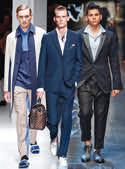








For Kingston-born art-world star Nicola Vassell, there’s no place like home. Alyssa Giacobbe explores like a local. PHOTOGRAPHED BY KAVA GORNA






Nicola Vassell left Jamaica in 1996, but Jamaica never really left her. “You can’t truly cut the cord that connects you to a place like Jamaica,” says Vassell, a model-turned-gallerist. As a high schooler in Kingston, she’d been “discovered” by a model scout during a trip to the movies; by the time she graduated, staying home to pursue a career as a writer or an engineer, the original plan, was no longer an option. “I had another path,” she says, which included a contract with CoverGirl, runway shows for Calvin Klein and others and appearances in dozens of major fashion magazines. Still, she explains, “Jamaicans are very nationalistic. The roots are very, very deep. I understood that only later in my life.”
Va ssell left modeling in 2005 for the art world, in another case of fortunate timing. While studying art history and business at NYU, she met downtown gallerist Jeffrey Deitch, who offered her an internship. At Deitch Projects, she quickly climbed the ranks, working closely with such artists as Kehinde Wiley and Francesco Clemente and becoming known around town for the salon-like gatherings she held in her SoHo loft. When Deitch Projects closed in 2010, she went to work as a director at the decidedly more uptown Pace Gallery, leaving last year to pursue her own projects, including privately dealing art. She’s currently developing an “ideas lab” that will curate and produce exhibitions and special projects and encourage social responsibility within commercial art.

But while her work keeps her traveling around the world—she spent a considerable amount of time in Vienna last year—she goes home to Jamaica as often as she can. During the Christmas holiday, it was for three weeks. Sometimes it’s just for a weekend. Often, she’ll take friends. Every time, she says, she discovers something new. “It’s like anything in life,” she says. “You go around the world searching for the mountaintop and you realize that it was here all along.”
The island—the Caribbean’s fourth largest—has, of course, been a vacation favorite for decades, an erstwhile destination for a glamorous Hollywood crowd that included Ian Fleming, Elizabeth Taylor and Richard Burton, who valued its seclusion and shot a film on location there. Bob Marley a lso had a little something to do with Jamaica’s recognition, and more recently Usain Bolt, the world’s fastest man, helped remind travelers of the country’s cultural riches. But much of the credit also goes to hoteliers like Jon Baker and Chris Blackwell, whose properties blend luxury getaways with Jamaican culture and topography, rather than provide gated, all-inclusive communities that focus on little more than beach and booze. At Blackwell’s newly renovated Strawberry Hill resort, for example, set



deep in the Blue Mountains (where all the photographs seen here were taken), daily hikes offer a glimpse into organic coffee farming and dozens of species of local birds. Expansive views of Kingston are available at 12 Georgian-style cottages, including the one that housed Marley as he nursed gunshot wounds in 1976. It’s not stereotyping to say that Jamaicans love their reggae; indeed, it is about the only musical sound heard on the island.

Vassell’s own beloved destinations range from the serene to the extreme. To “marvel at the intense lushness of my island,” she explores the plants and rivers of Castleton Botanical Gardens, situated in the hills of St. Mary Parish. YS Falls in St. Elizabeth is another “great natural wonder,” with frothy, multitiered falls and underground springs. As an art professional, she loves the museums and libraries of the Institute of Jamaica, the chief archive of the island’s ethnographical, artistic, scientific and cultural history, whose permanent collection includes works by Jamaican artists like Mallica “Kapo” Reynolds and Edna Manley. And there are, of course, the beaches. Vassell’s favorites are the simple, uninterrupted stretch of Negril’s Seven Mile Beach, James Bond Beach in Oracabessa and Frenchman’s Cove in Port Antonio, where, she says, “a freshwater river meets the sea.” When she’s seeking adventure, she fi nds it while cliff jumping at the Rockhouse Hotel in Negril. “I dare admit that Negril is my favorite place in Jamaica,” she says. “And Rockhouse is where I leave my inhibitions on cliff’s edge,” something that’s es pecially welcome after a long day of lazing about.

In fact, Vassell points to the Jamaican extremes as the most interesting aspect of her home country. “There are many things about Jamaica that endlessly intrigue me,” she says. “but mostly it’s the fact that you have one extreme and then another, then another, and another. People sort of move in between these extremes, with very little road running to the middle ground. But what unites us is our shared sense of appreciation for a simple existence. There’s a very distinct sense, in a place like Jamaica, that you don’t have to have everything to inherit the riches of the earth.”









*More @ DuJour.com
INTIMATE SHIPS WITH JUST 104 OR 225 SUITES
• TIPPING IS NEITHER EXPECTED NOR REQUIRED
• SPACIOUS ALL-SUITE ACCOMMODATIONS
•
AWARD-WINNING GOURMET DINING
• COMPLIMENTARY CHAMPAGNE AND IN-SUITE BAR
•
COMPLIMENTARY OPEN BARS AND FINE WINES


WHERE:
WHO:

AGE: 3
WEIGHT: 10 LBS
OWNERS: BARBARA BUSH AND MIKY FÁBREGA
FAVORITE HOBBIES: NAPPING, BIRDING

“I SPEND LOTS OF TIME ENTERTAINING, PERFECTING MY BACKFLIPS.”

Iwas where I pretty much always was on Monday mornings: in the flower pot outside an ad agency in downtown Panama City, pretending I was a feline Anne Geddes photograph, waiting to be discovered. Don’t get me wrong: Things weren’t awful. I love Panama. It’s like one giant sunbeam. Plus, los ejecutivos would often bring me snacks, and I’d mew politely and let them call me Lady Gata. Copywriters are so clever.
When Miky walked by, I knew my life was about to change. I’m usually quite shy with strangers, but I’ve always been drawn to artists, and it turns out he is quite a well-known one, both in Panama and in the U.S. The next day, he w as back, with milk and plans of a new life. Soon after, I met Miky’s longtime girlfriend (and, I would learn, former First Daughter) Barbara, and instantly I knew why he wanted to bring us together. We’re both lovable, stylish and classically good-looking. Miky and Barbara named me Eleanor Ferdinand Furicita FábregaBush, because if anyone loves multiple names more than American political dynasties, it’s Latinos. Most everyone just calls me Wewie.


Ah, yes: mi casa! I live primarily in New York, though I retain dual citizenship and get back to Pa nama to visit my sister, Lola, whom I’m obsessed with, even though she’s a total dog. During one trip, I was detained for improper documentation. It didn’t even help to tell them my grandfather was once el presidente ; believe me, I tried. “Not only do immigrants help build our economy,” I told them, “they also invigorate our soul.” Pero, no. Maybe some day.
But I’m not just some pampered lap cat. Sure, I spend lots of time entertaining, perfecting my backflips, and acting as muse to the professional and recreational artists in my life. And, of course, I nap. Sometimes I dream of lounging in the Oval Office. Naps are muy imp ortante because otherwise I won’t make it through Downton Abbey For a while, I would answer only to Lavinia Cat, my favorite character. (Those bangs! That tragic demise!) But I’m also quite serious. I work with Mami on her nonprofit, Global Health Corps, and have plans to start my own, Kisses for Babies. Babies and I have a lot in common, and it’s not just that we look great in flower pots. More than anything, we like to be loved. That’s one reason I don’t date. I don’t need to. I get plenty of love at home.










Shoe fiends are embracing nips and tucks. Alyssa Giacobbe uncovers the next wave of aesthetic surgery.
IF THE SHOE DOESN’T FIT, WELL, THERE’S A FIX FOR THAT. AND IT HAS NOTHING TO DO
On any given day, the new 22,000-square-foot shoe salon at Barneys New York’s Madison Avenue flagship boasts thousands of pairs on offer, many of them more extreme than the next: strappy Tabitha Simmons sandals, towering Sergio Rossi stiletto booties, crystal-encrusted Christian Louboutin pumps that sell for $4,000 and make their wearer four and a half inches taller. But with each new height we’re willing to scale for great shoes, we’re also expecting far more from our feet. After all, what’s the point of splurging on a pair of meticulously crafted shoes if they draw attention to feet that are a big old mess?
With the high-end shoe industry growing at a rapid clip—women spend an e stimated $20 billion a year on shoes—the field of foot aesthetics is booming. Cosmetic dermatologists and plastic surgeons are offering treatments that include foot narrowing, fat augmentation (for “comfort” padding) and the “pinky tuck,” to fix what happens when the last toe gets jammed into those extra-narrow Charlotte Olympias. For women who come in complaining of feet unsuitable—too wide, too long, just too ugly—for their snakeskin Brian Atwoods, toes can be shortened, lengthened, straightened or slimmed. Nonsurgical procedures include Botox to reduce sweat (and, therefore, blisters), injectables like Restylane and Radiesse to make walking easier and laser therapy for uneven pigmentation and spider veins.
“Women are wearing the highest shoes they’ve ever worn, f ive- and sixinch stilettos and platforms,” says cosmetic dermatologist Dr. Howard Sobel. “And this puts pressure on certain areas of the body to look good, like the feet,
the ankles and the calves.” If the shoe doesn’t fit, well, there’s a fix for that. And it has nothing to do with wearing sensible flats.
In his Manhattan skin clinic and spa, Dr. Sobel offers services like acid peels and microdermabrasion that treat the foot in the same manner as the face, as well as laser treatments to get rid of discoloration and scars. After successful treatment with temporary filler, he’ll inject silicone for permanently padded feet. The dermatologist also reports a rise in the number of women seeking aesthetic work—liposuction, sculpting and skin resurfacing—on ankles and calves.
“High heels means we’re spending far more time looking at women’s calves,” Dr. Sobel says. “It used to be that people came in for lipo on their hips and thighs. Now it’s hips, thighs, calves and ankles.” That might mean giving an ankle a little more curve, reshaping the leg or eliminating cankles.
“I see many women who are very thin, totally straight,” he observes, “but they put on a pair of nice heels and their leg looks like a bat.” He performs operations with local anesthetic so that patients can stand up at the end of the procedure and get an idea of what t heir legs look like.
Of course, these treatments aren’t always preemptive. Sometimes they’re necessary fi xes for damage from particularly harsh heels. Anyone who’s spent $1,400 on a pair of stilettos that require six months to break in knows that price doesn’t always correlate to comfort; in fact, it can be quite the opposite. “Some women can wear very high, very strappy shoes and have no problem at all,” says foot surgeon Dr. Ali Sadrieh of Evo Advanced Foot Surgery in Studio City, California, whose practice offers aes-
thetic toe shortening and lengthening, fat augmentation on the balls of the feet and the popular “Cinderella procedure,” a preventive bunion surgery that makes feet narrower. “But for many women, spending up to 10 h ours a day in a pair of four- or five-inch heels can mangle and deform otherwise healthy feet.”
Alexandra Lentine is a convert to taking these sorts of measures. The 25-year-old was on her feet all day; by the time she was ready to go out for the evening, she could barely slip on a pair of heels—never mind go dancing in them. Philadelphia-area plastic surgeon Dr. Steven Davis injected Restylane into the balls of her feet for extra padding. “There is literally no pain anymore,” she says. “I’ve gone a little nuts in the shoe department since.” Now, she’s considering fat augmentation as a permanent solution.
But foot beautification doesn’t come without risks. “Cosmetic surgery for so me things, like shortening a long second toe, has the potential for serious complications,” says Dr. Michael Nirenberg, a podiatric physician and surgeon in Crown Point, Indiana, who has consulted with aesthetic patients as young as 14. “For that reason, I am very selective. If a procedure is strictly cosmetic and has the potential for serious complications, I will not do it.”
The American Podiatric Medical Association also encourages surgeries be performed solely for medical reasons.
The debate might not matter. “The foot has been part of our sexuality for 3,000 years, and women are going to wear the shoes they want to wear,” says Dr. Sadrieh, who argues that pretty, well-kept feet are signifiers of success. “And as long as they’re wearing them, there will be a need for the feet in them to look their best.”




From CC cream and bold lip colors to the latest designer fragrance, these items are the new must-buys at the beauty counter
PHOTOGRAPHED BY CHRISTINE BLACKBURNE









Guilty Black pour homme eau de toilette, $80, GUCCI, sephora.com.
Eau Légère eau de toilette, $115, BOTTEGA VENETA , neimanmarcus.com

L’Eau Rose, $115, BALENCIAGA , balenciaga.com
PHOTOGRAPHED

Eau de parfum, $155, MARNI, saksfifthavenue.com

Jour d’Hermès eau de parfum, $149, HERMÈS, usa.hermes.com
Acqua Essenziale pour homme, $80, SALVATORE FERRAGAMO, nordstrom.com


Manifesto,





Light as air and packing a powerful punch, mousse is whipping up a comeback. Marisa Fox contextualizes.

After a long winter of tamping down your hair under oppressive (but undoubtedly warm) hats every time you set foot outdoors, it’s time to rejuvenate. Here’s what you need to know about the coming months. They’re about one thing: volume. “Hair is now being swept up, punked and pompadoured,” David Wolfe, trend forecaster with The Doneger Group in New York, says. “We’ve gone from the victimized waif to the 1980s power looks that speak to a growth in confidence.”
To get the look just right, forget the Johnnycome-lately gels and sprays you’ve become accustomed to running through your hair. Keeping it current is going to require revisiting a product you might have all but forgotten, that foamy grooming go op of yesteryear: mousse.
“Mousse used to be about stick-straight bangs and high hair,” Antonio Corral Calero, artistic director for Moroccanoil, says. “Now it’s about body without crunchiness. You can get tons of volume, but your hair will be soft, shiny and manageable.” To wit, he recently sent models down the runways with tresses that looked like you could actually run your fingers through them.
At Alexandre Herchcovitch’s spring/summer show, Calero fashioned what he terms a “broken wave,” hair that was parted down the center and worn loose with only a subtle curve midway down.

It was the perfect counterpoint to the Culture Club hits playing to a catwalk full of bright, boldly patterned jumpsuits, boxy Ts and shirtdresses. Even whe n Calero went for the theatrical—rockabilly French twists at Catherine Malandrino and wispy, swooshy, undone buns adorned with flower petals at Badgley Mischka—he kept strands looking silky and smooth. “We want it to be wearable, not costumey or gimmicky,” he explains. “People want hair that looks healthy, luxurious and fresh.”
There’s an explanation for the product’s more natural look. Chalk it up to mousse’s new formulation. “It’s now whipped, so it’s as light as air,” Calero says. “You can apply it directly onto the hair and pat it down, and it penetrates evenly.”
The Moroccanoil volumizing mousse contains Argan oil, which conditions and prevents frizz as it lifts and plumps. It can revive day-old blowouts, absorb oil from bangs and a t the crown and restore waves and bounce. Tight curls can also be tamed, thankfully offsetting another 1980s hair trend: the pyramid effect.
Whatever your hair’s texture, the magic froth may be just the thing to whip your hair out of your face and mold it into a new, modern style. So, when you’re reaching for that can of mousse, keep in mind the immortal words of one icon with a most impressive ’do, Pat Benatar: “Hit me with your best shot.”

Dear Violet:
I love the chignons that came down the spring 2013 runways—some were wispy, some sleek. But no matter which version I attempt, I end up looking more “Little House on the Prairie” than off-duty ballerina. Appearing “effortlessly chic” has become a colossal endeavor. Please advise.
Sincerely,
Chignon CoveterDear Coveter, Don’t be deceived: No worthwhile look is ever completely effortless. Even Brigitte Bardot’s sensually tousled mane required a superior stylist (or at least a few well-spent hours in the bedroom). For an elegant, smooth knot, begin with hair that has been blow-dried straight and parted in the middle. Create a firm ponytail at the nape of the neck and lightly mist with hairspray. Once you’ve built your base, you can style the chignon in a number of sophisticated ways: Wrap it in one direction for a classic ballet bun, split it in half for a double knot or leave the ends out for a devil-may-care version. Or eschew the hair dryer altogether and simply spritz the locks—Oribe Après Beach Wave and Shine Spray is sexiness incarnate. Pull out a few romantic wisps around your temples before wrapping the bun, and off you go.
Team Violet















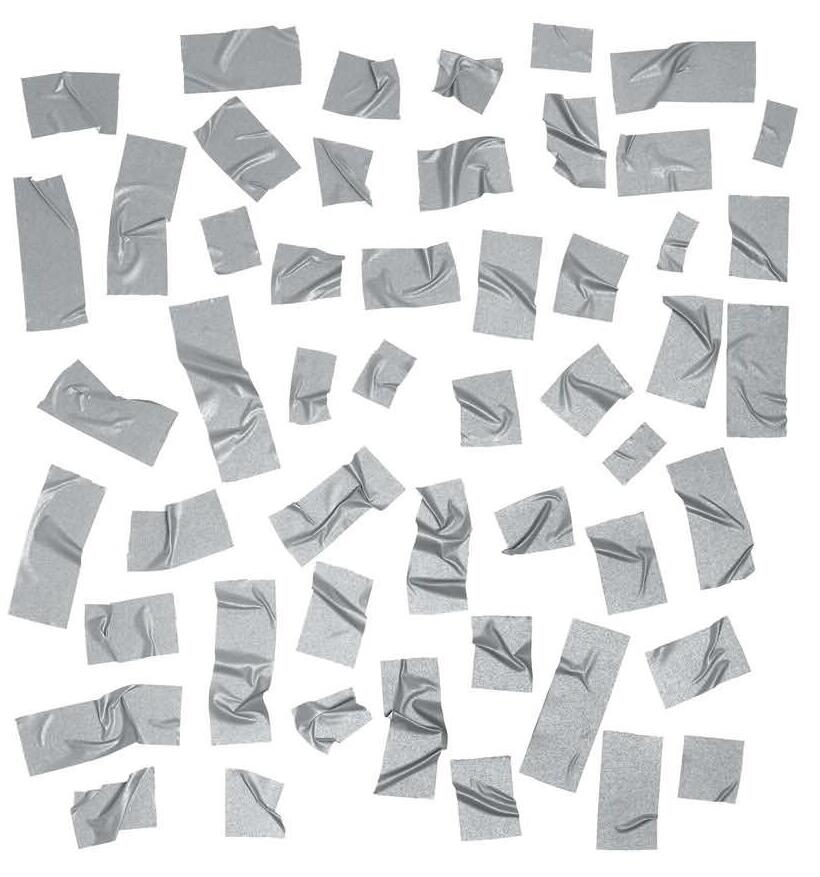















Art directed by James Boehmer. Embroidered bolero, $3,998 , RALPH LAUREN COLLECTION , ralphlauren.
com On skin: Illuminating Primer, $70, TOM FORD BEAUTY, bergdorfgoodman.
com Light-reflecting setting powder, $34, and Puerto Vallarta multiple, $39, NARS , narscosmetics.com




Beauty inspiration can be found in an Old Master’s 15th-century portrait. Alice Pfeiffer shines a light.
PHOTOGRAPHED BY TONY KIM
When Flemish painter Petrus Christus completed his Portrait of a Young Girl in 1470, he’d created a new sort of tribute to beauty and wealth—one in which the subject’s hair is pulled back, highlighting her luminous skin and defined features. She wears jewelry and dress that seem restrained but, on closer look, are of rare and sumptuous quality; it was Christus and his contemporaries, Hans Memling, Robert Campin and Rogier van der Weyden, who first coupled bare elegance and contained sensuality. In Renaissance times, the privileged favored such luxurious delicacy and in portraits we see symmetrical features and pale skin illuminating this pared-down perfection. Today the art world is seeing a renewed interest in classical painting and sketching, from the recent Leonardo da Vinci show at Paris’ Louvre Museum to the Frieze Masters art fair. “We look for qualities that will stand the test of time,” Andrew Renton, director of Marlborough Contemporary, says. Beauty, too, is returning to a classic stance, with heightened appreciation for contouring techniques. “The Dutch Masters understood how to use light, giving their paintings a three-dimensional quality,” James Boehmer, director of global artisty for NARS Cosmetics, says. “These same principles are fundamentals to makeup. Contrast in shadow and light, as well as texture, like a matte versus luminous finish, will give a multi-dimensional quality to the skin.”




. On eyes:
Rustic Tear coat, $547, OSKLEN , osklen.com Golden South Sea pearl-and-diamond earrings in 18-karat yellow gold, $3,400, ASSAEL , 212-819-0060
Color Design Infinite Eye Shadow in Persistent Peach, $25, LANCÔME , lancome-usa.
com On skin: Blush Radiance in No.5, $45, YVES SAINT LAURENT BEAUTÈ , yslbeautyus.com


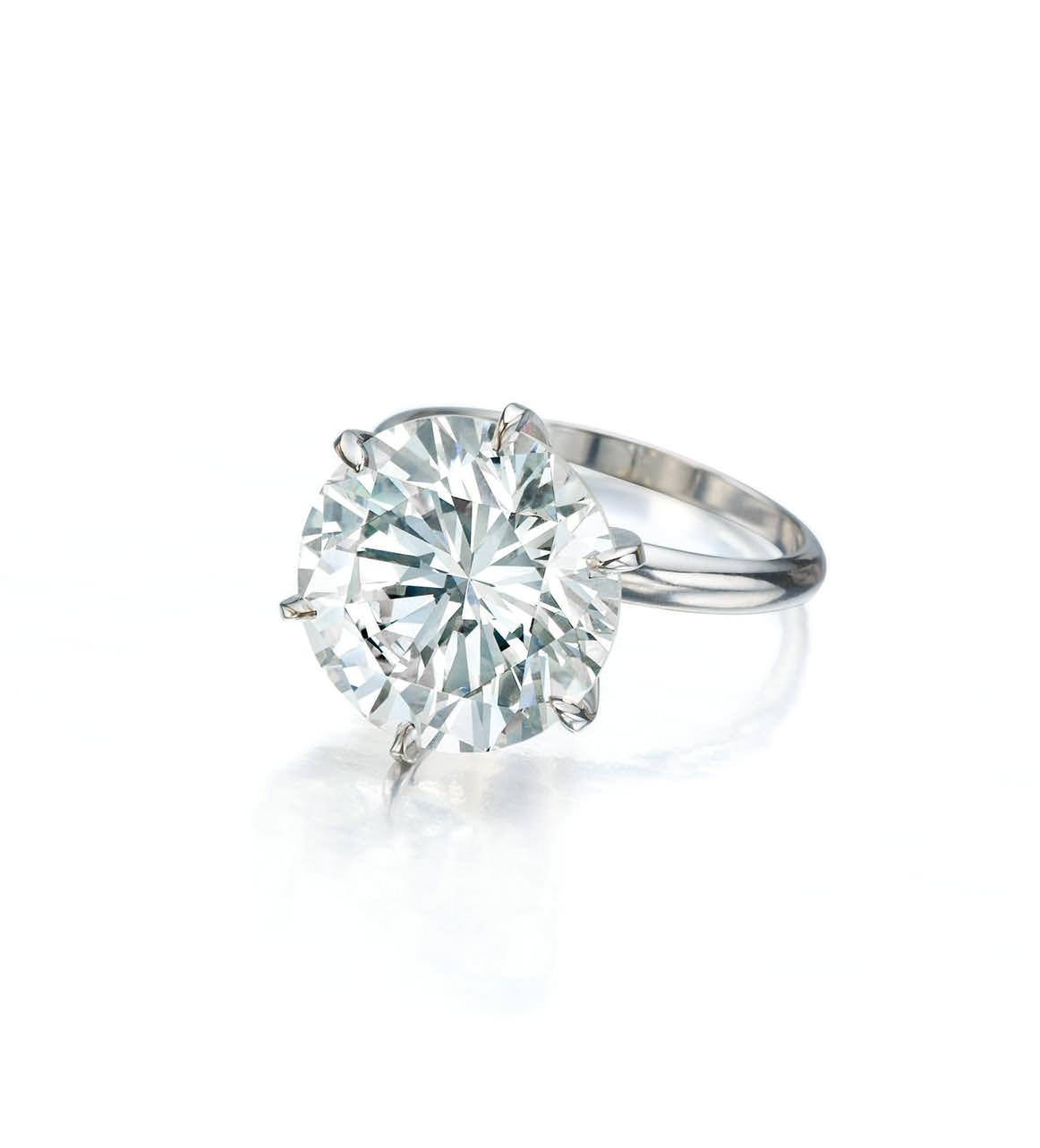









Sell the fine jewelry, diamonds and watches you no longer wear to CIRCA. Whether selling a one-carat diamond or an entire estate, CIRCA provides trusted expertise, the best value and immediate payment for your items.





Recently, a 35-year-old entertainment exec went to see Dr. Babak Azizzadeh, a Beverly Hills facial plastic and reconstructive surgeon. He was there for one specific reason—and no, it wasn’t to look younger or more attractive. “Everyone thinks I look angry in meetings,” he said. “I don’t want to look angry.” What gave that impression: the vertical grooves in the center of his forehead—known as the 11s—which Dr. Azizzadeh attacked with Botox.
The number of male patients getting Botox has been hitting new highs in recent years—363,018 men in 2011, according to the latest figures—making it the most popular minimally invasive cosmetic procedure among men. As their numbers boom, what intrigues physicians is why this group is coming in. Women, still the vast majority of users, almost always rely on the toxin to knock a decade or two from their age. But guys are OK with showing their years—for instance, they leave their crows’ feet untouched. “Men with wrinkles there command more respect,” says Dr. Adam Kolker, a New York City plastic surgeon. So what are their priorities? “They don’t want to look angry, sad or tired,” Azizzadeh reports. And with the volatile economy and tight job market, high-achieving men are experiencing these feelings more than ever.


Dr. David E. Bank, a cosmetic dermatologist in Mount Kisco, New York, divides his male Botox patients into three groups. The youngest ones have grown up with procedures and see them as just a form of maintenance. Of the other two segments, he says, “there are the men who’ve achieved a level of success but who want to seem as energized as the guys nipping at their heels. And then there are the attorneys and bankers handling big deals and lawsuits. They want a look of calm so that at the negotiating table, they appear as if they can walk away at any moment.”
Men are jumping on the cosmetic-surgery bandwagon faster than ever. Kayleen Schaefer fills us in.

“THE THREE THINGS MEN WANT TO AVOID? LOOKING ANGRY, SAD OR TIRED.”
The main downside of Botox, of course, is its lack of staying power—it wears off after a few months. So physicians are also deploying fillers—the results can last up to a year—as a revitalizer. In men, one increasingly popular area for treatment is the tear trough. An injectible there can make dark circles and eye bags vanish, yet the effect is subtle. “After my male patients get it, their friends tell them they look great but they can’t figure out what’s changed,” Dr. Bank attests. Cheeks are another spot where a little filler can make a big difference. As we age, we lose volume in our cheeks—in men, this comes across as haggard and exhausted. Adding Restylane or Juvederm to the apples is a quick fix. Fillers do have one drawback; the injections can leave some bruising and swelling. Knowing this, Dr. Bank and others schedule the procedures for men on Friday afternoons. “By opening bell on Monday,” he says, “the marks are gone.”







David Beckham. A global icon who insists on perfection. Precision and style. A legend forged by accomplishments. On his wrist is the Breitling Transocean Chronograph Unitime, the ultimate traveler’s watch. Manufacture Breitling Caliber B05, officially chronometer-certified by the COSC, endorsed by a 5-year Breitling warranty. High-performance selfwinding chronograph. Universal time function enabling permanent readings of the time in all 24 timezones thanks to a patented mechanism and an ultra-user-friendly crown-operated correction system. Comfort and elegance for first-class travelers. Signed Breitling.




You’ll find the most current and complete set of the finest real estate listings in just one place: AskElliman.com. Winner of 9 industry awards, our website invites you inside thousands of available homes throughout New York City, Long Island, The Hamptons/North Fork, Westchester, and South Florida. An unparalleled force in the industry, Douglas Elliman now reaches even further, allowing you to shop any of these markets from one incredibly versatile website. Leverage the power behind the most powerful name in real estate today.

Today, many men are trading traditional pursuits for an amped-up role in the kitchen.
Tyler Thoreson chews it over.
PHOTOGRAPHED BY H E n RY H ARGREA v ES
Peter Durette is a senior executive at a multibillion-dollar company in Richmond, Virginia. On the cusp of 40, he’s got a smart, stylish wife, two kids and a gorgeous brick house in a tony suburb, with a pool and two German automobiles in the garage. He’s also a hell of a lot better with a chef’s knife than he is with a five-iron. A generation ago, a guy in Durette’s situation might have limited his kitchen time to the seconds it took to saunter from the sofa to the fridge for another Heineken. But these days, more men are finding refuge from the demands of work and family not on the links or in a power-toolstrewn workshop, but in the kitchen.
“W henever I go over to friends’ houses for dinner, at least half the time a man is doing the cooking,” Adam Rapoport, the editor in chief of Bon Appétit, says. Today, he notes, “It’s OK to cook and be a man. You can still be masculine and confident about it.”
Chef Marcus Samuelsson, who owns New York hotspot Red Rooster Harlem and founded the guy-friendly website Food Republic, agrees. “If you don’t know the latest beer or what wine to drink,” he says, “it’s like not knowing how to tie a bow tie or not knowing the latest sneakers.”
There are plenty of role models for guys headed toward the kitchen. Since t he cultural norms presented by The Brady Bunch have been superseded by testosteronefueled competitions like Top Chef and Iron Chef, being a chef is now “as cool as being a sports figure… or a musician,” says talent manager Scott Feldman. He should know, considering he helped turbo-charge the trend by steering chefs—including Top Chef judge Tom Colicchio—out from behind the stove and into the spotlight.
is actually fun. And while a minor error can ruin a golf shot, in the kitchen it’s no big deal: Even an imperfect cassoulet tastes pretty damn good.
The impact of more guys tending the stove is resonating far and wide. Christopher Bastin, creative director of clothing label Gant, was so taken with the intermingling of food and fashion that he decided to position the company’s hip Gant Rugger line as an extension of the New York dining scene, in the same way that Ralph Lauren draws inspiration from WASP gentility or John Varvatos from ’70s rock and roll.
“Restaurants used to be all about fat guys in France running things, and all of a sudden you had all these young, cool entrepreneurs in their mid-20s,” Bastin says. “What was interesting to me was that all these guys who were starting things up were very stylish. It felt like a new lifestyle movement.”

Back in the ’90s, the Swedish label J.Lindeberg built awareness by dressing pro golfers. Tellingly, the Gant team has taken to dressing chefs: Bastin shot the fall 2012 Rugger look book with the photogenic staff of the New York farmto-table restaurant the Fat Radish. And the crossover doesn’t end there.
“If y ou look at where fashion is in this country right now, everything is very artisan and handmade and real,” Rapoport says. “There’s a similar vibe in the cooking world. It’s not about the gadgets with six batteries in them. It’s more about the beautifully forged knives that you can spend $500 on.”
“I don’t think it hurts that you have [host] Padma Lakshmi cracking the whip, in the form of a superhot woman who’s talking in a sexy way about food,” says Andy Cohen, a top programming exec at Bravo who helped grow Top Chef and its spin-offs into a juggernaut. But while no one’s going to quibble with the on-screen presence of Padma Lakshmi, what really motivates this new crew of home chefs are connoisseurship and craft, not titillation. Cooking well— like golfing well—takes practice, but the practicing
Parting gifts at the dinner celebrating Gant Rugger’s entrée into the food scene included a selvage denim apron and a specially designed chef’s knife from the artisanal Portland brand Wildfi re Cutlery. “I nerd out on everything that I’m interested in, whether it’s vintage watches or cooking,” Bastin says. “It’s the geek that exists in most guys.”
But as fun as it is geek out over all the gear required to become a n accomplished home cook (trust me: golf gear is cheaper), there is more to the transition from the links to the kitchen than obsessing over paring knives instead of putters. “I don’t have a ton of creative outlets as a business guy,” Durette says. “For other people, they have music, or whatever else. For me, it’s cooking.”
THE GEAR ANY GUY NEEDS TO BRING HIS KITCHEN “A” GAME STAUB
An enameled cast-iron pot perfect for braising, roasting and even frying, this four-quart beauty is a must-have all carnivores. $235, cutleryandmore.com
If horsepower is what you’re after, this machine delivers. The stainless-steel blades are perfect for blending, whether you’re making smoothies, soups, nut butters or just margaritas.
$649.95, williams-sonoma.com


German manufacturer Zwilling J.A. Henckels and renowned American blademaker Bob Kramer collaborated on this eye-catching knife, designed to deftly slice, chop or carve. Lifetime warranty included, $400, surlatable.com

Forget the frilly aprons of Today’s cook can ward off stains with an exceedingly handsome denim number from Gant, which unites distressed details with practical protection from menacing splatters. $145, gant.com
Cue the Boss’s “Born in the U.S.A.” when you pull out this 18-inch black-walnut chopping block. Made by the 126-year-old, Illinois-based John Boos & Co., this chef’s favorite provides ample space for butchering animal or vegetable, and the beeswax-finished surface brings a bit of the woodshop into the kitchen. $320, johnboos.com

* MORE @ DUJOUR.COM

Has the iPhone jumped the shark? Mark Ellwood cues
the revival of rival BlackBerry. PHOTOGRAPHED BY NICHOLAS DUERS
012 was the year the rot set in at Apple. The core of the problem was its flagship iPhone. (Let’s not even mention the iPad Mini.)
After years of innovation, the 5’s splashiest feature was...a bigger screen that simply aped Android rivals. Its slim connector rendered current accessories redundant, while the Maps app was so woeful, it sent anyone looking for Berlin to Antarctica. Suddenly, carrying an iPhone no longer conveyed instant cachet but rather a helpless submission to the whims of Cupertino nerds, more conformism than effortless cool. This year looks to be even more bruising as Apple preps for a juicy battle with an old rival that’s fi nally fighting back: BlackBerry.

Sure, even the most dedicated keyboard apologist w ill admit that manufacturer Research in Motion (RIM) lost its edge with a clunky operating system, unexciting handsets and a worldwide service outage that tainted BlackBerry’s rep for rugged reliability. But RIM has jettisoned its CEO and streamlined its workforce, reshaping the 29-year-old company into something more akin to a start-up. And now, RIM is launching new handsets and a reimagined OS.

one swipe, you can switch from a work to a personal setup, so those dealing with sensitive information, like lawyers, no longer need to juggle two handsets.

Until recently, the company relied on an OS built a decade ago for two-way paging devices that strained to cope with data-heavy smartphones. Think of it like splicing a Skoda engine into a Ferrari. The answer was simple: Rebuild the entire OS, reengineering it for the future of mobile computing. Some of the tech tricks are useful, if unshowy—the QNX platform makes it faster and easier to update software, for example—but others may make Apple acolytes envious. Time Shift is a camera tweak that auto-detects people in a photo and lets you scroll before and after a shot to correct blinking or red eye; astonishingly, you can do it one face at a time. BlackBerry Balance is like cellphone schizophrenia. With

“Smartphones are an extension of you, a personal brand, and the problem is that Android and Apple are becoming almost indistinguishable—touchscreens with lots of apps. It means you’re now just part of a herd,” says Kyle McInnes of fan site Blackberrycool.com. “But BlackBerry 10 is speaking to a very particular type: It’s all about action, productivity, a tool for entrepreneurs.”
RIM’s shot at Apple might succeed, given the device’s resilience elsewhere in the world. In Indonesia, fans camp out overnight before the newest handset is released, and in Nigeria an entire movie, BlackBerry Babes , centered around women harassing their boyfriends to buy them the devices. And when a snapshot of a down-to-busi-

“SMARTPHONES ARE AN EXTENSION OF YOU, A PERSONAL BRAND.”
ness Hillary Clinton became a viral meme, she wasn’t holding an iDevice. Power brokers, Hillary made clear, had never abandoned the BlackBerry. As Kevin Michaluk of Crackberry.com explains, “BlackBerry is for people who have shit to do a nd need to get it done. The iOS was really for people who didn’t have enough to do and were looking to kill time.”
Among BlackBerry’s loyalists are the fashion pack. Stylist and TV personality Joe Zee, who resisted the lure of Apple until recently, still hasn’t let

go of the stalwart on which he’s written entire columns. “In the front row, everyone does work on a Black Berry— until the show starts, and then they switch to an iPhone to take pictures.” (Time Shift is an answer to that.)
Finally, it seems that even for technology, the adage “Everything old is new again” could apply. Paul Birardi of Odin New York menswear remembers being at a m eeting with 13 or 14 people, “and I was the only person with a BlackBerry,” he says. “And someone said, ‘Oh, my God, you’re carrying vintage.’ ”




Zero in on the new cameras that are much more than point-and-shoot PHOTOGRAPHED BY NICHOLAS DUERS

If you assume the smartphone has rendered cameras obsolete, you couldn’t be more wrong. A new class of models offers gorgeous visuals, in HD video as well as photographs, and extra features that make them well worth a closer look. There’s a style to suit every aesthetic: Fujifi lm’s X-E1 harkens back to rangefi nders of the 1950s, while Canon’s utilitarian G15 has a no-frills design for serious shutterbugs. The black anodized body of Leica’s D-Lux 6 is ideal for the simple sophisticate. And for gadget-hounds, the ultramodern Samsung MV900F offers built-in WiFi and a screen that fl ips 180 degrees.



D-Lux













From Internet obsessives to light sleepers, NetJets’ new fleet caters to every flier. Mark Ellwood climbs on board.
Perrier-Jouët did it for champagne: $66,830 for a case of vintage bubbly blended to your own exacting specifications, dubbed By & For. NIKEiD and Puma’s Mongolian BBQ inspired sneakerphiles’ soles, allowing them to custom-design unique kicks. Now runway success NetJets has taken inspiration from such bespokery: It’s managed the seemingly oxymoronic feat of customizing its new fleet for the needs of every traveler.
Last summer, Warren Buffett’s favorite airline placed an order for 100 jets with Montreal-based manufacturer Bombardier, and an additional option of 175 planes took the total tally to a staggering $7.8 billion. Buying in bulk, as NetJets Senior VP Patrick Gallagher explains, was a strategic decision. For the first time, the private-jet company could tailor-make its own pl anes, tweaking the standard layout much as a car company adjusts the interiors of a Lincoln or Mercedes when refreshing a fleet. This was a landmark moment. “Historically, we had taken off-the-rack aircraft, but this time around we got a little more focused,” he says.
galley and the crew’s rest area and lavatory, which traditionally bookend the cabin—have been front-loaded by the pilot area. And in the Global 6000 fleet, passengers wanting shut-eye or seclusion can then turn the rear seating area into a private undisturbed stateroom.
Technology was the next target. WiFi, which Gallagher calls “the price of entry” for private jet companies today, is standard on every craft. It also forms the basis of NetJets’ new, proprietary in-flight entertainment system. Passengers can use this WiFi network, via their personal iPads or the plane’s own stash of electronic devices, to access an onboard database of TV shows and fi lms. What’s even more impressive, though, is that every time a new plane touches down at one of NetJets’ fi xed-base operators, like Teterboro or Van Nuys, it syncs that database with a local server to refresh and update programming.



Over 18 months, the company’s management sifted through the feedback from more than 6,000 NetJetters to fi nd the right cruising attitude for the newly named Signature Series. The loudest request: Guarantee a quieter ride. Every passenger wanted to arrive refreshed and relaxed after a long-haul fl ight. For the Global 600 aircraft, the answer was two-fold. Firstly, additional sound dampening was installed in the plane’s body. Secondly, in a radical plot, the interior was reimagined: All staff facilities—the



FFinally, NetJets’ management addressed food and beverage. Dispelling the notion that only noxious coffee can be served on planes, they put a Keurig machine in every galley in the Phenom 300 fleet so java can be freshly brewed rather than loaded ready-made at takeoff. After they noted that most seven-seater crafts flew with three passengers or fewer, they cut capacity to six to allow extra galley space for storage. Now, meals no longer need to sit, forlornly covered in Saran Wrap, on seats when customers board. Clumsy spills were addressed by a modular design system that allows piecemeal replacements rather than having to recarpet the plane. As Gallagher explains, “That’s one of the lessons learned from 25 years of people drinking red wine.”

rom Abu Dhabi to Doha, the Middle East has become a go-to luxury destination for avid travelers. And now, the extravagant experience begins from the moment you step on the plane. With the newly expanded launch of its in-flight chef program, Etihad Airways offers passengers traveling in Diamond First Class the added bonus of a professional chef onboard. Each one is classically trained with a minimum of six years’ experience at a five-star restaurant or hotel, and the United Arab Emirates–based airline currently employs over 110 of these culinary geniuses. With top-notch chefs come superb cuisine, like salmon-and-cucumber cannelloni with a citrus salad and honeydew-melon dressing, al dente pappardelle pasta tossed with black olive crumble and Pa rmesan or brioche with red berries, mascarpone cheese and anglaise sauce. But if nothing on the impressive menu catches your eye, you can order whatever you’d like—each plane contains a fully stocked pantry equipped to handle almost any request. Want to indulge in an elaborate breakfast in the middle of your red-eye? Go for it. The chef will prepare a “Farmhouse Breakfast” with scrambled eggs that come straight from the airline’s 200 free-range hens at Abu Dhabi Organics Farms. So now you can dine like a king at 30,000 feet.
LINDSAY SILBERMAN
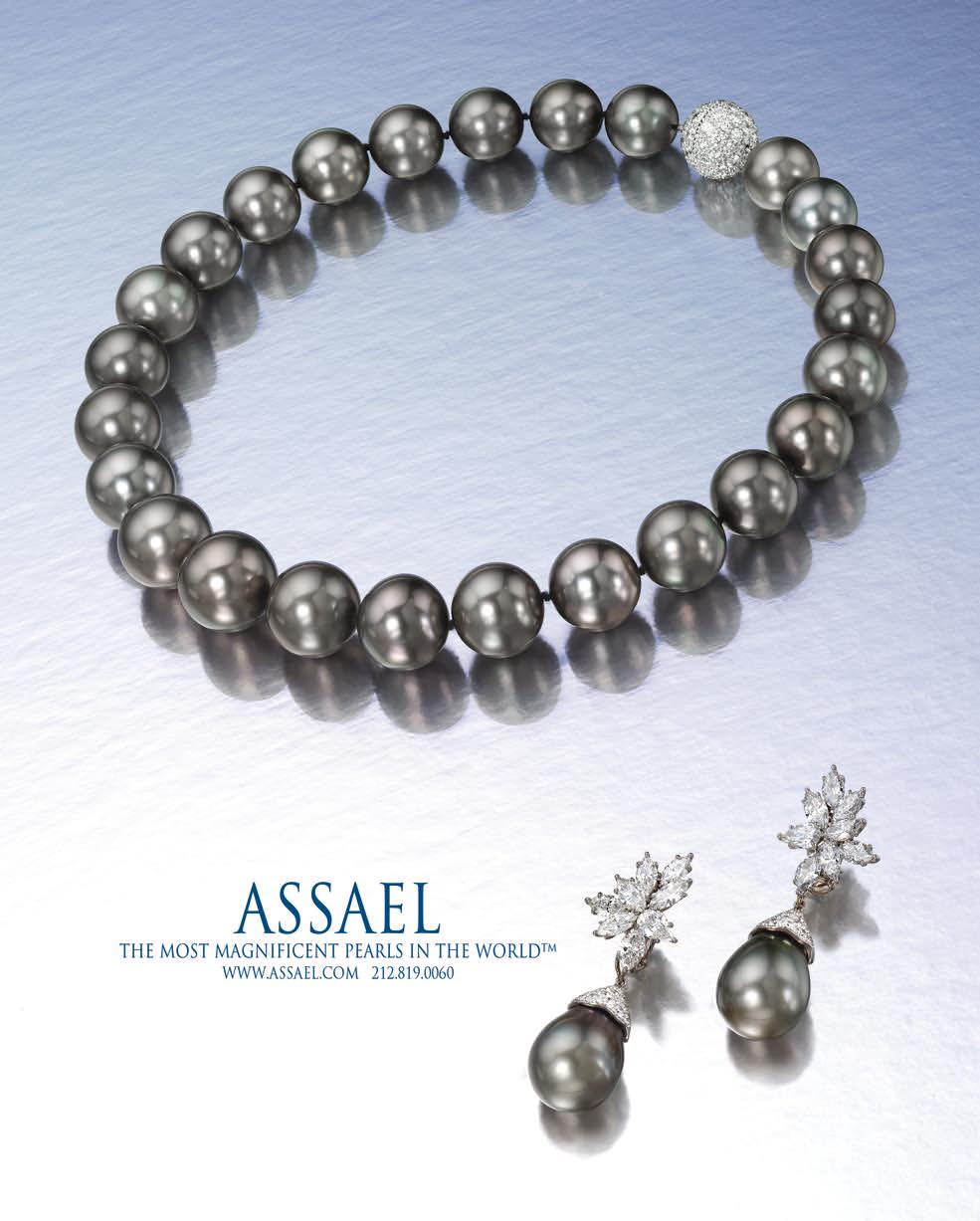

Get light on your feet with barely there sneakers.
Lindsay Silberman hits the ground running.
PHOTOGRAPHED BY GRA n T C OR n ET T
Go bare or go home: Running enthusiasts have been repeating this ditchthe-shoes mantra so often in recent years that it has become almost passé. But the thought of pounding the pavement sans protection can scare off most avid marathoners. Luckily, for those who want coverage but not bulk, a practical alternative awaits. Minimalist sneakers—gear without the high cushioned heels, stiff soles and arch support—provide runners with many of the perks of going barefoot, but ease their fear of stepping on something painful along the way. “For most of human evolutionary history, people ran either barefoot or in very minimalist shoes,” says Daniel E. Lieberman, a human evolutionary biology professor at Harvard who has studied barefoot r unning. “Now there’s an interest in doing things more naturally, getting back to how the body is designed to work.” But rather than jumping feetfirst into a thin-soled shoe, Lieberman advises, runners should start with short distances and work their way up to longer runs. Less can be more—especially in neon.


The high life comes with problems. We’re here to help.

MY FAVORITE RESTAURANT BANNED ME FOR LIFE AFTER I HAD A FEW TOO MANY MANHATTANS AND CURSED OUT THE HOSTESS. BUT ISN’T THE CUSTOMER ALWAYS RIGHT?
Not when you throw around the c word, pal. Listen: We’ve all been that guy, the one who really, really wants things to go his way and maybe lets slip a little “Don’t you know who I am?” this and “I own you!” that. But next time, you need to remember that old kids’ tale about the sun and the wind and the girl wearing the Balenciaga cape. Which gets her to strip down fi rst? Not the blowhard. My advice: Apologize to the owner, profusely and publicly, with a full-page ad—maybe a spread—in the Times Be sincere. You’re sorry you acted like an overstuffed buffoon; as a gesture of remorse, you’ve made a donation to the owner’s pet cause (homeless cats!). Then overnight a Birkin to the hostess. And this time, the c is for crocodile.
MY FATHER HAS STARTED DATING MY COLLEGE ROOMMATE—AND NOW HE WANTS TO DOUBLE. HOW DO I GET OUT OF IT WITHOUT COMPROMISING MY INHERITANCE?
Tell him you’re a lesbian. Next! OK, seriously. You’re a lesbian? That’s so great. So go ahead and let Dad know you’d be delighted to move some things around to join them at Le Bernardin, provided he picks up the check—you’ll take care of pre-ordering the ’98 Coche-Dury Rougeots—and plays nice with your new lady friend. He remembers Lisa, right? His sister-in-law from his fi rst marriage? Then, come armed with some fun stories of you and Roomie’s good old days as part of the tribe back at Princeton, when she had that threesome with those two non-legacies and then bombed medical anthropology. Oh, wait—sorry, Daddy! That was you.
WHEN MY BEST FRIEND ASKS ME WHAT I THINK OF THE COSMETIC WORK HE’S HAD DONE, WHICH IS AWFUL, DOES HE REALLY WANT TO KNOW?
Not even in the slightest. The good news: He already suspects something’s not quite right or he wouldn’t be asking (perhaps he was tipped off when you pointed out the oatmeal that had been stuck to the side of his face since breakfast). Which gives you an opening. So say: “Love, you know I adore you no matter how you look and whether or not your face moves, but I’d be selfish if I didn’t intro you to my uber-exclusive doc. Needles is an absolute dream—his motto is ‘Shiny foreheads are for SoulCycle’— and he doesn’t see just anyone. But I’m positive I could get you in. I would do that for you.” Then let your friend pay for lunch, and text Needles that you got him a good one. Please, no need for thanks. He can repay you in Restylane.
“I was to have cosmetic surgery until I noticed that the doctor’s office was full of Picasso.”—Rita Rudner



When it comes to wine, the future is sparkling. Well, at least as far as a trio of Italian entrepreneurs is concerned.
“A year and a half ago, we decided prosecco—the wine we’ve been drinking since we were kids—was lacking attention,” Gian Luca Passi, one of the founders of the just-launched FIOL Prosecco DOC, says. “We wanted to create something people could be comfortable ordering by name.”
So far, it’s off to a good start. FIOL, which has already cultivated a following in the U.K., Italy and Hong Kong, has made it onto the wine list at the see-andbe-seen Cipriani restaurants and at Sant Ambroeus, the socialitefavorite cafe with branches in Manhattan and the H amptons.
Founded by Passi, an Italian count whose family has long made wine for Villa Tiepolo Passi, their 16th-century home, and his friends, brothers Giovanni and Piero Bassetti, FIOL aims to set a luxury standard for prosecco and establish itself as the first name in Italian sparkling wine.
As Giovanni Bassetti explains, “Our ideal customer is someone who travels all around the world and is looking for a high-end experience.”
The goal for FIOL is to become a regular at the bar, and according to Passi, it won’t be long before that happens. “No matter where you go, there’s always a drink prosecco can be the right match for,” he says, noting th e suddenly ubiquitous Aperol Spritz. “By next summer, it’ll be everywhere.”— ADAM RATHE
WHAT: BETTER BOUNCERS
WHERE: U.S.
A COCKTAILS TIME LINE
Allegedly invented for Winston Churchill’s mother, this whiskey drink was the toast of its namesake town.

Countless revelers have slipped into their finest and headed out on the town, only to be stymied by three feet of velvet rope—and the brute controlling it.
But with spending down postrecession and more clubs than ever competing for customers, something unexpected has happened: The once-fearsome bouncer has become, well, nice.
This mix of vodka, orange juice and herbinfused Galliano liqueur became a bar staple.
“Ten years ago, barking at people was the norm,” says Dave Ferruolo, who works the door at Miami’s STK. “Clubs have realized that we need to value each and every customer. They want to feel like they’re welcome.” And if you want someone to order bottle service, not berating him is a good way to start.
While not everyone is going to get past J ack Kennedy, a
former Army officer who runs security at L.A. boîte Rock & Reilly’s, the people he refuses are seeing a much softer side. “Now you turn down people with humor, or get them to laugh a little bit,” he explains. “You tell them to come back.”
Getting turned away at the toughest doors might be a little less painful these days, but even a gentle letdown still doesn’t sit well. As Eddie Bilowich, of Manhattan’s notoriously selective 1 OAK, says, “Doormen can be as nice as they want, but they will still be perceived as jerks.” —A.R.
Sex and the City made this saccharine-sweet concoction the cocktail to fill a martini glass with.
As drink trends turned south, the rum-based Caipirinha, the national drink of Brazil, became inescapable.


WHAT: A HOTTER MARQUEE
WHERE: MANHATTAN
For its 10th birthday, legendary New York club Marquee got something special: a complete overhaul.
“After we opened Marquee Las Vegas, the original had to be redone,” co-owner Noah Tepperberg says.
The club now features a top-of-the-line sound system, a design by nightclub veteran Josh Held and regular live music performances.
“It’s not a scene-y place,” Tepperberg says. “It’s about the energy, the music and the space.”


Women are figuring out their best tool to make money—and keep it— is each other. Nancy Miller shatters the glass ceiling.
PHOTOGRAPHED BY
HENRY HARGREAVES
It would be a stretch to say
Joan was an accidental real estate investor—no one buys buildings in New York City by accident. But it would be fair to say it wasn’t on her list when she was first thinking about careers. “I thought I would teach forever,” says Joan, a former professor of fi nance who declined to give her last name. “Then my mom got very sick.”
So she stepped into the family business her mother had run since the death of Joan’s father many decades earlier. Turns out Joan had a gift—and ambition. She transformed a single Manhattan residential building into a real estate empire. But learning to manage her newfound wealth proved a challenge equal to
expanding the company. Despite her obvious business sophistication, Joan says, “I operated in ignorance” when it came to her own finances.
For a long time, money, even more than sex, was a taboo topic of discussion among women, largely because men were in control of most of it. But a new fleet of female power players is leading an army of women into the realm of major wealth. According to the Spectrem Group, women under 56 now account for nearly 40 percent of wealth among adults who have a net worth in excess of $25 million. In small gatherings all over the country, they’re re-casting the chatter and t urning to each other to discuss how to handle all this cash.
“There was a time when money was not considered a proper subject for ladies,” says Muriel “Mickie” Siebert, the first woman to buy a seat on the New York Stock Exchange, 45 years ago. It’s why people like Joan had nowhere to turn for advice on earning and spending and saving. That began to change when the activist Elinor Guggenheimer called Siebert to describe a road trip she took with her husband to visit his Yale Law School buddies. She had an insight: Men have a network, but women do not. Guggenheimer’s response was to launch the Women’s Forum, a group connecting that rare breed of female executive, especially the ones who were unprepared for their success. Even if they “made it” they often stumbled, sometimes badly, in managing their money.
“When I sold my first company I got this big
“IT’S ABOUT RELATIONSHIPS AND THE SATISFACTION WE GET HELPING OTHERS.”
check,” recalls Joyce D. Reitman, an angel investor and serial entrepreneur in San Francisco. At the time, she was surrounded by big-time dealmakers—lawyers at Wilson Sonsini, a Big Four CPA fi rm—but no one ever suggested she seek help managing her windfall. And so she didn’t. Like many female entrepreneurs in the late ’90s, she figured she could handle it herself. “I wish I had had someone like me standing there telling me ‘Okay, let’s map out the things you want to do in your life,’” she says. Instead, Reitman says she became a somewhat haphazard investor, putting money into things that came her way but not creating a strategic plan.
Joan says it took her years to figure out how to manage her wealth. After refi nancing her fi rst building, she says she gave some of the cash to a neighbor, a stockbroker, to invest, almost as an afterthought. Fortunately, she didn’t give him a lot. The broker put some into a high-technology fund at the peak of the dot-com bubble, and the fund went to zero.
Such experiences have led women to try to fi ll the void with education. A few years ago, Joan found Tiger 21, a peer-to-peer investment group for the ultra-wealthy, where members bare their fi nancial souls in workshops like “Portfolio Defense,” a form of asset-management group therapy. But Tiger 21, and other groups like it, is a male bastion, and many women prefer a place where they can create their own brand of money talk and focus on connections and the satisfactions th at come with boosting each other.
The Silver Bridge Institute in Boston aims to educate wealthy women through programs like “A Woman’s Perspective.” One recent lunch on
financial fundamentals promised to help attendees learn the basics of money management so they can “work effectively” with their family, advisors and partners.
“Women like to learn and engage in really different ways from men,” says Dune Thorne, a partner at Brown Advisory who has been involved in teaching women about finance for the past decade. They organize themselves around “community, trust and collegiality.” Unlike men, women don’t want to talk products and returns as much as they want to talk about collaboration. While m en view money as a means to power or independence, women with money tend to want to focus on interdependence and relationships, says Kate Levinson, author of Emotional Currency: A Woman’s Guide to Building a Healthy Relationship with Money
Take, for example, designer and retail queen Tory Burch, newly enshrined in the church of billionaires, who’s putting a personal spin on charity by focusing on microfinance for women entrepreneurs. Spanx creator Sara Blakely, who is, at 42, the youngest self-made female billionaire on the Forbes global round up, says she wants to change the world “one woman at a time.” Facebook Chief Operating Officer Sheryl Sandberg, whose net worth is about $500 million, is kn own for throwing monthly dinners for women rising in the ranks.
Of course, these groups and gatherings give women a haven to discuss the emotional side of money, too. However they reap their wealth, women nearly always bear a mantle of guilt. When they earn it, there’s a part of them that feels they may have sacrificed their mar-
riages or their children, says Helen Dietz, president of Stanford Investment Group.
When they get it through divorce or widowhood, there’s a different kind of guilt. Women may try to allay it through charity. Or, when they look for help with their finances, they may seek to replace the missing male in their life—and they don’t always make the right choices. One female broker recalls how prospective female clients would consistently select men who were charging them more money for the same services she offered. Barbara Stanny unwittingly married a compulsive gambler who spent the entire fortune she had inherited from her father, Richard Bloch, a cofounder of tax empire H&R Block. She didn’t even realize her money was disappearing until she got an “insufficient funds” message at the ATM.
Women’s very different set of goals and approach to money is what can make them vulnerable but it’s also what makes them effective, says Hannah Kain, CEO of ALOM, one of the largest women-owned private businesses in California a nd the wife of an entrepreneur. Women aren’t risk-averse, but they’re more risk aware which means they’ll not only give money to places where they also give their time but also seek out investment fi rms that value trust and connection.
“For women, it’s about relationships and the satisfaction we get helping others,” Kain says. Adds DeAnne Steele, a managing director and investment executive at U.S. Trust, “It’s not about a name on a building.” Not that something like that is out of the question. Not anymore.


Fancy-pen purveyor Montblanc is committed to the written word—so much that they’ve joined UNICEF’s efforts to educate underprivileged children in reading and writing. The “Signature for Good” initiative, which began in 2009, has raised over $5 million to date. Under the leadership of CEO Lutz Bethge, Montblanc plans to up the ante this year with a new line of “Signature for Good” items, including handcrafted leather goods, cuffl inks, bracelets, key rings and a redesigned version of its classic Meisterstück pen. For every piece in the collection sold over the next year, it will donate a portion of the proceeds in an effort to raise at least $1.5 million dollars. And it’s easy to see exactly where the f unds are going. Longtime Montblanc-initiative supporter, actress Hilary Swank, traveled to Ethiopia last year to get an upclose view of where they will be used. Everyone else can register the unique serial numbers of their purchases on Montblanc’s website and track the progress of their donation.
—LINDSAY SILBERMAN

The renowned architect thinks big in his minimalist office space. (Hint: No computers allowed.) Adam Rathe drops by for a visit.
PHOTOGRAPHED BY ADRIAN GAUT
















Those familiar with the buildings Richard Meier has designed know the Pritzker Prize–winning architect favors clean lines, wide panes of glass and white facades. Visitors to his office, an airy sixth-floor space in a building on the west side of Manhattan, will find those same qualities in spades.
“The openness, the light, the flexibility of the space—that’s what was appealing about it,” Meier, 78, says of the place his company has inhabited since 1986. “We have a few private offices, but mainly it’s an open space where people can work and communicate easily. It seemed to me that it was enough space to do whatever we wanted in terms of growth.”
his Los Angeles outpost and a portfolio including major projects in Taiwan, China, Tel Aviv and Brooklyn.
Meier’s staff size isn’t the only thing that’s changed at the office, which sits on a desolate stretch of Tenth Avenue and calls a rare Manhattan gas station its neighbor. “At the time we moved in, the Jacob Javits Center was about to open on Eleventh Avenue,” Meier says of the formerly down-at-the-heels area. “Then th ey swept the streets, because with the convention center nearby they didn’t want visitors walking through a dirty area. It’s been wonderful ever since.”



And grow they have. When M eier first moved in—which he did at the suggestion of his friend and collaborator, the designer Massimo Vignelli— only about 30 employees were housed in the office. Almost three decades later, he has twice that number working with him, in addition to a staff at
Relics of just how wonderful are proudly on display throughout Meier’s office. Architectural models—like the most intricate, expensive dollhouses you’ve ever seen—line the hallways, showing off classic Meier designs (such as his iconic apartment buildings on Charles and Perry streets in Manhattan’s West Village) as well as newer projects, like the Bodrum Houses near Turkey’s Yalikavak Bay

“A LOT OF TERRIFIC THINGS HAPPEN HERE ALL THE TIME.” –RICHARD MEIER
and buildings that were dreamed up but never constructed.
The models are made in a workshop in the back of the office, and what can’t be stored there is sent out to a 3,600-square-foot, open-to-the-public museum Meier keeps in Long Island City, Queens, for just that purpose.

“We devote quite a bit of space, probably too much, to storing and exhibiting the models,” he says. “We keep making models and then try to figure out where we should store them.”
But Meier doesn’t make a habit of holding on to much. He stores his passion projects, mainly collage work, at home and, except for a few keepsakes and photos of his children, his workspace is devoid of bric-a-brac. Books line the walls and sculptures—one by Meier himself, two by artist Michael Esbin—sit by the windows. The architect’s 10-foot-long desk is dotted with blueprints and the day’s newspaper but doesn’t even hold a computer.
In fact, t he only thing disrupting the order of Meier’s office is a mas-
sive, colorful work by his friend the artist Frank Stella.
“That painting is pretty important to me; it was a gift from Frank very shortly after we moved in here,” Meier says of the complicated, structural artwork. “It came in pieces, but I’m not sure how we’d ever get it out of here. There aren’t many other places it could fit.”

Sure, there’s impressive art and the occasional notable visitor—a celebrity couple Meier declines to name stopped by recently to discuss their new home, and he counts an in-office breakfast with former Czech president Václav Havel as a personal highlight—but what’s most apparent throughout the space is the architect’s legacy of important design. (It’s one that will be celebrated this summer with an updated version of Complete Works , a coffeetable book chronicling his career.)
Indeed, when asked to sum up the greatest aspect of his space, Meier answers succinctly, “A lot of terrific things happen here all the time.”

You’re on the front page of the New York Times —but it’s not good news. Your company is under investigation. Shareholders are clamoring for your removal. Employees are threatening a lawsuit. What to do? For the best connected, the answer is, “Call Lanny Davis.” A lawyer and author, Davis has worked with the likes of Bill Clinton (he was White House special counsel from 1996 to 1998), Whole Foods, Macy’s, Royal Caribbean Cruises, Washington Redskins owner Dan Snyder and Penn State. In his new book, Crisis Tales: Five Rules for Coping with Crises in Business, Politics and Life, he shares the lessons learned from 12 years of putting out fi res.
but she wasn’t guilty of insider trading. In fact, the prosecutor never even brought that case.
So do you think the jury felt they had to convict Ms. Stewart of something because they’d already decided that she was guilty?
I assume sincerity, and I have faith in the jury system. But I can conjecture that the publicity about the case—

When people are un der investigation, their instinct often is to not talk to the press. But you say it’s a mistake?
Yes. It’s almost always it’s a mistake, and for a public corporation, it’s a major one. The story is going to be written whether you talk or not, so the question is, Are there things that can be safely said that can make the story more accurate and balanced? Saying “no comment” is the equivalent of a guilty plea, to most people.
You’ve counseled President Clinton. Despite his personal crisis, he was able to avoid impeachment and stay in o ce. Do you think a di erent outcome could have been possible in General David Petraeus’ case?
Yes. And he still hasn’t done what should’ve been done.
Which is what?
Tell it all, tell it early, tell it yourself.



You worked with Martha Stewart during the investigation into her sale of ImClone stock. You’ve expressed frustration that her criminal attorney wouldn’t share what he knew with you. Do you think if he had, she wouldn’t have had to g o to jail?
I strongly believe that Ms. Stewart would not have been prosecuted as she was if her attorney and I had worked closely together. In order to do my job in a criminal case, I need the criminal attorney to share all the facts with me, so we can decide together if it’s too dangerous to say anything to a reporter. Ms. Stewart was accused—and convicted— by the media of an insider trading crime before she ever had her day in court,


“SAYING ‘NO COMMENT’ IS THE EQUIVALENT OF A GUILTY PLEA, TO MOST PEOPLE .”
where she was prejudged by much of the media of having traded on inside information—affected some jurors and their view of her. Then, when her lawyer didn’t let her testify, she didn’t have the chance to convey to the jury that she didn’t trade on inside information and that she’d made a few honest mistakes but not criminal ones.
When she was running for vice president in 1984, she was attacked about her husband [and his business dealings]. She put herself in a room with the media, and she said, “I’m not leaving the room until I answer every one of your questions. I don’t care how painful it is.” And she left that room battered and bruised, but it was over. You’ve gotta kill the beast with facts. It’s difficult to take that advice. I’m being an objective crisis manager when I say General Petraeus didn’t do it the right way, but I’m not criticizing him personally. All I feel is empathy for him.
Who has been your most challenging client, and why?
Congressman Charles Rangel. I love him dearly, but he was the toughest. He was so angry. He believed, as I believe, he’d done nothing morally, ethically or criminally wrong. [He was ultimately censured on the floor of the House of Representatives for not paying income taxes for more than 20 years on his Dominican Republic condo; the total owed was about $10,000.] He’d been careless. But because he’s so proud, he was unwilling to take proactive measures to prevent the unhappy outcome we saw.
But by stepping down from the CIA, didn’t he absolve himself of the need to do that?
General Petraeus thought that by writing a letter saying “I did wrong, and I’m resigning,” it was the end of the story, and it’s not. It’s actually making matters worse if that’s all you do, because everybody sees it as just pure PR. You’ve got to do what I call a Geraldine Ferraro:
Do you ever get tired of solving problems?
Yes. I’d love to answer the phone and have someone say, “Hey, Lanny, I’ve got great news for you.” [Laughs] But my job is to handle the bad news. I didn’t choose that position, but I’m a lawyer, and I know the press, and I know politics, and it just happened. After I left the White House, people started calling me because their lawyers were telling them not to talk. They’d say, “What can I do? I want to tell my side of the story.” I had to invent a way to help them tell the truth.
—INTERVIEWED BY SHARON KUNZ













Model 0823
Professional Swiss quartz chronograph
Ø53mm surgical grade solid stainless steel case
Screw-down crown
Screw-down case-back
Flame fusion crystal
Genuine mother of pearl dial
Tritnite® luminous hands and indexes
Date display
Water resistant to 300 meters






How a small town became luxury shoe designer Stuart Weitzman’s headquarters. Megan Conway tells the story of Elda. PHOTOGRAPHED BY AARÓN SERRANO










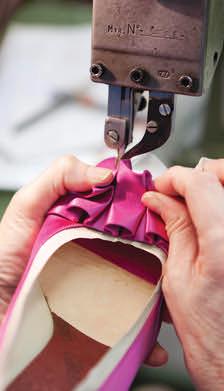
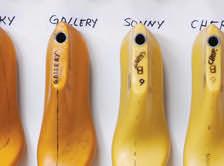
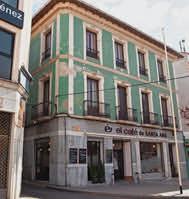


When Stuart Weitzman walks through the narrow streets of Elda, Spain, he’s treated like royalty.
The sentiment is fitting: He owns four shoe factories in the town, and he jokingly refers to the area where they’re located—all within walking distance of one another—as “Stuart’s little kingdom.” But whereas the 71-year-old luxury-footwear veteran means this mostly as a bon mot designed to deflect the significance of his role there, the 3,000 people he employs—more than 35 percent of the town’s shoe-industry workers—might take it more to heart. He’s something of a one-man bailout plan for the Alicante region, where his base of operations has been for more than 30 years, producing loafers, boots, pumps and flats favored by everyone from Kate Middleton to the brand’s current poster girl, Kate Moss.
new factory.” In work-scarce Spain, Weitzman shoemaking has become a lifeline for underemployed families, who sometimes pass down jobs through generations.
In fact, shoemaking was the Weitzman family business, too. Growing up, Weitzman apprenticed for his father’s footwear company, Seymour Shoes, based in Haverhill, Massachusetts, a mill town nicknamed Queen Slipper City. He and his brother took over the business in 1965 after their father died and right away they experienced the kind of shock and turbulence that’s still rocking manufacturing in the U.S.

Weitzman spends more than six months of every year in Elda, which sits just inland from the Mediterranean port of Alicante (and boasts one of the best fish restaurants in the country). About his earliest days manufacturing shoes in Spain, beginning in 1971, while Francisco Franco was still in charge, “I started out in a dictatorship that was really repressive for the people, and now it’s this glowing democracy. I started to build factories, so once you do that, you really plant the trees; you’re not going to leave.”
Each of his factories specializes in a certain kind of shoe.

“I wanted to make shoes, and it [costs] millions to set up factories,” says the Queens native. “I had to find someplace where I could start something.” So in 1971, when he was 29, Weitzman began searching for the best place to start over, figuring he would partner with an existing company until he had the resources to start his own.


“I could have cheated and tried to make an evening shoe where they make moccasins, but they don’t have the hands for that,” says Weitzman, who tends to transmute old-school diligence into the language of necessity. “So every time I wanted to add something to the line, I had to build a
He flew first to Italy, famous for its leather and luxury goods, but encountered a strike on the national t rain system and another strike at his hotel. Next he visited Spain, which has a sturdy, centuries-old tradition of shoemaking. “In Spain they did anything I asked for,” recalls Weitzman, whose selfnamed company has since become one of the best-loved high-end shoe brands in the world. “They worked during the lunch hour to show me how they made a product, and I thought, I can’t put up with the Italian system.” He signed on with the Spanish company Caressa, at fi rst designing shoes under the label’s name and later creating a line with his name attached to the brand: Stuart Weitzman for Martinique. “I created a mini brand name at their expense but with my w ork,”


“SHOES HAVE BROUGHT ME A LOT OF FUN IN LIFE.” –STUART WEITZMAN
says Weitzman, an adept businessman with a degree from Wharton. In 1986 he severed ties with Caressa. But by then he’d grown to love Spain, so he decided to stay.
on sight how a toe box or heel could be improved (comfort is his highest priority, if not something of a trademark).

Given his celebrity status—last November, he was presented with Footwear News’ Lifetime Achievement Award by Weitzman enthusiast Beyoncé—it’s impressive how intimately involved he remains with the production of his shoes. (When I visit him at his Manhattan showroom, I fi nd him appraising the fit of a boot, sketches for future designs splashed around him on a desk.) He does the creative work of drawing and designing shoes in Spain, where he collaborates with two designers to produce patterns that they tweak until they’re good enough to make into samples. He has a knack for identifying

Today, Spain’s manufacturing—an especially hard-hit sector of its battered economy—is facing enormous difficulty. But the shoemaker is well equipped to adjust to his circumstances. Elda is glutted with many shoe factories, but most operate on a contract basis for other bigname brands. (At the moment, he tells me, “all the espadrilles are being made there: Armani, Chanel, they’re all there.”) Few have permanent facilities in the region—and none has made the kind of powerful economic impact Weitzman has.
In the countryside surro unding his footwear fiefdom, Weitzman’s name is prefaced with the honorific Don , a title given to him in 2007, when he was named el
Hijo Predilecto Adoptivo de Elda by the communities of Elda, Petrel and Rio Vinalopo (translation: favorite adopted son of Elda). He’s the only non-Spaniard ever to receive the honor. “It was the workers who nominated me, which made it very special,” says Weitzman, who is fluent in Spanish. Ever the entrepreneur, he prefers to focus on numerical motivations, but he’s clearly deeply touched by the accolade: “It’s the fact that they appreciate that they have been working in a good company. And I appreciate that th ey stayed with me.” Indeed, the average number of years people work for Weitzman is an astounding 22.
“I have no complaints,” he says. “Shoes have brought me a lot of fun in life—a lot of recognition but also a lot of pleasure.”




Everyone’s eyes are on Kamala Harris. Nina Martin talks to the California Attorney General about those Supreme Court rumors.
PHOTOGRAPHED BY THAYER ALLYSON GOWDYIt’s January 2013, but unlike most people, California Attorney General Kamala Harris isn’t talking about the coming year. Instead, she’s speaking about the past: her election in 2010. That night, even many of her supporters doubted she’d win her bid to become California’s next A.G.; in fact, her opponent—Steve Cooley, the popular, moderate Republican district attorney of Los Angeles—declared victory a few hours after the polls closed.

But Harris, who’d been out to dinner with friends and family, was oblivious to the fact that she appeared to have lost. She recalls, “We got to headquarters, and my consultant said, ‘OK, speak to the folks and the news.’ I go out. People are looking at me and crying, and I thought, ‘This is so wonderful.’ I give my speech—this is what we stood for, this is why we ran—and I could feel the mood shifting.” Only after she walked away did the truth dawn on her. “Everyone was crying because they thought we had lost! I was the only one who didn’t think so!” And she laughs so hard I’m afraid she might choke.
In the end, Harris won, albeit by a margin so small—only 74,000 votes—that Cooley held out for three weeks before finally conceding. That close victory made her not just the top law enforcer in the most populous state in the U.S. but also one of the most powerful legal officials in the country. It was a job many believed that ne ither an African-American nor a woman would ever get, much less a liberal black woman who opposes the death penalty.
Every so often, a Northern California politician comes onto the scene who makes people in the area and nationwide go “Wow.” In recent years, San Francisco has had many: Nancy Pelosi, Dianne Feinstein, Gavin Newsom, Jerry Brown, and now Harris. Since she first got noticed in the mid-1990s, she’s been dazzling people with her political acumen, bold ideas and global-village glamour—and frustrating them with her relentless drive.
Obama raised money during the 2010 cycle.

When I googled Harris’ name recently, the first thing to come up was the rumor that she would be tapped for the U.S. Supreme Court. Justice Ruth Bader Ginsburg, 79 and ailing, may step down in the next year or two, and some think Obama will want to replace her with a trusted, younger, multicultural woman, someone with political skills and legal chops.
When I ask about the buzz, Harris gives one of those evasive answers that keep t he gossip mills churning: “I am very focused on what is right in front of me. I love this job. You can have a direct impact of the lives of 40 million people.”

For these reasons, Harris, 48, is often compared to President Barack Obama, whom she’s known for almost a decade and for whose campaign she served as national co-chair in 2012. (Her brother-in-law, Tony West, holds the number-three spot in the Department of Justice.) She says, “[The president] and I have a relationship based on respect.” Harris was the only candidate for statewide office in the U.S. for whom
She showed that to be true with her first bold move as A.G. Shortly after taking office in 2011, Harris sicced her department on the big banks whose practices she held responsible for the housing crisis that had devastated California. (At one point, 9 of the 10 worst-hit metro areas in the U.S. were in the Golden State.) The banks weren’t amused. They were negotiating with 50 states and seemed likely to get a deal—paying only $2 billion to $4 billion to

California in compensation and receiving immunity fr om all future inquiries and suits—that was less a slap on the wrist than a brush with a feather.
Harris was outraged. “One of the things I love about holding statewide office is that we are more nimble [than the feds],” she says. “And because the buck stops with me, we don’t have to ask permission to do the things we do. If the voters don’t like it, they’ll let me know.”


In August 2011, she went to Washington, D.C., to meet with the banks. People familiar with the talks say their lawyers assumed that the novice A.G. must be a lightweight and that her loyalty to the president, who wanted a deal to shore up his re-election chances, would trump any r eluctance she had.
“They didn’t know what they were getting into,” says Harris’ senior policy advisor Michael Troncoso


with a laugh. “Kamala’s a trial lawyer. She’s negotiated I don’t know how many plea deals, and she has a saying: ‘Don’t take “no” till the fifth time.’” The meeting ended after an angry Harris declared, “I’m going to investigate everything. All of it. I have an obligation to my client, which is the state of California.” A few weeks later, she pulled out of the 50-state talks, and the gnashing of teeth could be heard from Wall Street to the White House.
Flash forward to February 2012. After a frenzy of negotiating, she announced a deal with the banks, including some $18 billion in compensation—with at least $12 billion of it guaranteed for Californians— and no immunity from future investigations or s tate lawsuits. Bottom line: If you underestimate Kamala Harris, you do so at your own risk.
“With Kamala, the sky really is the limit,” says her friend Mark Leno, the influential Sacramento lawmaker. As ethnic minorities become the majority in much of the country, Harris—the child of immigrants, half South Asian, half black—looks like the future. While Democrats try to wrest that future from Republicans whose hard-line ideas, especially in the criminal-justice area, have dominated the political agenda for many years, Harris has given them some of their most effective talking points.
that she knew she’d be judged on (which earned her criticism as an ambitious climber who was always looking several steps ahead in her career). She also made so me serious mistakes. Her quick declaration that she would not seek the death penalty for the accused killer of a young police officer earned her the wrath of cops statewide, and when wrongdoing was uncovered in the city police lab, her office compounded the problem by dragging its feet.
In 2010, she was seen as far from a shoo-in to become attorney general, especially since she’d be facing off against the well-liked Steve Cooley. “Some people said to me, ‘Don’t go there because they won’t vote for you.’” she recalls. “But I said, ‘Everything and everybody is on the table.’”

Her optics don’t hurt, either. She’s beautiful and always gorgeously garbed. Her personality is no less appealing, though her huggy warmth can turn to cold s teel in a flash. She’s also hyperenergetic, demanding and hands-on. In many ways, Harris sounds like her whirlwind of a mother, a Brahman from India who came to the U.S. in 1960 to study, married then divorced a Jamaican-born fellow grad student (he is now a professor emeritus in economics at Stanford) and went on to be a top research scientist. Shyamala Gopalan Harris (who died in 2009) exposed her two daughters not only to the era’s antiwar and feminist politics but also to the world beyond their modest Berkeley neighborhood. Kamala, a couple of years older than sister Maya, was hard-working and a perfectionist, with a heart that bled for crime victims. Everyone expected her to be a civil r ights or defense attorney. Harris, though, realized that prosecutors held the cards.

In general, the drumbeat of news about her department’s accomplishments has been steady and


She got her undergraduate degree from Howard University and a JD from Hastings College of Law. She worked in the D.A.’s office in Alameda County for eight years and then in the San Francisco D.A.’s office. Because she wasn’t part of any existing political machine, she had to build her own coalitions to win a cutthroat race for San Francisco district attorney in 2003. In her eight years as D.A., she targeted areas, like the homicide prosecution rate,
with Harris’ office to pass progressive legislation— on the environment and gun safety, for instance.
Still, there is one big potential danger. Forced into a corner by a U.S. Supreme Court ruling in 2011 that extreme overcrowding in California prisons constituted “cruel and unusual punishment,” Governor Jerry Brown has implemented “realignment”—moving tens of thousands of inmates convicted of less serious crimes out of state prisons and into county and local jails or even back on the streets. Budget cuts have left police departments understaffed and overwhelmed, and there have been few additional funds to help local jurisdictions pay for the influx of prisoners. Already there are anecdotal reports that crime in some areas is on the rise.

Realignment is an e asy target, but it’s Governor Brown’s policy. Why would Harris be the scapegoat?
Because as A.G., she is the person Californians associate with criminal justice, and she’s made her name touting similar policies. As D.A. and as A.G., she’s rejected the hard-line ideas that have nearly bankrupted California’s criminal-justice system and led to high recidivism rates (65 percent of the state’s ex-inmates will re-offend within three years of release). One of her pet programs in San Francisco, “Back on Track,” aimed to keep low-level drug offenders out of jail by providing them with services (everything from GED coaching to child care to gym memberships) and entry-level jobs. The program was successful enough that Governor Arnold Schwarzenegger signed a similar o ne into state law in 2009.

mostly positive. Harris, who oversees 1,100 l awyers, is proud of the action her office has taken to clear up its backlog of thousands of untested rape cases, and she thinks her efforts promoting use of a database to enforce state laws banning felons, spousal abusers and people with mental-health issues from possessing firearms could be a national model. She also worked with the major online platforms to hammer out a sweeping new mobile-app privacy policy.
The next year could be more productive. Since last November, when voters elected Democratic supermajorities in both houses of the Legislature and signaled their willingness to significantly increase taxes for the first time in 35 years, there’s been a palpable optimism in the air that lawmakers can p artner

Harris is aware of realignment’s possible impact on her career. “I have no doubt—because this is what innovation involves—there will probably be glitches. This is a whole new way of doing business.” She adds: “The fear that every law-enforcement leader has is that if you do something different”—like not locking up someone who committed a petty theft— “you’re taking a risk that the person will go out and kill a baby, and everyone will say, ‘What were you doing?!’” (Harris knows this from experience: In 2008, the D.A.’s office didn’t prosecute an undocumented immigrant/gangbanger for lack of evidence, and three months later, he was involved in the killing of three innocent members of the same family.)

Sh ould realignment end up succeeding, though, no California politician is likely to benefit more than Harris. Many see her running for governor when Brown is termed out in 2018 or perhaps heading to Washington. It’s clear, however, that she’ll be making her own decision about where she’s going next, and she won’t be put off by naysayers. As she puts it, “Don’t tell me ‘no.’ That’s a bad and wrong thing to say to me. I eat ‘no’ for breakfast.”


Nina Burleigh catches up with Fox News Channel chief White House correspondent Ed Henry, the man overseeing the capital’s biggest event PHOTOGRAPHED BY MIKE MORGAN
James Carville used to say that Washington is Hollywood for ugly people. That may be harsh, but there is one night a year in the nation’s capital when the dogs of politics put on their sequins and tuxedos and rub shoulders with the gorgeous.
That annual soiree, called the White House Correspondents’ Association Dinner, is always a star-studded event, one where a Supreme Court justice can be spotted chatting with Justin Bieber or Steven Spielberg is whispering in the ear of the president.

This year’s White House Correspondents’ Dinner, which takes place on April 27, is sure to be as glamorous as in years past, but the man overseeing it is a slightly unusual one: Fox News Channel chief White House correspondent Ed Henry. A seasoned and award-winning Washington journalist who earned his chops as a reporter for legendary columnist Jack Anderson, Henry is a controversial choice because of his position as Fox News’ man in the Obama White House, where they’ve had a sometimes contentious relationship.

Obama retorted, on national television: “I didn’t know you were the spokesperson for Mitt Romney.”
But the Q ueens-born Henry rolls with the punches, presidential and otherwise. “I just think there is probably a unique spotlight put on the Fox correspondent covering Obama, because there has been some back and forth over the last four years—to put it mildly,” he told DuJour in an interview from a vacation in Florida with his wife, a CNN producer, and his two children. “I respect the president, and I think he respects me. My job is to challenge authority. I don’t really have any problems day to day in terms of covering them.”
after Obama’s reelection.



At a White House press conference in October 2011, Henry asked Barack Obama to respond to Mitt Romney’s comment that “if you do not want America to be the strongest nation on Earth, I am not your president.”
“MY JOB IS TO CHALLENGE AUTHORITY.”
–ED HENRY
The White House, for its part, says it has no particular beef with Henry. “Like every other professional journalist who c overs the White House, we don’t like every word that Ed has said on camera, but we work with him every day to provide the access and information that he needs to communicate to a sizable audience what’s happening at the White House,” spokesman Josh Earnest told the AP
Henry’s road to the White House press room wasn’t predetermined. He says his father spent most of his career as a supermarket manager in New York City, and Ed was the first member of his family to go to college. (He attended Siena in New York.) He moved steadily up the press corps’ ranks afte r arriving in Washington in 1991. After eight years covering the Hill for Roll Call, Henry went on-air at CNN. There he first adopted his trademark dapper look, attracting the attention of AP fashion writer Samantha Critchell, who praised his sartorial signature, a pocket square.

where Georgetown doyennes broke out the family silver and china to seat members of both parties beside one another over meals and cocktails. That tradition was lost with the advent of the working wife and the new era of profound political acrimony.
The Mad Men accessory and attention to detail seem to fit Henry’s role as president of the White House Correspondents’ Association. In that post, he’s the organizer of a bipartisan social lubricant—a larger-than-life version of an event that was once much more common in D.C. That dinner “is one of those rare occasions when Republicans and Democrats come together,” Henry says. Such events used to be regular occurrences in Washington,
When asked whether he thought the chummy, bipartisan dinner party of yore ought to—or even could—make a return in modern Washington, Henry replies, “I would say there is a very fine line. We as journalists should not be buddy-buddy with people we cover. We have a solemn responsibility to challenge authority, but we shouldn’t reach a point where we can’t have a meal with people we cover without people thinking there is something sinister going on. There was a time when Republicans and Democrats sat down and had meals together without people pointing fi ngers.”

Henry says the comedic element at the 2013 dinner will match those of previous years, which have seen legendary presidential roasts by the likes of Stephen Colbert, and in some cases have become YouTube sensations. But it’s not all social fl uff and laughs, he points out. Through their annual event, the White House Correspondents’ Association raises more than $100,000 every year for budding college journalists. The upcoming dinner will be no different.
“We always get a lot of buzz for our White House Co rrespondents’ Dinner. Lots of celebrities come, people have a great time, and that’s good,” he says. “But we want to remind people that our organization is standing up for press access at the White House and standing up for needy students. That’s important to us. We should give something back.”


















Last fall, Jenny Holzer, the celebrated New York conceptual artist, flew down to the Dallas area to put the fi nishing touches on her recently completed commission. Like some of her earliest video works, this ambitious new piece hinged on a series of provocative maxims—“Lack of charisma can be fatal” or “Ambivalence can ruin your life”—which were projected onto a screen and meant to induce “sustained contemplation.” Only this screen happened to be the 72-foot-high Jumbotron that’s perched above the gridiron at Cowboys Stadium, a beer-filled bastion of tailgating and chest-thumping that holds up to 100,000 screaming football fans—in other words, the last place you’d expect to find highconcept video art.

Holzer says her video “truisms,” which pop up between pizza ads a nd instant replays of a violent sack by the star player DeMarcus Ware, have caught some fans by surprise. That was the point. “The reaction ranged from people pointing and laughing to others properly ignoring my stuff and tending to whatever else was around them,” she says.
But Holzer’s piece is not an anomaly inside the four-year-old Cowboys Stadium, located in Arlington, Texas, about 25 minutes from downtown Dallas. The work


is among 50 other commissions by big-name artists like Olafur Eliasson, Lawrence Weiner, Doug Aitken and Matthew Ritchie—a collection that the National Endowment for the Arts called “museum-worthy,” adding, “Never before has art and athletics coexisted so seamlessly.”
Several of the works, which appear above concession stands or atop soaring stairways, seem striking in the context of a modern sports arena. These are not LeRoy Neimanesque murals glorifying athletic exploits. Eliasson’s piece, a sculpture called Moving Stars Takes Time, is an amalgam of circular and elliptical solar orbits described in stainless steel and yellow glass. The painter Matthew Ritchie takes the Xs, Os and arrows that f ootball coaches use to diagram plays and scrambles them into a giant futuristic triptych. And the noted conceptual artist Mel Bochner’s 38-foot-tall mural at the northeast staircase screams out synonyms of the word win: “VANQUISH!



“THEY’RE NOT MERE DECORATION.” –ARTIST MEL BOCHNER
the world of football,” Anderson says.
CLOBBER! KICK SOME BUTT!”
“The artwork that’s there—my piece, Lawrence Weiner’s piece—they’re not backgrounds, they’re foregrounds,” Bochner says. “These pieces are significant in their aesthetic meaning. They’re not mere decoration. That’s what makes their existence in a football stadium even more remarkable.”

She elaborates that her family, particularly her mother, Gene, has a deep appreciation for art but hadn’t the foggiest idea of who’s who in the contemporary art world. “That was out of our comfort zone,” Anderson says. So, after consulting with collectors in the Dallas area, the team hired the San Francisco–based art adviser Mary Zlot, who was in itially wary of the Cowboys’ foray into modern art. “Getting them to buy into this process to begin with was actually kind of a challenge,” Anderson explains. “They were like, ‘What are you doing down there?’”



Charlotte Jones Anderson, the executive vice president of the Cowboys, whose family, led by her father, Jerry Jones, owns the team and built its $1.1 billion stadium, says the art collection harks back to the “Greek and Roman times, when frescoes were on the walls of the great sports coliseums.” This classical analogy fits in with the Joneses’ epic ambition for their stadium to be not merely a sports arena but a cultural hub. (In addition to the artworks, the stadium has hosted a free simulcast of the Dallas Opera’s performance of Mozart’s The Magic Flute.) “We wanted a stadium that spoke to fans beyond
By now the Cowboys have dispelled any skepticism; the team is said to possess the most significant modern art collection in any sports arena. Anderson declined to put a dollar amount on the team’s investment but confirmed that it was well north of $10 million.
And other sporting venues have been getting into the game. The Minnesota Twins’ Target Field opened in 2010 with a trio of mosaic murals that St. Paul native Craig David hand-sawed out of porcelain and stone. In Brooklyn, the new Barclays Center—home of t he Nets basketball team—has in-
stalled several noteworthy works, including a 70-foot-long mural by the gallery darling José Parlá, which was unveiled in January. And at Sun Life Stadium, home of the Miami Dolphins, team owner Stephen Ross commissioned the famous—and famously commercial—Brazilian artist Romero Britto to make sculptures throughout the stadium. “It adds a little Latin fl avor,” says Ross, who’s planning to add more artworks after a large-scale renovation slated to begin next year.

But blending art and sports can be controversial. Despite his own impressive collection, which includes works by Pablo Picasso and Henry Moore, the art dealer and Miami Marlins owner Jeffrey Loria has struggled to integrate artworks into his $600 million stadium, Marlins Park. The contemporary artist Daniel Arsham created two
public installations, but the stadium’s most conspicuous artwork is a $2.5 million animatronic sculpture by pop artist Red Grooms. Installed in center field, it is activated when the home team hits a home run: Dolphins jump, LEDs flash and seagulls flock.

The piece is widely reviled. Take this assessment of a critic from the Miami New Times : “It’s like someone vomited a bunch of cliché South Florida imagery on a Guy Harvey shirt after a rough night on South Beach and then motorized it.”
The ire of Marlins fans over this eccentric sculpture notwithstanding, Anderson says that stadium habitués aren’t immune to the charms of contemporary art. Quite the contrary. “Sports fans are also fans of art and architecture,” she says. “They appreciate people who excel at anything.”

After more than a decade off, Roman Coppola returns to the director’s chair and brings along Charlie Sheen for the ride

In the 12 years since his first feature film—the highly stylized 1960s sci-fi romp CQ —Roman Coppola stayed plenty busy. The son of filmmaker Francis Ford Coppola (and brother of director Sofia) has a hand in the family winery, worked as a writer on films including Moonrise Kingdom and The Darjeeling Limited and is running his own production company, The Director’s Bureau.
Thankfully, the multitalented 48-year-old got back behind the camera for A Glimpse Inside the Mind of Charles Swan III , his just-released madcap comedy, featuring over-the-top performances from Charlie Sheen, Patricia Arquette, Bill Murray and Jason Schwartzman.
While Coppola admits he’d rather not wait another dozen years to make his next movie, finishing this one does leave him feeling somewhat relieved.
“I’m enjoying the sensation of being free from the gnawing feeling of having
to finish a film,” the director says with a laugh. “I’m taking a moment to enjoy being off the hook.”
Here, Coppola answers a few of DuJour ’s nosy questions. —ADAM
RATHESo far, what has been the best day of your life? There’s a memory that pops to mind of when my dad bought a 1913 Ford Model T. He said we’d go for a drive, and I remember going across the Golden Gate Bridge. The car b roke down, and we ended up having an adventure on the side of the road. It’s a wonderful, symbolic memory of those times when you don’t know where you’re going.
The worst?
I’d rather not talk about it.
If you could spend a day in someone else’s shoes, who would it be? Errol Flynn on the set of The Sea Hawk
What’s your favorite hour of the day? Early in the morning, between 7 and 8. There’s quiet, and you’re

not expected to be available.
If you could relive one day in history, what would it be?
I’d love to be on the set during the filming of Young Frankenstein when they’re doing “Puttin’ on the Ritz.”
What’s the best conversation you had today? I’m preparing a commercial project, so I’m talking a lot with a storyboard artist. Being in a session with an artist and collaborating is an exciting thing to do.
If you had to wear a uniform every day, what would it be? A Battistoni suit with Albertelli shirt, Morini shoes and an E. Marinella tie. It’s what I’m wearing today.
I didn’t want to but today I... Checked my e-mails. It’s generic, but true.
How would you spend your last day on Earth? It’s corny, but with my family. Maybe in Kyoto, eating good food and relaxing under a cherry blossom tr ee.
On the new CBS series Golden Boy, Bonnie Somerville plays New York City detective Deborah McKenzie. But there’s another side to the Brooklyn native: She’s a lover of history. Somerville, who inhales historical fiction, admits to a longing to play the medieval queen Eleanor of Aquitaine, whom she calls “one of the most powerful women of all time.” This month, DuJour’s own Nancy Bilyeau’s The Chalice hits shelves. Somerville checks it out and shares other must-reads from her favorite genre.

This author became a favorite of mine when I read her first book, The Crown The Chalice is a perfect sequel for heroine Joanna Stafford. I loved the story, the characters and the rich detail of the novel—making you feel as if you are there with Joanna in 1538, a turbulent time in English history. So much emotion and drama, and surprise twists for even the most hard-to-please mystery fans!

The first in a trilogy, this book is an amazing tale of the York dynasty and its fall. It’s a different take on the classic tale of Edward IV’s court and his brothers, including Richard III, so maligned by history and by Shakespeare. The battle scenes are particularly great and rich in detail.


The story of King Arthur, Queen Guinevere and Merlin the Magician—it’s a classic. What a great combination of history, magic and romance! It’s perfect for readers who are intrigued by myth and legend.
An amazing book about four sisters who became queens in 13th-century Europe. This is the only family in history to have all sisters crowned! The characters are so compelling—it’s a book about female empowerment at a time when there was little to no power that a woman could have.


Love the 80s,” VH1 declared more than a decade ago, and what’s not to like? Eighties music was garishly supersized with big hair, big record sales, big padded shoulders, big bass sounds and a big willingness on the part of artists to wear just about anything to attract attention on that addictive new visual medium, MTV. England in particular exported a never-ending stream of novelty bands in a second British Invasion with a lifespan measured in nanoseconds. How many groups who broke through during that era have survived it as more than a nostalgic punch line?



Happily, the answer includes at least one: Depeche Mode, who are releasing their thirteenth studio albu m, Delta Machine , this month. I might have added big synths to that list above, and Depeche certainly made a mark with their punchy, upbeat electronic sound, which was as frothy as anything else on MTV. But over the years the band has slowed down its beats per minute, upped its thematic ambition and created a live show that has electrified audiences worldwide. Far from being a dismissible retro act, Depeche Mode is more contemporary than ever. It’s impossible to overstate their influence on electronic dance music, popular music’s formidable current trend. With Delta Machine, a seductive collection that retains the band’s appeal while trimming its excesses, Depeche Mode is poised to enhance their already larger-than-life stature. Indeed, after decades of success, this could be their true moment of greatness.

Electronic music was already being dismissed as a fad when Depeche Mode shot to superstardom. After forming in 1980, the group helped usher in the first wave of synth-crazy techno music. Revisiting the band’s clothes, haircuts and peppy hits, like “People Are People,” guarantees a nostalgic rush,

“THEIR SOUND IS ENTIRELY ALLURING, EVEN A LITTLE SCARY.”
but the music’s impact has lasted and grown. The band has evolved through a couple of permutations since the early days (the lineup has consisted of founding members Dave Gahan, Martin Gore and Andy Fletcher since 1995), all while racking up sales of more than 100 million albums and singles worldwide. In fact, Depeche Mode may well have been th e first band to prove the now takenfor-granted notion that electronic dance rhythms translate across cultures more easily than most other musical forms, and they were able to create a truly global audience in the process.

love in a way that recalls the deepest traditions of gospel and soul music. (Remember, this is the band that brought you “Personal Jesus.”)
So many of the band’s songs have been, as the title of one of Depeche Mode’s most popular albums puts it, “songs of faith and devotion.”
That merger of lust and spiritual love runs in both directions. In the band’s haunting new single, “Heaven,” earthly love and our search for connection are imbued with an otherworldly quality. Finding your soul m ate evokes the divine, but losing him or her condemns you to an inner hell. The dark, brooding quality that is such a signature of Depeche Mode’s sound is entirely alluring, even a little scary, an intimation that in every relationship involving love, everything else is also at stake. In the world of Depeche Mode, surrendering to love takes on a decided S&M quality in which pleasure and pain become indistinguishable and equally delicious.

How did this happen? Part of the
answer is that Depeche Mode early on discovered the soul in the machine, in all senses of that term. On Delta Machine, the band incorporates R&B, blues and funk elements into its sound, a development that not only livens up the dance floor, but also combats the novelty aspects and seeming impersonality of electronic music. Even the new album’s title, with its nod to the Delta blues, speaks to this fusion. More explicitly, the band’s music refers to the state of our souls in a spiritual regard. “I was your father, your son, your holy ghost, your priest,” Gahan sings on the new song “Alone,” blending sacred and profane
The band’s music has always been presented in arrestingly dramatic terms, elevating Depeche into one of the most visually compelling bands in the world while shattering the notion that electronic music was one-dimensional. This is seen not only in their exultant live pe rformances, but also in their videos, many of which were directed by photographer and filmmaker Anton Corbijn. Gahan has said that when he sings in the studio he imagines himself onstage, and his imagination becomes reality when the band plays in front of an audience.

He’ll get that opportunity again when Depeche Mode begin their world tour in Tel Aviv on May 7, and then travel throughout Europe until the end of July. A full North American tour will follow. More than three decades after their founding, Depeche Mode will once again be performing in arenas and stadiums full of orgiastic fans, their music, quite remarkably, more relevant than it has ever been.




Your cheat sheet to this spring’s films, books and theater—from highbrow to low


THE MOVIE: Pack your bags; we’re heading back to West Egg. In Baz Luhrmann’s 3-D take on The Great Gatsby, Leonardo DiCaprio portrays the enigmatic title character and Carey Mulligan (with a flapper do) is his indecisive inamorata, Daisy Buchanan.
YOUR TALKING POINT: Bringing F. Scott Fitzgerald’s novel to screen is never easy: Truman Capote tried writing the Oscar-winning 1974 version, but the final script was rushed to completion by Francis Ford Coppola.



THE MOVIE: Before Dorothy and Toto went to Oz, the wizard himself had to make the trek. So goes the premise of Sam Raimi’s new Oz the Great and Powerful, a prequel to the 1939 Victor Fleming classic, featuring James Franco as cinema’s most celebrated conjurer.
YOUR TALKING POINT: Dozens of adaptations have gone down the Yellow Brick Road, but 1985’s Return to Oz holds the Guinness World Record for live-action sequel produced the longest after its predecessor.




THE MOVIE: Cue the drinking, fighting, tigers and quickie nuptials: The Hangover is back for a third installment. There’s no wedding this time, but that doesn’t mean Bradley Cooper, Zach Galifianakis, Ed Helms, Justin Bartha and the rest of the gang won’t find two hours’ worth of gross, hilarious trouble.
YOUR TALKING POINT: The last Hangover attracted at least three lawsuits—including one from the tattoo artist who inked Mike Tyson’s face.


THE BOOK: Philippe Petit, the performance artist who walked on wire between the Twin Towers in 1974, stays closer to the ground with his latest project, Why Knot?, a book on knot-making, including those that kept him from falling during his infamous stunt.
YOUR TALKING POINT: Everyone still loves Petit’s daring Lower Manhattan act, especially documentarian James Marsh, who won an Academy Award in 2009 for Man on Wire, his movie about the walk.



THE PLAY: The life of Pulitzer Prize–winning newspaperman Mike McAlary will jump from page to stage in Lucky Guy, the new show penned by the late, great Nora Ephron and starring—in his Broadway debut—Tom Hanks.
YOUR TALKING POINT: It’s not McAlary’s first brush with showbiz: The late columnist played himself in Ron Howard’s 1994 movie The Paper, and in 2011 his rise to fame was dramatized off-Broadway in The Wood



THE BOOK: Best-selling author Mohsin Hamid’s latest, How to Get Filthy Rich in Rising Asia, follows a nameless protagonist on his journey from rural poverty to high capitalism. This witty novel is written like a howto guide—even if the hero’s life isn’t always enviable.
YOUR TALKING POINT: No stranger to the idea of aiming high, Hamid is a graduate of Princeton and Harvard Law School and worked as a consultant at McKinsey & Company before becoming an author.



THE PLAY: Game of Thrones star Emilia Clarke slips into Audrey Hepburn’s iconic role of Holly Golightly when Breakfast at Tiffany’s comes to Broadway in March. The play pledges to be truer to Capote’s bittersweet novella than to the cheerier, less gritty film version.
YOUR TALKING POINT: This isn’t the story’s first time on Broadway. In 1966 an Edward Albee–penned musical version hit the stage, but the show lasted for only four performances before closing.


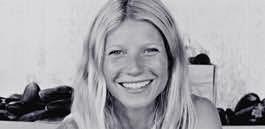
THE BOOK: After Gwyneth Paltrow was told she was anemic and vitamin D–deficient, she did what anyone would do: She wrote a cookbook. It’s All Good features 185 dairy-, sugar-, soy- and gluten-free recipes for those dealing with dietary shortcomings.
YOUR TALKING POINT: Paltrow denied assertions that she used a ghostwriter for her 2011 tome, My Father’s Daughter. This time around, Julia Turshen, who worked on both books, is credited on the cover.



THE PLAY: An adaptation of Roald Dahl’s beloved Matilda comes to the Great White Way after a wellreviewed run in the West End. Hopes are high for the story of a brilliant young girl up against dim parents and a sinister schoolmarm. Watch your back, Annie.
YOUR TALKING POINT: Dahl, who died in 1990, was rumored to be disappointed with 1971’s Willy Wonka & the Chocolate Factory and is said to have called the 1990 film version of his The Witches “utterly appalling.”


“The things I choose for my home really matter. That’s why my home is a
”




“Ican’t believe you can’t say tits on PBS.”
These are basically the fi rst words that spill out of Josh Groban’s mouth as he sits down at the hip Tribeca watering hole Tiny’s to talk about his new album. He’s telling a story about performing in a televised tribute to Marvin Hamlisch and his amusement over a censored lyric. It’s an unexpected introduction to the favorite heartthrob of housewives everywhere. Or then again, maybe it’s not. Because as the evening progresses, a suspicion is confi rmed: This opera boy’s public persona couldn’t be further from his real-life game.

Groban is that rare artist who is as welcome at Lincoln Center as at Rick Rubin’s house, as likely to sing a duet with Barbra Streisand as to appear in a skit on Jimmy Kimmel Live (where he m emorably set Kanye West’s absurdist tweets to music: “I make awesome decisions in bike stores.”). Groban’s latest record, All That Echoes (released last month), was produced by Rob Cavallo—better known for his work with hardcharging bands like Green Day and My Chemical Romance than with baritones. Ask Groban where he met Cavallo, and he’ll tell you slyly: “At a dinner party at Kid Rock’s place…as you do.”

The Book of Groban started when he was discovered as a teenager by the producer David Foster, who sent him to fi ll in for an ailing Andrea Bocelli at a rehearsal with Céline Dion for the 1999 Grammy Awards. Rosie O’Donnell happened to be in the room and booked him for her show, and he became a “popera” sensation overnight. Groban has since s old more than 25 million albums worldwide, earning the enduring love of the Obama White House, Gayle King and a legion of rapture-ready fans calling themselves “Grobanites.” But if you’ve been paying close attention, you’ve seen glimpses of that other Josh Groban in the wings all along. You know, the smart comedy nerd and undercover ladies’ man who dated Mad Men’s January Jones for three years and weathered a rumored dalliance with Katy Perry (though neither has ever gone on the record about it). And while music remains his fi rst love, he’s


been making serious inroads in Hollywood, too, meeting with David Letterman’s company, Worldwide Pants, about collaborating on a daytime talk show (their idea) and playing Emma Stone’s douchebag boyfriend in Crazy, Stupid, Love.
Regarding acting, he says with a smile, there’s often some push-back from casting directors. “I’m always the long shot. I walk in there and they go, ‘We played your song at my mom’s funeral. Now make us laugh.’ ” He’s happy to play the fool—he fi nds the Twitter account “Josh Groban’s Hair” to be ridiculous fun—but rest assured, he’s in on the joke.
The perception of him as a “classical crossover” is a very real obstacle, and one that makes him bristle. Sitting in a corner table upstairs at Tiny’s, a spot he’s visited en ough that he suggests ordering the duck duo, Groban explains: “I hate the word popera People assume if there’s an orchestra, it’s not for them. Or that it’s stuffy and the personalities behind it must go home and think how great their music is and how everything else is beneath them.” Being shoved into a box that doesn’t quite fit clearly rankles him. “The main misconception,” he says above the restaurant’s alt-rock sound track, “is that I’m not a normal 32-year-old guy.” When pressed for proof, he runs through a litany of “unlikely” happenings in his life. Like the time he and Flea of the Red Hot Chili Peppers collaborated on a duet of “Ave Maria.” Or how he wrote a “party anthem” for hard-core rocker Andrew W.K. O r how Mindy Kaling reached out via Twitter to offer him a guest spot on The Offi ce Or what the vibe is like at Kid Rock’s epic dinner parties. “He’ll invite a teacher he met in Brooklyn, then someone from the Beastie Boys, a professor and me. We’ll all sit at this long table and have political conversations. Then we’ll get drunk and dance on his stripper pole.”
Groban isn’t fronting for a writer’s benefit. He’s just proud of the eclectic world he’s made while swimming upstream in an industry that’s seen healthier days. His latest album is a stab at amping up the slumbering genre he’s been shoehorned into. “The genre’s become almost like spa music,” he says. “It’s almost New Age. It’s lacking a rhythm.” Not so on this disc. Recorded at Ocean Way studios on Sunset Boulevard—where Green Day recorded American Idiot All That Echoes is a mash-up of sweeping ballads (“E Ti Prometerro”), SoulCycleready guilty pleasures (“Brave”) and emotionally executed covers (“Falling Slowly,” from Once). The recording process had a throw-everything-at-thewall approach, with Groban playing drums on a redo of Stevie Wonder’s “I Believe (When I Fall in Love It Will Be Forever)” and covering an obscure track by a Danish indie band, Choir of Young Believers. It was also a damn good time.
“The cool thing about working in one studio space every day is that lots of people wind up coming in,” he says. “Who’s next door? Oh, i t’s like, Bone Thugs-N-Harmony. Or the remaining members of the Wu-Tang Clan.” Groban’s 7-year-old Wheaten terrier, Sweeney, would wander down the hallways exploring the other studios. “He’d come back and his fur would stink of marijuana,” Groban says. “Some rapper would come in and be like, ‘Yo, whose dog is this? He’s adorable!’ ”
The album isn’t just a return to form; it’s also highly confessional. Groban says songwriting is “better than therapy,” and gossip columnists would be wise to listen to “False Alarms,” a strings-heavy ballad about a love gone wrong. “There’s nothing worse in a relationship than realizing you’re more

invested than the other person and you have to let it go. It’s that old saying: When y ou squeeze the sand in your hand and it all falls out…” He declines to say exactly whom the song is about, but it’s a safe bet that we’d recognize her. “She will remain nameless publicly,” he says, standing firm. And he admits the ex in question doesn’t know the song is coming. “I do it Taylor Swift–style,” he says. “I like to surprise them with it.”
Still, Groban acknowledges that as he gets older, his mother has been pestering him to settle down. “How quickly the time passes between the requests ‘Please don’t get her pregnant’ and ‘When are you going to give me a baby?’ My parents take that energy out on my dog. He’s the grand-puppy.”
The artist might not be on the doorstep of fatherhood, but he’s certainly taking a real stab at happiness. Three years ago, he packed up and moved from Los Angeles to New York City, renting uptown before buying a loft in a converted d airy factory in Tribeca. “It was a series of breaking points,” he says. “The very thing that makes L.A. the perfect place for most people is the thing that makes me crazy. I don’t do very well with laid-back. I fester when I’m in Los Angeles. When I’m in New York, I focus on living in the present.” His New York love affair is at times predictable (Central Park, Bouchon Bakery), at times refreshingly nerdy (karaoke in Koreatown). “I do a mean Eddie Vedder,” he says of his sing-along nights. “Later, when everyone has gotten their food, it’s like, ‘You eat your nachos. Let me give you a 10-minute ‘November Rain.’ ”
It’s not a stretch to say that he’s entering a new phase of his career: He’s an established global brand, but he’s itching to color outside the lines and hopes fans will come with him. To that end, he’s completed a feature film, Coffee Town , written and directed by Arrested Development ’s Brad Copeland and produced by the CollegeHumor guys. Naturally, Groban plays a disgruntled barista, opposite Adrianne Palicki ( Friday Night Lights ). “There’s a scene where I piss in a cup of coffee,” he says. “I drop the F-bomb quite a few times.” And then there’s a proposed Broadway revival of the musical Chess in 2014; he meets with Tim Rice every couple of months to discuss the project. “We’re serious about it,” h e says.
When you’ve sung a duet with Céline Dion be-
“THE MAIN MISCONCEPTION IS THAT I’M NOT A NORMAL 32-YEAR-OLD GUY.”
Groban is single these days, but he’s open to set-ups. “I heard a phrase I really liked the other day,” he says. “Love should be a friendship on fire. That’s what it should be.” Apparently that wasn’t the case with January Jones; the two split in 2006—and before you ask, he’s not her child’s mystery baby daddy. “I’m pretty certain our breakup [and the child’s birth were] enough years apart that that wouldn’t be possible,” he says.
fore graduating from high school, you know YOLO. What Groban now seems to be, more than anything, is comfortable in his skin. “I started from such a place of uncertainty and insecurity as a terrified 17-year-old. I was a student and a pro at the same time. I was terrified to have a good time, terrified it was all going to go away. Honestly, I feel like I can take ownership of it and enjoy it.”
 Lingerie bra top with twist, $152, KARLA COLLETTO, karlacolletto. com. Solitaire drawstring bikini bottom, $88, VIOLET LAKE LONDON, violet-lake.com
Lingerie bra top with twist, $152, KARLA COLLETTO, karlacolletto. com. Solitaire drawstring bikini bottom, $88, VIOLET LAKE LONDON, violet-lake.com

Fearless in the Face oF public scrutiny and a hopeless romantic in a cynical age, everywoman Kim Kardashian is impossible to deFin e. her complex liFe brings to mind that oF a nother Fascinating woman—her icon, elizabeth tay lor. AlyssA Gi Acobbe asKs, is this Kim’s golden era? photographed by bruce w eber s tyled by deborah watson




My mother calls me to say that her Wednesdaymorning golf group is requesting a Skype call.
They’ve heard I’ve interviewed Kim Kardashian, and the ladies have a few questions.
Mostly, they’re concerned with how she looks: Is she really that pretty? Could I verify her eyelashes? What, if I had to guess, is the real-to-fake ratio of the hair on her head? They want to know why she decided on some see-through gray skirt she’s recently been photographed in, without underwear. They want to know if her “trunk,” their word, is as prodigious as it appears to be on television.
“Well, did she talk about Kane?” Mom demands.
“It’s Kanye,” I say, but she doesn’t really care and not only because this is a woman whose music collection consists of ABBA and Martina McBride, on CD. Although Kardashian’s love life is a steady topic of conversation—an Internet search for “Kim Kardashian boyfriend” generates more than 45 million results—she has long been the headliner of her relationships. The men in her life, even the famous ones, are largely an afterthought—at the very least, secondary to her hair, if you polled her multitude of fans. A recent photograph that Kardashian shared, for example, captioned “I cut bangs for real this time!,” solicited nearly 237,000 more “likes” than the one in which she revealed her relationship with rapper/singer Kanye West, her first boyfriend since the widely publicized divorce.
In the five years since the debut of Keeping Up with the Kardashians, the flagship of the ever-expanding network of reality shows starring Kim Kardashian and her family, she has become an object of undeniable fascination, an American phenomenon, perpetual headline news. People love her or they hate her—Jimmy Kimmel once described her as a national
threat; Jon Hamm said something much worse—but seemingly everyone follows her in some way, at entirely unprecedented levels. Even Jerry Stiller and Anne Meara have a Kardashian-inspired comedy bit. “If the United States had a royal family,” went a question on a recent episode of Family Feud, “who would it be?” The Kardashians came in fifth, following the names Kennedy, Obama, Bush and Clinton.
“Kim truly represents a new sort of American,” says Janice Min, editorial director of The Hollywood Reporter “She’s post-racial and incredibly modern and intangibly alluring to a whole range of people. When my baby was born, my nurse flew from New York to L.A. to help, and the first thing she wanted to know when I picked her up at the airport was, Do you live near the Kardashians?” If her success often vexes people, says Min, it’s because she’s made it look so effortless. “There are millions of people in Hollywood who should be interesting, but aren’t, and the fact that Kim made it big through reality TV annoys many,” says Min. “But what if your talent is just being irresistible on TV? The public can sneer, but the fact is that this is the medium all people can relate to, and do.”
Of Kourtney, Kim and Khloé Kardashian, the three sisters who form the focus of the shows, Kim, the 32-year-old middle, is the most popular, or at least the most paid-attention to, something she works to maintain. She’s in Twitter’s top 10 and has more followers than any other user on the photo-sharing site Instagram, where she posts daily shots of her nails, her shoes and what’s for lunch as well as the occasional inspirational aphorism, such as, Maybe you should eat makeup so you can try and be pretty on the inside, bitch “When you live your life so publicly, like on a reality show, people assume that they know every side of you already,” Kardashian says when we meet in Miami in January. “But they always want more.” She obliges. When the cameras are rolling, they’re really rolling; the sisters don’t even remove their
microphones to pee. An early episode of the recent season of Kourtney and Kim Take Miami featured a scene in which Kim slathers her legs with Kourtney’s breast milk in an effort to cure her psoriasis.
“Doing a TV show with your family, it’s really hard to hide or be guarded,” she says. But really, the thinking is far more genius—and purposeful: By inviting viewers into her life in such an all-access way, she has provided their most unrestricted entrée into Hollywood to date. “Besides,” she adds, “we don’t want to film a show if we can’t be who we are, because that’s just too much work.” The shows’ relationships and personalities are convincing even when the situations seem contrived; she says most fans tell her they like KUWTK because it reminds them of their own family in some way. On-screen, she emits an appeal that’s particularly wide-ranging, with qualities that combine to form what Min would call “her X factor, her secret sauce.” She is at once very serious and very funny. She tries to do the right thing, though it doesn’t necessarily always work out, which helps keep fans on her side. She is almost cartoonishly beautiful and sometimes makes questionable fashion choices. She talks of dieting and her gym addiction one day, and professes her love for Golden Oreos the next. And she is an unapologetic workaholic who isn’t afraid to admit that there’s also something really appealing in the idea of falling in love and living happily ever after. In this way, she is not so unlike her personal icon, Elizabeth Taylor (whose public image was, of course, similarly polarizing). But as Roddy McDowall once said of Taylor, his friend and co-star, “People who damn her wish to hell they could do what they think she does.” And so it goes with Kardashian.
Br uce Weber, who photographed Kardashian for DuJour at his home in Miami, says it was Kim’s complexities that drew him to her, and that her similarities to Taylor inspired much of the story. “I didn’t know Kim loved Elizabeth Taylor before we met, but I imagined


she would,” says Weber, who regarded Taylor as a close friend. “The great thing about Kim is that she’s so strong and independent, but she also makes you want to take care of her. Working with her made me really miss Elizabeth.”
Five days after West announces to an Atlantic City audience—and, thus, the world—that Kardashian is pregnant with his child, she is on the couch at her friend Loren Ridinger’s Miami house, giving herself a manicure. She’s flown in from a paid appearance in Calgary by way of Houston, a 12-hour travel day she made, threemonths pregnant, in a pair of brand-new five-inch tan suede Jimmy Choo pointy-toe stilettos and full makeup. She says she does not wear flats, not ever, unless she’s on the treadmill; tomorrow at 8 a.m. she will show up at the photo shoot wearing a pair of Lanvin track pants and Tom Ford platform suede boots, with fringe.
In her everyday life, Kardashian says she wears formfitting clothes less out of a desire to look sexy than to dress for type; she loves fashion but favors what she thinks is flattering, for which she has been called, at turns, “the sparkly showgirl” and “Princess Leia gone wrong.” The barbs don’t bother her and, in fact, she’s even called herself out on a few fashion misses, like a boxy canary-yellow jacket, about which she wrote on her blog, “Where were my sisters or my boyfriend when I needed a good opinion?! LOL.”
“I think because I have big boobs it could make me look heavier if I don’t, like, show off my waist or something, so I just have kind of learned to dress one way only,” she says. “Khloé can wear flowy, pretty things because she’s really tall. Kourtney is, like, really little. I’m just kind of in between, so it doesn’t really work.”
The manicurist has forgotten the right shade of nude. While she’s off at Walgreens, Kardashian wastes no time sitting around and begins to clip and file her nails herself. She thinks she knows how to remove the semipermanent shellac nail polish, so she swabs some sort of solution she finds in the manicurist’s kit across her toes
and wraps them in tinfoil. “I used to have to do this myself all the time, manicures and whatnot,” she says. “I actually like it. It’s sort of like meditation.”
West’s announcement wasn’t exactly planned but, Kardashian says, was a nice surprise, as was the pregnancy itself. Doctors had told her that, like her sister Khloé, she would have a difficult time conceiving. “I just feel so blessed and excited and ready for the next phase,” she says, noting that 2012 was not her best year, and she’s grateful it’s over, even if her brief marriage to professional basketball player Kris Humphries technically is not. Humphries has refused to sign divorce papers; he’s suing her for an annulment instead, claiming Kardashian orchestrated the wedding as a moneymaking PR stunt, which she says it wasn’t—that is, either a PR stunt or, after expenses, particularly moneymaking. She and her sisters spent most of January publicizing the new season of Kourtney and Kim good-humoredly delivering the following line to talk-show hosts: “If it were for PR, she might have married someone people had heard of!” She’s annoyed she’ll likely have to appear in court to get divorced while many months pregnant.
Otherwise, she says evenly, pregnancy has so far been no big deal. She’s had no morning sickness, no cravings, no fatigue. She says she rarely drinks alcohol anyway—although in a recent episode of Kourtney and Kim she does get drunk and forget where she left her new kitten. “I don’t even like champagne,” she says, noting that not having to spend her twenties hungover allowed her to be very productive. Back when she was 15, her father, Robert, taught her two things: the importance of a strong work ethic and to drive, so that she could take over when Kourtney and her friends partied too hard. Kardashian says she liked being the good girl. As close friend and designer Rachel Roy says, “Kim has very nurturing, calm and fair qualities about her. And her work ethic is like no other.”
Now, since she’s had to forgo her Diet Coke, her worst vice is the occasional iced tea. “I used to always say I can’t wait to get pregnant because I will just eat
whatever I want, but it’s completely different,” she says as she makes her way through an apple pastry. “I’m like, OK, I want to eat as healthy as possible. Though lately I’ve been watching shows like I’m Pregnant and Addicted to Meth It definitely makes me feel better if I’m wanting one sip of Diet Coke or, you know, too much sugar. I’m like, This woman is on meth.” She loves reallife murder mysteries and cop shows and says in another life she’d be a crime-scene investigator.
She and West have been dating since April, though they have been friends for many years. But, she says politely, tucking her foil-wrapped feet beneath her, she doesn’t really want to talk about him. She won’t even refer to him by name. “My boyfriend has taught me a lot about privacy,” she says. “I’m ready to be a little less open about some things, like my relationships. I’m realizing everyone doesn’t need to know everything. I’m shifting my priorities.” She’s started to be more selective when fans ask for her photograph in airports or when out to dinner, especially when she’s with West. “I just tell them, sorry, but my boyfriend won’t let me,” she says. West has not been interested in co-starring on any of his girlfriend’s shows, though he made the occasional appearance on last season’s Keeping Up With the Kardashians, in which he’s seen giving Kardashian’s closet a makeover, weeding out anything too bright, too tight or too shearling, and then selling it on eBay. Kardashian says that the upcoming season of KUWTK, which began filming last month, will not include any explicit “baby stuff,” including doctor appointments, prebaby shopping or giving birth, but she can’t say for certain whether West will appear or not. “We haven’t really gotten that far yet,” she says.
Certainly, Kardashian has reason to limit the amount of airtime her love life gets. Having to watch the demise of her relationship with Humphries play out and see herself cry all the time on TV was upsetting, and she didn’t think the public backlash she faced was fair, either. “Going through a divorce for anybody is devastating and heartbreaking, and then to have to do it and feel


This page: Printed beach towels, price upon request, HERMÈS, 212-751-3181. Floral headdress by Eloise Corr Danch.
Opposite page: Basket weave belted cardigan, $1,250, TSE , tsecashmere.com
Bracelet with 18-karat rose-gold and diamond pavé beads, $42,913, SHAMBALLA JEWELS, vaultworldwide.com

like you have to explain what is happening is such an awkward thing,” she says. “You have to explain your choice to millions of people, and then they’re disappointed. I’m disappointed. Why are they disappointed?” (Khloé says, “Kim never had to endure any bullying in her younger years. I think to be thrown into a lion’s den with everybody attacking her really hit her hard. It was very painful.”)
And yet the fact that her humiliation and heartbreak played out on such a public stage has also earned Kardashian a unique sort of adulation. Like Elizabeth Taylor, she is a hopeless romantic, and her willingness to love, and fail, and love again makes for compelling celebrity. “Kimberly believes in fairy tales,” says K hloé. “It’s the best part about her.” Adds Roy, “Kim loves very strong and very hard. What would break many, she pushes through with grace and dignity.” When we look back on Kardashian 40 years from now, perhaps her greatest legacy will lie in that fact: She really can’t be kept down, at least not for long.
“When the Kardashian hype first started, people said, This will be over soon,” says Min. “When her 72-day marriage ended, people said she was through. But Kim perseveres. She actually came back bigger. One day, there will be academic courses taught on the topic of Kim Kardashian.”
The morning after the manicure, I arrive to the shoot to find Kardashian enmeshed in a Twitter exchange with a disenchanted fan.
“She keeps saying I’ve changed,” Kardashian says frustratedly, without looking up from her phone. “She says I’m a snob. She’s calling me all these names.” She doesn’t get it, but she won’t drop it, either, as if she can’t let it go until she’s convincingly pleaded her case. (Second to crime-scene investigator in her list of other life careers, says Kardashian, she’d have been a lawyer, like her dad.) An hour later, she’s still going back and forth with the girl, whom she’s never met nor likely ever will. She thinks she may live in the Middle East.
Since she was a kid, Kardashian has always cared what people thought of her. This constant need for approval has made her likable to millions of women who feel the same way—but it’s also helped fuel her brand. She is the rare star who asks for fan feedback and then actually takes it. She’ll ask her Twitter followers, all 17 million of them, what they want her perfume to smell like, what nail-polish colors they love, what they think of a certain shade of lipstick from her new makeup line. This may be one reason that although her face and name have proved themselves powerful sales tools—she’s branded everything from cellphones to diet pills and has appeared on enough magazine covers to wallpaper an entire room of her house, and not just theoretically— she’s still trying to finesse high fashion, an industry not especially interested in the notion of crowd sourcing, even if she does move product. As UK designer Roland Mouret noted, he’s more likely to get orders on a dress that Kardashian’s worn than, say, Kate Middleton.
But she is trying. In the last year, Kardashian’s clothing choices have become more streamlined and classic. The wild patterns and plunging necklines that made her an easy target for sartorial snobbery have been replaced by tailored blazers and pants and feminine dresses in blacks, grays, whites and neutral tones, not to mention a sophisticated black crocodile Birkin. Exceptions are made, of course, like for the $6,000 calf-leather-andpearl booties designed by West that Kardashian wore not long after telling the ladies of The View that she was chasing “a simpler life” of staying home and cooking in. Though she started out as a wardrobe stylist before opening the first location of Dash, the sisters’ chain of clothing boutiques, Kardashian has stopped styling herself. In recent months, Mugler creative director Nicola Formichetti has worked with Kardashian to help her recreate her image and use clothes to capitalize on her relatability. “I think she is so fucking hot,” he’s said. “She isn’t just a pin; she is much more sexy. Kim represents a very important woman now. We know everything about her; I am really into her.”
Though there are now three locations of Dash, the store has largely become a tourist attraction and a branding tool. There are still clothes—midpriced contemporary lines, mainly, “California casual” stuff the sisters wore back before they became the brand themselves. But there’s also $10 bottled water featuring the sisters on the label and a line to get in. Kim and her sisters don’t get there much anymore. “I love styling, so I would love putting outfits together and seeing someone come out of the dressing room and really feeling good about herself,” she says. “I miss that. Back when we started, we were painting the walls and I was doing the register, and that was a fun time for us. But now when we go in the store, we take away from the customers’ experience. It becomes about, you know, just something else.”
The family has signed on for two more seasons of KUWTK—season 8 began filming in February and will premiere in June. The show, Kardashian says, has been “truly, the best family movie ever,” even when she’d rather not replay some of the scenes. And she’s not talking just about those with the exes in her life. In the second episode of this season’s Kourtney and Kim, for example, which aired three weeks after she announced she’s expecting but was filmed long before, she calls older sister Kourtney, a mother of two, a “slob kebob” and says that she’d “die” if she had children right now. “If you knew how boring you’d become,” Kim asks her sister, “would you still have had kids?” After season 9, she says, she’s done.
But, as always, she makes no apologies—or promises. Today, she says season 9 will be the last, but a branding superstar like Kardashian doesn’t ensure longevity by being inflexible. “I think there’s always an evolution of, you know, what you want to do in life,” she says. “It’s all about finding things that really excite you and motivate you and spark you all over again. I’m realizing that no matter what, if you go into something with all these expectations and plans, once you’re actually living it, it could be completely different.” And that, in fact, it probably is.





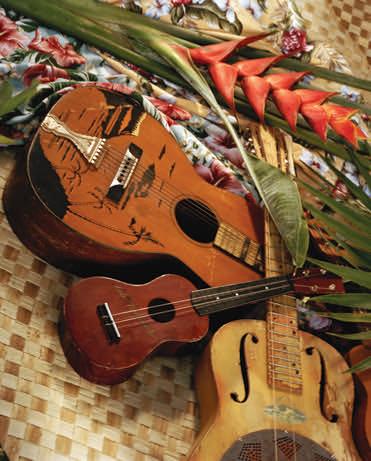


Long silk slip, $715, OLATZ , olatz.com. For full fashion details, visit dujour.com. Hair: z aiya Latt at Bryan Bantry. Makeup: Regine Thorre at 1 + 1 Management. Production Coordinator: Dawn Boller. Prop Stylist: Dimitri Levas.



born from a dream and fought over for years, a deeply secluded caribbean community is now finally getting a second chance to come to life
w ritten by george epa minondas photographed by douglas f ri edman
In the daisy chain of glittering Caribbean islands known as the Grenadines, Bequia is something of a tropical wallflower. To its north lies Saint Vincent, a bustling resort destination where one of the Pirates of the Caribbean movies was filmed. To the south is Mustique, the orchidaceous getaway beloved by rock stars, royals and the international jet set. Bequia (pronounced Beck-way) has no hotel chains, golf courses or Nobu. It possesses only powdery beaches, sylvan glades and a blissfully indolent ambience. But Bequia does have at least one well-known landmark to call its own: Moonhole, a private residential community situated on the island’s southern tip. The story of Moonhole is as thorny, tangled and convoluted as the scrub-covered slopes from which it springs. It is
the tale of paradise found, paradise lost and, recently, paradise regained. Most of all, Moonhole confirms Jean-Paul Sartre’s sly assessment that “hell is other people.”
Glimpsed from the sea, Moonhole resembles a crumbling city engineered by the indigenous peoples of the Caribbean. On closer examination, the original structure, perched under an enormous stone arch, could be a Gothic fortress conceived by The Hobbit director Peter Jackson. In fact, the community comprises 17 singular homes that were constructed between the late 1960s and the early 1980s. The free-form, Gaudi-like dwellings, connected by steep staircases, sprout from the rocky terrain like wild mushrooms. Long before environmental architecture became
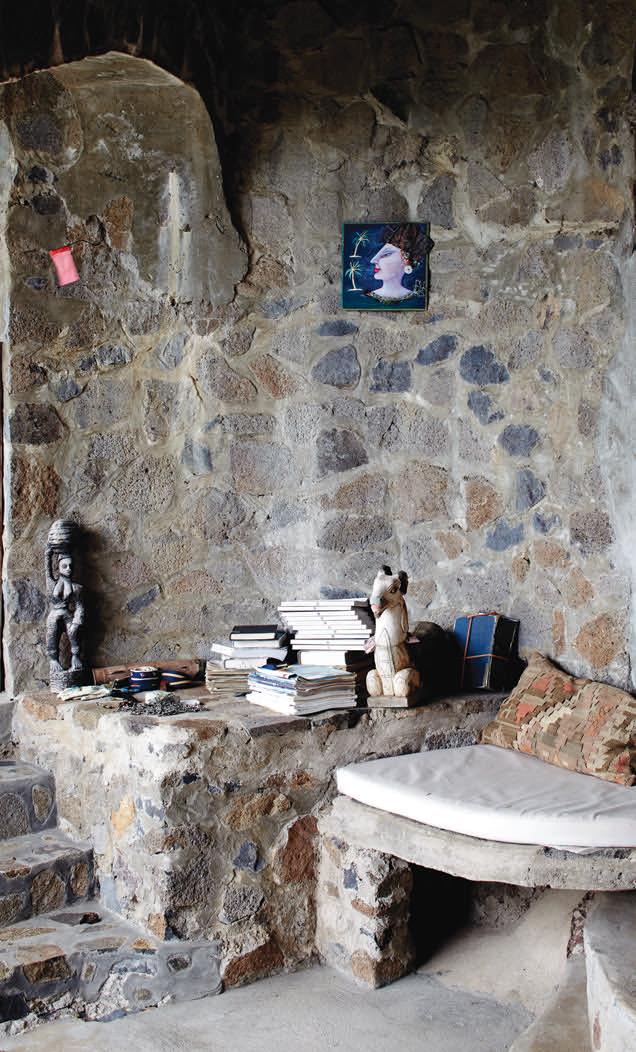
a movement, Moonhole championed the idea of living as one with nature. Building materials include volcanic rock, native cedar and South American hardwoods, as well as whale bones, driftwood and shells for quirky embellishments. The houses are open to the elements, boast spectacular sea views and are powered mostly by propane gas. The absence of electricity, WiFi and running water—rainwater is stored in cisterns for bathing and washing— lends Moonhole an idyllic charm.
The idea for Moonhole was hatched by Tom Johnston, a khaki-clad iconoclast, and Gladys Johnston, his ever-diligent wife. Tom, an advertising executive from Chicago, was so enamored of Bequia’s uninhabitable western promontory that he bought the entire 30-acre tract in the 1960s. With no formal training a s an architect and an aversion to straight lines, he enlisted local masons to realize his eccentric ideas, which included rooms with three walls, a bar fashioned from a humpback whale’s jawbone and interiors assembled around trees. When his discerning friends requested homes on Bequia, he produced those, too. He dubbed the community “Moonhole,” using the Bequian name for the tremendous rock formation framing the original house. After Johnston died in 2001, he bequeathed his controlling interest in the Moonhole Company to a trust for the protection and preservation of the property. “He wanted to keep it as a secluded retreat for writers, artists, friends and people who could appreciate getting away from it all,” says Carroll Rooth, a Moonhole resident since 1972.
Yet for most of the last decade, it seemed that Moonhole was in danger of being eclipsed. The sun-dappled serenity that the Johnstons worked so assiduously to create became clouded by external threats, litigation and neglect.
On an island where whaling is still legally sanctioned, the Moonholers began hurling harpoons at one another. As several owners vied for control, and the number of devoted staff dwindled, some of the homes were abandoned and left to decay. Picture Grey Gardens relocated to the Grenadines, with iguanas and manicous standing in for cats. The biggest challenge to the property came from Jim Johnston, one of the founders’ sons, who contested his father’s will i n a Caribbean court.
“We went through nine years of entropy,” says Amos Eno, one of the trustees. Three years ago, the court ruled in favor of the trust. Since then, Moonhole’s most dedicated residents have returned to restore the settlement to its former glory and retain the loyal Bequian
Left: Moonhole houses are filled with nooks and crannies, such as this reading perch off a staircase.

staff, many of whom have worked there for more than 20 years. Several of the homes have been spruced up and made available for weekly rentals. The grounds were cleared and replanted with indigenous trees; trustees work to protect the nesting turtles, iguanas and birds.
To outsiders, the travails of Moonhole might seem like a tempest in a teapot. But those on the inside believe it’s imperative to keep the Johnstons’ quixotic vision afloat. “The place has undergone a generational shift,” says Robert Rooth, a trustee. “In many cases the original owners have passed away or become too elderly to visit, and the next generation haven’t taken up the interest in staying there.” Indeed, five of the Moonhole houses a re for sale—their asking prices range from $300,000 to $1.2 million—and several of them remain in a shambolic state. But there is tension among the homeowners as some refuse to contribute to the cost of upkeep, while others have altered their abodes in a manner that brazenly flouts the Johnstons’ original manifesto, with such things as gaudy tile and paint color. Another nettlesome issue is the constant stream of rubberneckers who willfully trespass on the private property, until they are escorted off by security. As for the original house, it has been off-limits ever since massive boulders from the arch became dislodged and plummeted though its roof.
If you believe that this all sounds like ideal





fodder for a gripping book, you might be cheered to learn that one owner, architect Charles Brewer, will soon release his version of events at Moonhole. News of the forthcoming tome has inspired cocked eyebrows among some of his fellow residents. “He should really consider getting a ghostwriter,” says one.
Trustee Amos Eno says Brewer “was there taking pictures during the time of the lawsuit, when legally we had no control over what he was doing.” Considering the fate of the prototype house, which has become a symbol for all the animosity, Brewer should probably subtitle his book “People Who Live in Stone Houses Shouldn’t Throw Stones.”
Despite all the Sturm und Drang, Moonhole endures as an eco pa radise, a Zen retreat and an architectural gem. The homes, which front a postcard-perfect beach on one side and a cobalthued bay on the other, are a bravura display of design ingenuity. They’re a unique fusion of cozy cave and playful tree house, equal parts Flintstones and Gilligan’s Island , set on an untouched wildlife sanctuary. Johnston’s contextual buildings mirror the sinuous lines of the island and the majestic vistas of the peninsula. “One time masons were putting up a wall for a house and Tom asked the voluptuous housekeeper to come out of the kitchen,” remembers Carroll Rooth. “He had her lie down on the floor on her side; he backed all the men up and sa id, ‘Look at the curve of her hips and how that echoes the hillside in the background. That’s what I want.’”
175
Opposite page: A sink carved out of natural rock, following the builder’s ideals. Top left: A wood-framed bed with mosquito netting inside Eclipse house, open to the elements. Bottom left: A view from Kow-Ga-Peh, the highest point on Moonhole. Top right: The sign in front of a condemned house.
“I’m not one of those people in Beverly Hills who wants a Picasso here and a Monet there,” says Jackie Collins, the best-selling author whose latest book, The Power Trip , is out now. “It doesn’t visually stimulate me.” What does excite Collins is this portrait (above) from the 1980s, the decade in which she wrote her wildly successful novel Hollywood Wives “I have a few portraits of myself, but they’re hidden,” she says. “It’s kind of campy, you know?”
It’s fitting that fashion icon Michael Kors’ prized portrait (opposite) was done by another sartorial star, illustrator and designer Michael Vollbracht. “I fell in love with his illustrations as a fashion-crazed teenager,” Kors says. This picture, a gift from Kors’ husband, Lance LePere, shows the masterful hand that landed Vollbracht as an illustrator at Henri Bendel and Bloomingdale’s. Kors notes his astounding eye, saying, “He captured the moody side of me perfectly.”




“Being painted is different from being photographed,” Christy Turlington Burns says, and she would know. The supermodel-philanthropist appreciates the collaboration that goes into a portrait like this one (opposite), which hangs in her Manhattan home. “There’s more time to talk throughout the process,” she says. “I think it feels like the essence of who I was at that particular moment in time.”
“a lot of artists tend to accentuate the glamorous,” d ia ne von Furstenberg, the decidedly dazzling designer, says. “But a nh is very probing, honest and forthcoming in her work, which I love. I think she captured my vulnerability.” Von Furstenberg liked the portrait (above left) so much that she hung it in her new york headquarters.
While his wife, s te phanie s ey mour, has inspired works by artists including Maurizio Cattelan, media mogul Peter Brant isn’t as open to having his portrait done. sti ll, he was won over by this wax statue (above right), created by urs Fischer for a 2010 show at the Brant Foundation a rt stu dy Center. “It was important to urs a nd to the show,” Brant says.
s oon after s al man r us hdie relocated to new yor k from London, his friend Francesco Clemente, the Italian artist, painted this portrait (at left). “I used to joke that it was too gloomy—I’m not that gloomy,” says the author and intellectual. “But that’s how Clemente saw me that day. His later portraits of me seem to have cheered up.”
V on F urs T en B erg: W ang x I ang, P a C e ga LL ery B e IJI ng © 2011. B ran T : © u rs F I s CH er; P H o T o: sT e F an a LT en B urger. rus H d I e: C our T esy o F TH e C o LL e CTI on o F sa LM an rus H d I e.

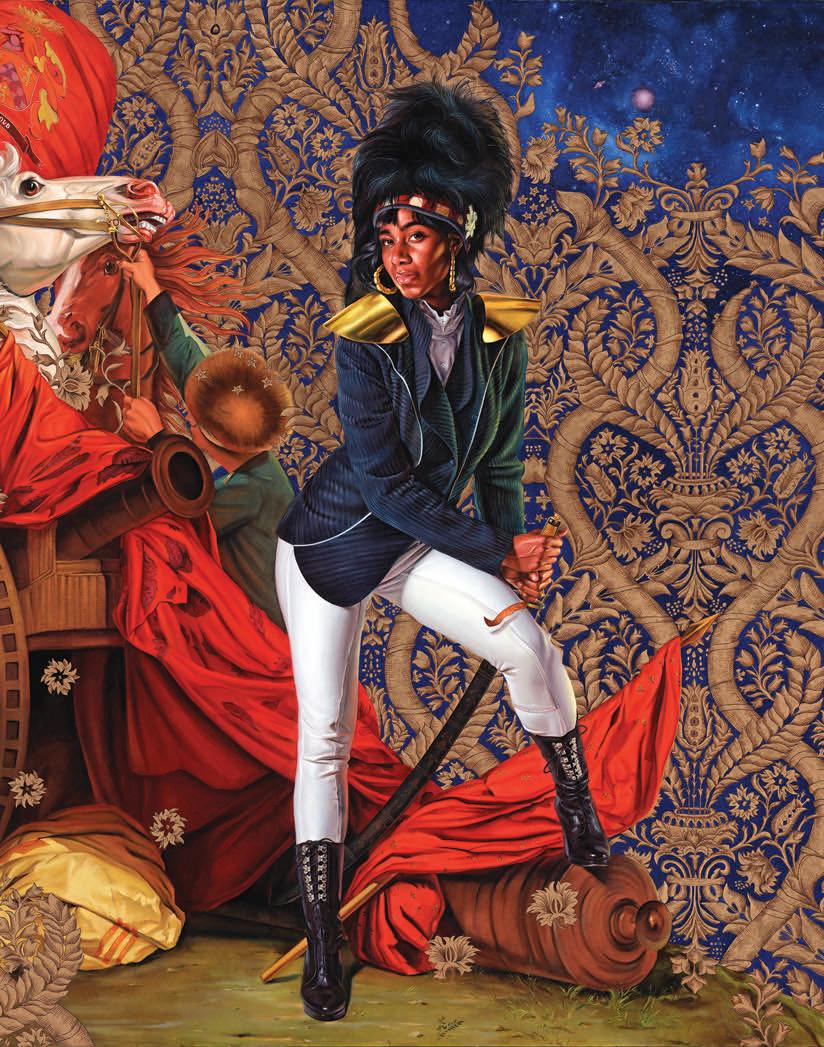



s anti W hite, who performs as s an tigold, wanted to revisit iconic collaborations between musicians and artists—like a nd y Warhol and the Velvet und erground—for the cover of her 2012 album, Master of My Make-Believe (opposite). “Kehinde is one of the most relevant painters of our time, so I reached out,” she says. “He nailed it. I could look at it all day.”
d apper Italian marketing man (and Fiat heir) Lapo elk ann insists one of his prized possessions is made of denim. “It was a total surprise, organized by a close friend of mine,” elk ann says of the piece (above right) by Ian Berry, a.k.a. d en imu, whose medium is the fabric. The portrait made such an impression that elk ann installed it over his desk.
a s a child, Paris Hilton was inspired by films depicting grand mansions with portraits hanging above the stairs. “I always said that when I bought a house, I would do that,” Hilton, who runs 42 eponymous boutiques, recalls. This painting (above left) now hangs in her Los a ngeles home. “I love that I look so proper, refined and elegant,” she says.
“Very few people can paint me,” says film critic r ex r ee d, “but he got the youth, the petulance, the ennui.” ree d must have been particularly inspiring, as Bryan o rg an is said to rarely paint a me ricans—and he offered to do this one (at left) for free.































Oplummet another 500 points
SELF-MADE MULTIMILLIONAIRE DOUG VON ALLMEN EARNED A FORTUNE THROUGH INGENUITY AND HARD WORK. AS A REWARD, HE COMMISSIONED THE $37 MILLION YACHT OF HIS DREAMS—ONLY TO BE HIT BY UNIMAGINABLE STORMS. HOW HE WEATHERED THOSE CRISES AND SURVIVED TO SAIL AGAIN
day the stock market would and the financial world as everyone knew it imploded—Doug Von Allmen was having a meeting about his
a gold standard for ocean liners. Marshall thought it could be the centerpiece of the way, wrapped around the grand staircase.

Linda ’s main entry-

That morning, as the meltdown was happening litermostly making and
yacht-in-progress. It wasn’t just any old boat. Von Allmen, the son of a Kentucky milkman and 67 at the time, had amassed a fortune in the hundreds of millions of dollars, enough to not think twice about building a $37 million floating “work of art,” as he calls it, even though he already owned two luxury yachts. This one, the out, named for his wife of 23 years.
Lady Linda , would be a knock-

ally outside his panoramic windows, Von Allmen was mostly concerned with making sure the stairs wouldn’t “creak”—some steps on one of his boats creaked and that annoyed him, Knecht wrote. Assured the steps would be silent, they moved on to other matters of import. Such as the headboard in the master suite, which Marshall envisioned as a backlit panel of etched glass, with impressions of fi sh or birds, “maybe a peacock.” And the plans for the sky lounge on the top deck, which would have a grand piano.

At 8:30 that morning, Von Allmen gathered the yacht design team at his sprawling duplex on the 74th and 75th floors of the Time Warner Center, from which he could gaze over Central Park or, if he swiveled in his chair, take in the George Washington Bridge. “The view was so spectacular that it did not quite register as real,” noted G. Bruce Knecht, a former senior writer at the there to research his book, month), on the building of the to have much better material than he ever dreamed.
claring he needed a gin and tonic. In retrospect, they all should have had a drink.
The meeting ended near noon, with Marshall deall should have had a drink.
The story of the Lady Linda started out so simple. Von Allmen just wanted a new yacht. And damn it, the

Wall Street Journal, who was Grand Ambition (out this Linda— and was about , a carved, painted and gilded Normandie ,
Evan Marshall, the yacht designer, had flown in from London with a stack of renderings. Von Allmen and his wife were impressed with his idea to recreate The Chariot of Aurora relief that had graced the interior of the the French passenger ship built in 1935 that had set
Von Allmen just wanted a new yacht. And damn it, the man had worked hard for it. He’d come from nothing and earned millions by buying profitable companies and making them even more profitable. But one thing he couldn’t improve was the economy. While he was building the net worth and everyone else’s shrank, and panic set in. But unlike most people, Von Allmen isn’t the panicky type; in fact, his calm is astounding. Which kept him afloat not only through this financial storm but also another to come.


what to etch in glass, the economy was in freefall. “I usually have CNBC on,” Von Allmen says today,
“but I never have the sound on.” It wasn’t until the afternoon that he realized the market had taken a nose-dive. “And you know? It wasn’t a big deal with me,” recalls Von Allmen from his home in Florida in January. “I wasn’t in the stock market, per se, and I really didn’t think it would affect me. But it ended up it did.” He says this with a breezy nonchalance.
But a few days after that meeting, Von Allmen he began to say, ‘My God, 85 percent of my expenses Linda in Doug could extract, because he was also in financial

Von Allmen would soon add to his difficulties by cover would ePAULO
But a few days after that meeting, Von Allmen wasn’t so nonchalant, recalls Knecht, who had lunch with him to see how he was holding up. “That’s when he began to say, ‘My God, 85 percent of my expenses are boats’ and ‘I don’t know if I can afford it.’”
And with the bottoming out of the economy, Von Allmen also found himself in a morass of headaches with ’s construction. The yacht-building business was sinking, and his boat’s components were coming in late and way over the $37 million budget. Marshall recalls, “There was only so much leverage Doug could extract, because he was also in financial difficulties. There’s only so much you can pound your fist, and he’s not a fist-pounding sort of person anyway.”
and making them even more profitable. But one thing Lady Linda , the U.S. markets crashed, his and That day, as he and his wife fretted over creaks and the market,
Von Allmen would soon add to his difficulties by making a highly unusual investment, one he thought would solve his problems and help cover the boat’s ballooning costs. What he put his money in would turn out to be a Ponzi scheme—and a cagey one at that.

Von Allmen built a career on trusting his own judgment. He wasn’t a stock-market guy, and he wasn’t the type who valued other people’s opinions over his own. His fortune was amassed by his own shrewd instincts.



And it was against the odds. As a boy growing up in Louisville, Kentucky, he saw his father lose his job as a milkman. The family moved to Florida, where his father began selling reconditioned tires. Doug dropped out of school and got a job. Then when Doug was just 17, his father died at the age of 42. He and his mother moved back to Louisville where he finished high school and started working in a cardboard-box factory.
At that job, he realized he wanted more out of life.
“He told me how he came home and said to his mother, ‘I’m going to go to college,’” Linda recalls. “She said she didn’t know how he would do that, and he replied, ‘I don’t know either, but I’m going.’” With money his mother borrowed from a relative and through her own efforts (she took on a variety of jobs and as Doug likes to say, “she could save money even when there was no money to save”), he enrolled at the University of Kentucky, where he studied accounting and graduated second in his class.
(Thanks to a $5 million gift, the college’s School of Accountancy was named for him.)
Doug Von Allmen landed a job at a top accounting firm, where he heard about a client who’d borrowed money to purchase a business that he re-sold for a profit. Von Allmen thought that was a smart way to earn a living—plus, he could be his own boss. He hunted for small c ompanies to buy. Things went well until the recession of the early ’80s. He lost a fortune, and his first marriage fell apart.
He did, of course, rebound, financially and emotionally. In 1984, Doug was set up with Linda on a “blind lunch.” They were each divorced with kids (he had two; she had three). They both loved to dance. “One thing that was so endearing is he never picked me up for a date without bringing me a gift—like chocolates, a scarf or a card, things that took time and thought,” she says. They married in 1985.
Over the next two decades, he made canny and highly lucrative acquisitions, always of cash-cow companies that were doing fine but had, in his opinion, potential to do better. Every one of t he dozens of businesses he bought turned out to be a great investment, including a chain of sunglass stores that was sold to Sunglass Hut for $142 million in 1995. His biggest windfall came after he and his partners consolidated 20 professional beauty-supply distributors into one company that L’Oreal reportedly paid $400 million for in 2007. (He later called this sale “a mistake.” Why? Because, according to the self-made Von Allmen, “striving is a lot more fun than arriving.”) It was around this time that he commissioned the Lady Linda
Given his M.O. and his own background, it was both shocking and not-so-shocking that he’d be seduced by Scott Rothstein, a pushy, flamboyant attorney who moved into a house on the same street as the Von Allmens. The Bronx-born Rothstein, son of an “itinerant condom salesman” (yes, condom, not condo), made quite an impression when he relocated to the well-heeled part of Fort Lauderdale and opened a firm with 70 lawyers. His $6,000 suits, his ostrichskin boots, and his collections of pricey watches and cars (including two Rolls-Royces, three Ferraris and a Lamborghini) made him a character on the Intercoastal, as did the painting he hung in the lobby of his
opulent offices—of Al Pacino as Michael Corleone in The Godfather And then there was his new wife, Kimmie, a former bartender.
In many ways, the reticent and Southern-gentlemanly Von Allmen couldn’t have been more different from the in-your-face Rothstein. Still, both were staunch Republicans who donated heavily to their party’s candidates and they were car nuts. (Von Allmen keeps an Aston Martin and McLaren for street use and races a Porsche and Ferrari at the track—about this hobby, he likes to say, “I’m the oldest and the fastest.”)
Plus, Rothstein had a product to sell that was enticing in that post-crash time. What he was offering was brilliant in its simplicity and its audacity, and it was something that Von Allmen, who prided himself on grabbing the kinds of assets no one else had the wisdom or foresight to grab, could appreciate. What Rothstein, who bragged about handling sexual-harassment and workplace-discrimination suits, was “selling” were stakes in confidential settlements—multi-million-dollar settlements he’d acquired for clients and were to be paid out over time. Like lottery winners, some clients, he said, were willing to take a smaller amount up front, enabling “investors” to make an appealing but realistic 20-25 percent profit. Among the settlements he touted were those of women who’d allegedly been wronged by Jeffrey Epstein, a shady one-time friend of president Bill Clinton (further enticement to a Republican like Von Allmen). None of this was the least bit illegal. The only problem? There were no lawsuits and no settlements. However, there was a convincing paper trail of phony documents and statements created by Rothstein.
Von Allmen did his due diligence, hiring someone to scope out the firm and examine its records. He ended up putting $105 million of his diminishing fortune in Rot hstein’s plan in the spring of 2009. For him and his wife, the tip-off that something was wrong came when Linda ran into the lawyer at his favorite restaurant in late October 2009. Rothstein was at the bar nursing a martini. A large payment that the couple had been expecting from him had not arrived and, as Knecht wrote in Grand Ambition , she confronted him.
“Sorry, I’m having a bad day,” he replied.
Learning that federal agents were closing in on his Ponzi scheme, Rothstein fled to Morocco (chosen because it didn’t have an extradition treaty with the U.S.) on October 27 on a chartered Gulfstream jet, having wired $16 million there. Four days later, he sent a text to his law partners: “Sorry for letting you all down. I am a fool. I thought I could fix it, but got trapped by my ego and refusal to fail, and now all I have accomplished is hurting the people I love. Please take care of yourselves and please protect Kimmie. She knew nothing. Neither did she, nor any of you deserve what I did. I hope God allows me to see you on the other side. Love, Scott”
Persuaded by the authorities, he returned less than two weeks later. Rothstein had conned a total of $1.2 billion from individual investors and from hedge funds. In January 2010 he pled guilty to five federal counts of racketeering, money laundering and wire fraud and was sentenced to 50 years i n prison. Even though Rothstein’s con exceeded $1 billion, it received










scant attention in the media, dwarfed by the much vaster enterprise of Bernie Madoff.
Von Allmen, who says he was as shocked as anyone by the lawyer’s duplicity, recalls that he and Linda socialized with Scott and Kimmie “a little. We were probably out to dinner with them three times because they were in the neighborhood. He was normal one-on-one.” (The Von Allmens are in litigation over the scheme so are unable to comment further.)
Not long after the scandal broke on Halloween weekend 2009, Von Allmen spoke to Bob Norman, a Palm Beach blogger who followed the Rothstein case. “The amount of money [I lost] was substantial,” Von Allmen said. “It was an amount I wish I’d given to charity in stead of that investment.” However, he declared, “It won’t change my lifestyle that much, but it was a nice sum. I will still eat out at a restaurant every night—this is just something I need to get through.”
In another interview, he added, “All I can say is it’s a damn shame. This does nothing good for anybody. Hopefully everybody affected by this will still have a good life. They may not have as many toys.”
But to his team working on the Lady Linda , he was not so flip. Marshall remembers meeting with the couple after they’d just returned from a cruise to Fisher Island. On that trip, they learned that everything they’d invested with Rothstein was gone.
“As soon as they came in, I could s ee on their faces that something was wrong,” remembers Marshall. “Linda took me into the Great Room and said, ‘Evan, this weekend we got some extremely bad news of a financial nature, and it’s really just devastated us.’”
Doug suggested to Marshall that they keep an eye on the budget. Some changes were made— The Chariot of Aurora was scaled down to a painted mural, bringing the cost from $100,000 to around $15,000; the carpeting would be synthetic, not wool; and the sky lounge wouldn’t have a grand piano—but they weren’t that significant. Von Allmen, the pragmatic businessman, had decided to sell the boat after it was completed, and he realized the best way to sell the yacht was to b uild the most beautiful one he could.
What was most striking to Marshall and Knecht was that Von Allmen never lost his temper or his cool. Marshall had seen clients blow up over far less stressful events, like the wrong paint color. But Doug remained Zen-like. Knecht asked him how he was able to stay so composed: “And he said to me, ‘If you show people you’re angry, you allow them to control you.’”
Within weeks of the October 7 meeting, Von Allmen had put his Time Warner spread on the market for $18.45 million; it sold in 2011 for $15.7 million. (“I miss that apartment terribly!” Linda told me. “I loved it. But as Doug said, ‘You can go to New York any time you want, and it’s a lot cheaper not having that place.’”)
prices. Although nothing was inexpensive, the little signs had transformed the grand apartment into a kind of rarefied tag sale,” Knecht wrote. The table where they’d all sat for the design meeting was tagged for sale at $10,500. While Linda showed the pieces to appraisers and a housekeeper vacuumed, Knecht was sitting with his subject: “Doug Von Allmen said, ‘I have been poor and I’ve been what I guess you could call rich’—the milkman’s son was never comfortable using that word to describe himself— ‘and to tell you the truth, it’s easier to be poor than it is to be rich.’ Gesturing toward the housekeeper... he added, ‘When you’re poor you don’t need to have all these people around you all the time.’”
Linda Von Allmen says that one of her husband’s strengths is his ability to keep things in perspective. And Doug’s childhood is never so far behind.
While he admits to indulging in the best of everything—yachts, cars, shoes—he still has the thriftiness of someone who’s come from nothing. He’s a man who’s never once ran up credit-card debt in his life. “If I can afford it, I’m not frugal about things that I want. On the other hand, I get upset if somebody walks out of a room and leaves the light on.”
He is talking to me on this late January day from his bayfront home in Fort Lauderdale, where the Lady Linda is docked in his backyard.
“Oh, she’s absolutely beautiful, I’m looking at her now! She’s right behind my house!”
Von Allmen is remarkably chipper for a guy who’s been through so much. It helps, of course, that he recovered a portion of his losses from the Ponzi scheme through settlements from TD Bank.
But still, his beloved yacht is up for sale. After all the Sturm und Drang, isn’t he a little sad?
“Well…I’m not gonna be sad about not having two boats!”
He now has a 50 percent partner, automotive billionaire Roger Penske, in t he other yacht he still owns, the Linda Lou , now re-named the Lime Light This has cut his expenses significantly. (About the costs of maintaining a luxury yacht, Linda says, “it’s a bottomless pit”; in fact, a boat that size is estimated to drain up to $4 million to $5 million a year.) The Lime Light was also the boat for which he once received—and turned down—a $100 million offer. He’s gotta regret that, right?

“Nooo,” he says, chuckling. “I don’t regret anything in life. I mean, if I made one change...”
Yes? What would that be?
“If I made one little bitty change to my life, it may have resulted in me walking across the street and getting hit by a car, you know? So I don’t regret anything!”
We chat for a bit longer, and then Doug Von Allmen has to go. He’s leaving on a cruise—on the Lime Light , his half-a-boat. He and the real Linda will be sailing from Fort Lauderdale to Los Angeles.
The Von Allmens also sold much of the duplex’s contents. “Furniture, paintings, knickknacks—even garbage pails—were all labeled with detailed descriptions and
And not on the Lady Linda?
“Actually,” he admits, “we’ve never been overnight on that boat.”

Rosa crop biker jacket, $4,690, CHRISTOPHER KANE , openingceremony. us Ribbed turtleneck, $98, RALPH LAUREN BLUE LABEL , ralphlauren.com Leather hat, $55, DKNY, gypsysportny. com Leopard hoop earrings, $76,500, JACOB & CO., jacobandco.com Nemo ring, $11,200, and Fantasia ring, $8,400, ROBERTO COIN, robertocoinusa. com Mitza ring, $7,900, DIOR FINE JEWELRY, 800-929-3467.
Hilary rHoda, tHe ideal modern girl next door, sHows off some of spring’s most exciting looks and tells LINDSAY SILBERMAN tHe tale of Her rise to tHe top of tHe modeling Heap pHotograpH ed by tHomas wH iteside s tyled by lester garcia

Jacket, $4,990, THE ROW, Bergdorf Goodman, 212-753-7300. Ruffle bralet, $770, J.W. ANDERSON, openingceremony.us Vulcano earrings, $11,400, ROBERTO COIN, robertocoinusa.com Simona collar, price upon request, MARINA B, marinab.com Diamond necklace, price upon request, CHOPARD, 800-246-7273. Flower-shaped cocktail ring, $10,100, JACOB & CO., jacobandco.com Diamond rings, both price upon request, CHOPARD, 800-246-7273. Ceress five-pocket denim pants, $390, DIESEL BLACK GOLD, 212-966-5593. On eyes: Limited Edition Pure Color Liquid Eyeliner Duo in Black Sands, $29, Pure Color Stay-On Shadow Paint in Sinister, $24, ESTÉE LAUDER , esteelauder.com

On a chilly January day, I meet Hilary Rhoda for lunch at a casual, rustic restaurant in downtown Manhattan, the sort of place where you order at the counter and seat yourself at a distressedwood table. Rhoda walks through the door shivering, her cheeks flushed from the cold, her blue eyes shimmering in the way eyes sometimes do right before they well up with tears.
But Rhoda is all smiles. Her slouchy knit beanie covers a mop of air-dried dark hair, and she’s barefaced, like a friendlier, pared-down version of herself. She is thin, but athletically so, a hint of muscle tone visible even beneath her wrinkled chambray shirt.
Judging by her skin’s pale, almost ethereal glow, she is the kind of woman who slathers on the sunscreen and as siduously avoids the rays.
Since she was 15 years old, Rhoda has been quietly tiptoeing her way into the modeling industry—as quietly as a 5-foot-11-inch, raven-haired, all-American beauty can. At first, it was like an illicit affair. In high school, she would often disappear for days at a time—like she did one Thanksgiving to shoot with Bruce Weber in Florida—but would always return to school in time to finish her assignments. “I just lied [to

my friends] and made something up until the pictures came out,” she says. “I don’t know, it seemed ‘braggy’ or something.”
With a slim physique and eyebrows that earned her comparisons to Brooke Shields, Rhoda was beloved by commercial clients from the start. The jobs were abundant: campaigns for Hollister, Ralph Lauren and Abercrombie and Fitch. So abundant that as her friends be gan to daydream of college—the wild parties, the dorm romances—Rhoda envisioned a different plan. She visited only 1 of the 10 colleges she applied to but knew that once the tour was over she’d never be back. “I didn’t even tell anyone,” she says. “I had a fake college written on my graduation pamphlet.”
But while commercial modeling had been a fun hobby—one that allowed her to still be a “normal” kid, she says, with plenty of field-hockey play-offs and homecoming parades—once in New York City she set her sights on the runway. It was an untraditional trajectory, for sure. Most models use runway work as a vehicle to drive recognition—and, ultimately, score those lucrative commercial contracts. Rhoda, of course, had already mastered the commercial part. But at her first round of Fashion Week castings, the feedback she got
$128, GUESS,
$4,520, CHANEL , 800-550-0005.
sterling silver, $425, TIFFANY & CO., tiffany.com Classic bracelet, $29,600, KWIAT, kwiat.com Fantasia bangle, $16,800, ROBERTO COIN, robertocoinusa. com Tsavorites pavé macramé bracelet, $14,530, SHAMBALLA JEWELS, vaultworldwide. com (Left
Yellow-gold crochet bracelet, $27,000, BOTTEGA VENETA , bottegaveneta.com Modern cable mix bangles, $1,195, Gold Collection bangle, $4,995, and modern cable mix bracelet, $375, CHARRIOL EXCLUSIVELY BY ALOR , charriolusa.com Right: Houndstooth mockneck shirt, $595, MICHAEL KORS, michaelkors. com Bag, $2,750, TOM FORD, 212-359-0300. Somerset necklace in 18-karat gold, $12,000, TIFFANY & CO., tiffany.com Horsebit pendant necklace, $3,600, and horsebit necklace, $6,750, GUCCI, gucci.com Emerald-cut diamond ring, price upon request, GRAFF, graffdiamonds.com

was quite disheartening.
“All the designers in New York said the same thing: You’re too American looking,” she says. “That was the response. It was all Brazilians and Eastern European girls at the time when I started. There were literally no Americans.” Which was why Rhoda’s big break happened in Paris, where Balenciaga’s then-creative director, Nicolas Ghesquière, handpicked her to walk in his show. After that, she says, “all the other designers jumped on the bandwagon.” Not long after, Rhoda, then 19, was chosen to open for big houses like Valentino.
By the time she returned to New York City, it was as if the tectonic plates of the fashion industry had shifted. “Now all of a sudden I was in demand,” she says. “You just have to laugh. In New York… I think they were just afraid to do something different, putting some girl on the runway who was not what everyone else looked like.”
Seven years l ater, over a lunch of green salad with grilled chicken, her face framed by a chestnut curtain of hair, she’s the vision of what we’ve come to define as clean-cut all-American, with a reputation to match. Rhoda keeps a relatively low profile, attending work

events frequently, but alone. She is very close to her parents and older brother, who live a few blocks away. Meanwhile, fashion’s hunger for fresh-faced American models hasn’t dissipated a bit. By now, Rhoda has walked in hundreds of shows at home and in Europe—Chanel, Donna Karan, Derek Lam and YSL, to name a few—and her trademark brows have graced the pages of Vogue , Elle and Harper’s Bazaar Since 2007, she’s been recognized as the face of cosmetics giant Estée Lauder. She’s undeniably helped pave the way for many of her contemporaries, girls like Karlie Kloss, Lindsey Wixson and Joan Smalls. Not since the days of Cindy Crawford and Christy Turlington has the American model been so relevant.
“I guess the fashion industry is always looking to come up with something new, something different,” she says. “But it does come full circle eventually.”
Now that she’s mastered the modeling world, Rhoda is ready to take on a different kind of challenge—Hollywood—so she’s recently started acting classes.
“Once you’ve done everything, you’re always going to want more,” she says. “I’m open to working harder to maintain that. You can’t let whatever successes you’ve had go to your head.”
Left: Small striped vest, $600.97, and short striped vest, $974.91, JEAN PAUL GAULTIER , jeanpaulgaultier.com Knit shirt, $1,035, ROCHAS, thecorner.com 1070 sunglasses, $550, CUTLER & GROSS, cutlerandgross.com
Double-heart pendant necklace, $11,500, JACOB & CO., jacobandco.com Sfera ring, $46,800, BOTTEGA VENETA , bottegaveneta .com
Right: Carmela stripe vest, $800, ACNE STUDIOS, acnestudios.com Knit turtleneck, $1,050, MISSONI, missoni.com Necklace, $4,880, TOM FORD, 212-359-0300. MiniStar red-gold timepiece, $9,940, MONTBLANC, montblanc.com 1837 ultra-wide cuff in sterling silver, $1,250, TIFFANY & CO., tiffany.com Trisola ring, $4,800, MARINA B, marinab.com Gourmande Escargot ring, $12,800, DIOR FINE JEWELRY, 800-929-3467.
Sheepskin overalls, $1,400, 3.1
PHILLIP LIM, 212-334-1160. Liss crewneck shirt, $995, BELSTAFF, barneys.com. Round sunglasses, $325, MARC JACOBS, solsticesunglasses. com Pre Catelan necklace, $5,000, DIOR FINE JEWELRY, 800-929-3467. Onde watch, $5,950, EBEL , ebel.com Trisola bangle, $25,000, MARINA B, marinab.com Metro Curb bracelet and Coil ring with stone, both price upon request, DAVID YURMAN, davidyurman.com Floral-shaped cocktail ring, $5,200, JACOB & CO., jacobandco.com Pre Catelan ring, $17,500, DIOR FINE JEWELRY On skin: Fresh Skin Compact Makeup, $48, AERIN, esteelauder.com On lips: Rose Lip Conditioner, $28, AERIN Hair by Ward Stegerhoek. Makeup by Stevie Huynh at The Wall
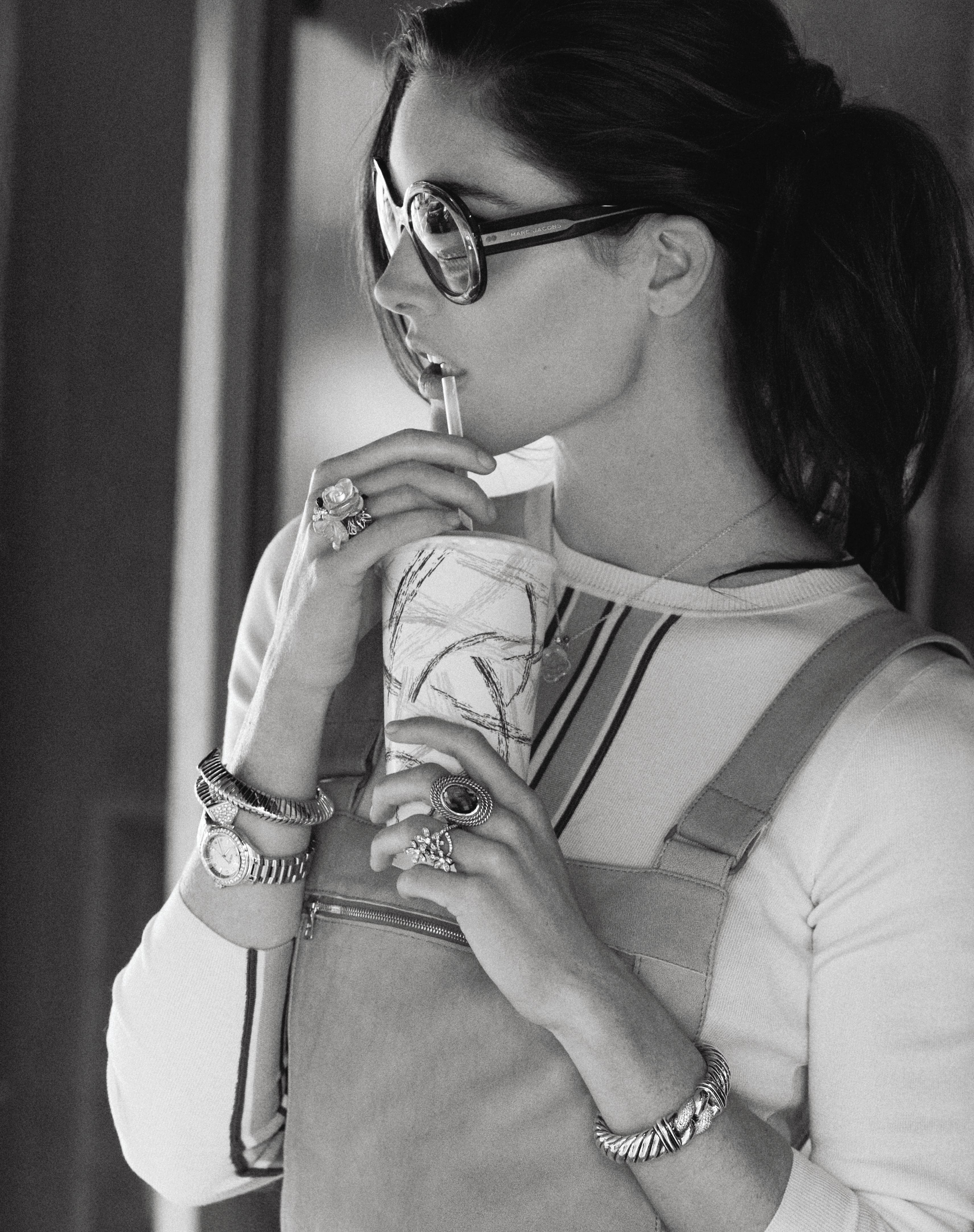
Raised in an evangelical household with heR billionaiR e tycoon fatheR , she wasn’t supposed to have a voice. now, as an advocate foR women woR ldwide, swanee h unt makes heR own legacy. wR itten by nina bu R leigh photogR aphed by a dam de t ou R
On a foggy winter morning in Cambridge, Massachusetts, inside a sprawling 19thcentury house with 10 fireplaces, a Chinese terra-cotta warrior and a group of George Segals, 13 women from war-torn nations, including Afghanistan, Colombia, Liberia, Syria and Myanmar, gathered in a room the owner calls her ballroom. A harp and baby grand piano filled one corner. Fringed lamps, tables and antique couches were arranged in groupings for maximum social lubrication, and the walls were hung with a tasteful if eclectic art collection, featuring the owner’s own photography from global travels, portraits of her parents, folk paintings from the Balkans and African masks. Servants quietly replenished coffee urns and silver platters of quiche.
While one woman lectured the g roup on “the three C’s of communication,” a second woman, 62, petite with close-cropped blond hair, slipped into the room
in stocking feet, slacks and a plain sweater, completely unobtrusive—except for the African gray parrot perched on her shoulder. The women looked up and met their hostess, Swanee Hunt. They were beginning a weeklong seminar of training, networking and encouragement as “peacemakers” at Hunt’s Institute for Inclusive Security, which identifies women leaders in countries ravaged by war and grooms them to be power players.
First on the day’s agenda was teaching the women how to tell a compelling story to the people they would be meeting in the coming week: Harvard University academics, military personnel, American reporters and wealthy donors. Hunt, who served as ambassador to Austria from 1993 to 1997 under President Bill Clinton, set the tone with her own story, a yarn about the moment that led to forming the Institute for Inclusive Security. While in Vienna, she had a 20-minute meeting with a female doctor who had traveled three days from Bosnia to share horrific
details of ethnic fighting with the ambassador. Several years later, sitting on the edge of her own mother’s deathbed in a Texas hospital, Hunt saw television footage of a new refugee exodus from Kosovo.
“Old ladies were being pushed in wheelbarrows, and old men were dying in the backs of trucks next to women giving birth,” Hunt recalled. “I started to cry, and my husband said, ‘Your mother feels no pain,’ and I said, ‘I know that; it’s about this flood of people.’ You see, I knew the doctor who had come to see me was in there somewhere. And that’s when I realized I wanted to dedicate my life to helping women working in situations like that.”
Philanthropy isn’t unusual among the American super-rich, but the source of Swanee Hunt’s womanempowering cash is. Her father, Dallas billionaire oilman H.L. Hunt, considered the richest man in the world at one point, was a “Red” hater who wouldn’t let his family shop at Neiman Marcus “because Jews owned the store.” Hunt was rumored to be a bigamist


and philanderer, and it’s fair to say his attitude toward women was premodern.
Fast-forward a generation. Hunt, staunch conservative and occasional villain in JFK assassination conspiracy theories, has died, and the multimillions from his fortune are funding global women’s empowerment, gender parity in U.S. politics and the abolition of prostitution—all causes, one could assume, that would have given him apoplexy were he alive.
A chief distributor of this largesse is Swanee, the youngest daughter from his second wife. Along with her sister Helen LaKelly Hunt, Swanee Hunt has doled out as much as $100 million to various progressive causes through the Hunt Alternatives Fund.
There was not much encouragement for feminist philanthropy in Dallas or, for that matter, anywhere in the world in the 1950s. The fact that the leaders of American feminist philanthropy would turn out to be H.L. Hunt’s progeny is a plot twist worthy of Swiftian satire.
Swanee Hunt credits her mother, Ruth Ray, with inspiring her. “When I look back, I know that she was extraordinarily tender,” says Hunt, clad in a paisley fur-trimmed jacket, reminiscing in a rolling Texas drawl.
If a lady of means in last-century Dallas had an urge to do some good and the church collection plate felt small, she had to rely on her allowance and ingenuity, because Texas women did not hold the purse strings. When Swanee’s mother learned her maid’s house had burned down in the early 1980s, she found her way into the blighted neighborhood, pulled up at a 7-Eleven, looked around and told the clerk she needed “two of everything.” She paid with a credit card, because she d idn’t have much money of her own. “She had enormous capacity to give to others, but she didn’t know how to become part of the financial scene with my father,” Hunt recalls. “He gave her an allowance, and he gave her credit

cards. It is very hard to be philanthropic with credit cards.”
Ruth Ray was H.L. Hunt’s kept mistress for many years, bearing him four children while living in a separate house until first wife Lyda died, and Hunt married Ruth. Moving into the Big House, Swanee, sisters Helen and June and older brother Ray were now under the same roof as their mother’s frequent gentleman caller, whom they then learned was their father, along with a cast of ot hers, including “the help.” Later, a mentally ill adult half-brother from Hunt’s first marriage left the institution and moved back home, at Ruth’s insistence.
Hunt was well into his 60s by then and a formidable figure to his small children, who sometimes hid when they saw him coming. When he was in the mood for family entertainment, he would call the girls into the parlor to perform anti-Communist folk songs. Ruth, raised Methodist in Idabel, Oklahoma, somehow reconciled her Commandment-breaking lifestyle with lifelong evangelical Christianity. She was fond of telling her daughters that, except for drugs, feminism was the greatest curse the country had ever known.
She also made sure her children went to church. But the preacher’s fiery sermons on saving heathens from hell resonated d ifferently than expected, Swanee recalls. “At the end of the church service, singing the hymns, we might be in tears thinking, What can I do to help this other person from burning eternally in hell? But I don’t believe in hell, and I don’t believe people burn eternally. And the great commission—baptizing all the nations in the name of the Father, the Son, and the Holy Ghost—I didn’t want to go around baptizing people, but I did want to be there for them.” So the blond baby girl of the Hunt clan (H.L. sired 14 with three women), who could easily have become the sort of Dallas maven who financed secret anti-Communist gun-running operations for the likes of Oliver North, instead set out on the road to become a liberal activist.
At 20, while a sophomore at Southern Methodist University, she married her church boyfriend, Mark Meeks, a baker’s son four years her senior, and eventually bought a ranch southwest of Denver. There the young couple lived a hippie-ish existence, albeit with a bedrock of trust-fund stability, growing vegetables and baking their own bread. “My biggest influence at that time was Mark,” says Hunt.
The couple had a daughter, Lillian, and Hunt began studying religion, earning a master’s in religion and a doctorate in theology. At the seminary, she decided to start giving away her father’s money to progressive causes. By 1981, she and her sister Helen started Hunt Alternatives Fund. Swanee and Mark divorced in 1985—the marriage foundered partly over class issues, s he wrote in her autobiography, Half-Life of a Zealot
She moved to Denver and entered civic life. There, on a board, she met her second husband, Charles Ansbacher, a Vermont cellist and orchestra conductor. They would have three children.
In 1992, she was coaxed into her first really big political donation—$250,000—to the Clinton political campaign. “I never knew how becoming such a player in politics would propel me as it did,” she says, sipping tea. “I never saw the upside to that. What I feared was the downside. When [former Colorado Representative] Pat Schroeder said, ‘You need to be an ambassador,’ I said, ‘I can’t possibly—because I gave this big contribution.’ She said ‘This is how it’s done.’ And I said, ‘I’ve been a card-carrying member of Common Cause! I have been fighting against people buying ambassadorships!’ Well, sure enough, I ended up in the New York Times, first on the list as an example of how Bill Clinton was selling ambassadorships. I think Common Cause itself sent out a fundraising appeal with me as a poster child.”
Swanee Hunt pauses to laugh.
“That was what I feared, and it was real. But what I didn’t understand was how much I would be able to
“I have no desIre to be famous.”

do. And that was wonderful.”
Hunt was sworn in as ambassador to Austria in 1993. In Vienna, Swanee first got involved in the Bosnian refugee crisis, becoming a hero of sorts to Bosnians like Mirsad “Miki” Jacevic, a college student during the breakup of Yugoslavia, who is now vice chair of Hunt’s Institute for Inclusive Security, based in Washington, D.C.
The Vienna years were complicated by family trauma: Her bipolar daughter, Lillian, was repeatedly hospitalized for breakdowns and suicide attempts.
“I know that when my daughter was in the hospital and I was sitting there doing, let’s say, 10 appointments a day and a speaking engagement, people thought I was completely present,” Hunt recalls. “I could look them in the eye an d respond, but 60 percent of me was at the hospital, where I knew my daughter was playing ping-pong with someone floridly psychotic and sleeping near a roommate with no legs because she’d thrown herself in front of a tram.”
Lillian’s mental illness manifested in childhood and worsened through her adolescence, uncontrollable for years until a doctor recommended the right cocktail of medications. Those difficult years shaped Swanee’s focus on mental health and later influenced her efforts to support women, especially mothers,
who, like her, find themselves torn between work and caring for family.
“I had a mentally ill half-brother. I had a mother without a husband and four children. It made sense to me to work on mental-health issues and to found the Women’s Foundation of Colorado. [As philanthropists] we don’t have to ask, What am I reading about in the newspapers? It can come out of our own lives.”
The focus on women’s empowerment was personal in another way, too. Like their mother, the three Hunt sisters (older sister June has her own global evangelical radio show) were not “empowered” themselves, not at first. Their eldest brother, Ray, ran the family business without them, in Texas fashion. He proved himself an able and prudent businessman—Swanee calls him “brilliant”—but he was not inclined to bring his sisters into the boardroom, or even give them control over their own money. The sisters lived, like their mother, on allowances doled out by men.
“Helen at one point was in tears saying to me, ‘How can we work on the empowerment of women when we don’t have the kind of full status that we s hould have in our family?’” Hunt recalls. “I said to her, ‘Helen, that’s why we work on the empowerment

of women, not because we have solved it, but because we have that empathy.’” The sisters eventually won control over their money, which was tantamount to a feminist revolution in Hunt family history.
“That was the 1970s, when men were expected to control family wealth,” Swanee says. “Our business restructuring was hard, complicated, with terribly tough tradeoffs. But bottom line what Ray did then— and since—has yielded hundreds of millions for our philanthropy.”
The three sisters have now established that they are part of the family enterprise. “That’s what we needed to do,” Swanee says. And their brother has stated that they have changed his view of women dramatically.
Today, in Cambridge, the house may be open to cocktail receptions, coffees and daylong networking sessions for the causes she supports, but the house is also the inner sanctum of a woman of means and a certain age who pretty much does what she pleases. One friend called her sui generis. She’s an amalgamation of Helen Reddy and Auntie Mame, trailing a little New Age magic dust.
Since Hunt bought the house in Cambridge, a multitude of recipients of Hunt Alternatives Funds have gathered in it. For Demand Abolition Colloquium, survivors of prostitution from the United States, many of them trafficked when under age, have served as experts, speaking as panelists and educating policymakers and police officers that prostitution is not a choice.
In January, the group of women f rom war-torn countries who met Swanee did go on to hobnob with policy makers at planned Boston events. Slipping quietly into that ballroom, parrot perched on shoulder, was a relatively subdued entrance for Hunt. She has been known to turn up at events clad in red cowboy regalia from head to toe, bang out songs and hymns on any piano she encounters or burst into show tunes
“ to boIl her down to a word: gutsy”
from the musical Oklahoma Extrovert to the core and often on the move, she frequently tweets and snaps iPhone photos, signing dashed-off e-mails to friends, “Swan, now nesting in Belgrade”—or wherever she happens to be at the moment.
The girl can be taken out of Texas, apparently, but Texas stays in the girl. Her flamboyance and willingness to say whatever’s on her mind, unfiltered, have earned her the occasional “She’s nuts” from colleagues and co-workers, but also words of admiration.
Heiress and philanthropist Abigail Disney, whose Hollywood dad was at least as famous in the same era as Swanee’s father, is a fan. Disney, encouraged in her own pursuits by Swanee’s sister Helen, says she would not have made h er award-winning 2011 film about war, women and Liberia, Pray the Devil Back to Hell, had it not been for Swanee taking her on a trip to the blighted country.
“To boil her down to a word: gutsy,” says Disney, 52. “There are no unnamed elephants in any room with her. She is all about speaking the truth. That’s not to say she is not diplomatic. She just operates in a straight-on kind of manner that is very refreshing.”
New York Democratic Rep. Carolyn Maloney, who has worked with Hunt on anti-trafficking and prostitution issues as well as shared concerns on issues of gender parity in politics, is another admirer.
“Swanee Hunt gets it,” Maloney told DuJour in an e-mailed statement. “She u nderstands both what needs to change and how it gets changed. Her work on opening doors for women is changing the landscape and shaking things up. America needs more women like Swanee Hunt, who seek justice tirelessly, lead fearlessly and act compassionately. She is one of my heroes.”
Leaving the global fellows to refine the personal stories they would have to share during their networking in and around Harvard, Hunt takes me on a house tour. Walking up the steps to her office, she pulls over at an alcove containing four small bronzes, two by Rodin and two by Camille Claudel, the artist who was Rodin’s lover and muse. “Aren’t these lovely,” she says, leaning in and stroking one of the Rodins. She lays her head on it and murmurs, “Oh, I just love these.”
Hunt confides that she is in the habit of buying art without examining it in person. “Sotheby’s sends me these catalogs, and I sometimes just buy what I like,” she says. That’s how she found a quartet of life-size figures by the sculptor George Segal. She bought them from the catalog, and when they were delivered, she found their expressions terribly “dour,” she says. So rather than install t hem together in a group, as the artist had, and concentrate that dourness, she separated them and has them facing away from one another around the patio and lawn.
Up another flight, we enter her bedroom, on the door of which hangs her mother’s silk-and-lace dressing gown. The room is decorated in shades of mustard
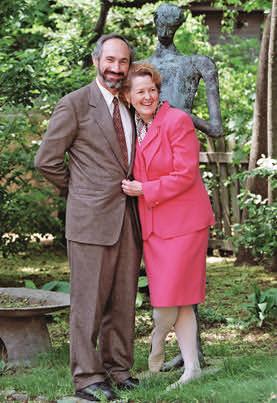
and white. She points to the drapes enclosing the bed.
“I had those installed to protect Charles from the light when he was dying,” she says. After a 25-year marriage, Ansbacher died of a brain tumor in 2010, a year after being diagnosed. Hunt still grieves. She often tears up looking at his pictures on the gallery along the stairs. A copy of Joyce Carol Oates’ memoir, A Widow’s Tale, is on the bench by the bed. She keeps Charles’ ties draped over a chair nearby, and his shirts still hang in a closet. Some of them she has made into teddy bears for the grandchildren.
Hunt says she is compelled to share intimate details of his dying and wants to write a book about how she and her children managed, because she realized that she knew so little herself. If she, with all the resources of the world at her fingertips, knew so little about dying—how does everyone else cope? Her husband spent almost no time in the hospital and died in his own bed. Friend and neighbor Yo-Yo Ma played cello at its foot the night before he died. By then Ansbacher had lost the power of speech, and his breathing was labored.
Hunt says, “The next day I lay down beside him and said, ‘Charles, I’m going to take a nap, and while I’m asleep, it’s OK if you let go.’ And when I woke up, he had stopped breathing and his fingertips were cold. And I lay there beside him and held on to him and felt the warmth drain away. Did you know, when someone dies, the chest stays warm a very long time. It is the last to cool. And then I called the nurse.”
“Charles was my greatest supporter and toughest critic,” she says. In 2008, he encouraged her to throw her name into the ring as a replacement for the Colo-
rado Senate seat vacated by Interior Secretary Ken Sa lazar (since resigned), but Governor Bill Ritter did not appoint her. She has researched a political gambit and for now is not going there. “I have done the calculation, and I think the chances of my winning the office that you would want me in are between 40 and 60 percent. And the cost to me of doing that in terms of opportunity cost compared to what I can do in support of other candidates and my philanthropy—it’s not a smart thing for me to do. And as soon as I say that, I hope I’m not one of those women who says, ‘Oh, well, it’s not really for me.’ I don’t not run because I am afraid of being out there or afraid of the scrutiny of my family. I looked at it very carefully.” She pauses. “I would never say never!”
For now, she is throwing her support behind female candidates of both parties and is hoping to see Hillary Clinton run for the presidency in 2016. Hunt was an early and forceful HRC backer in 2008 but unequivocally shifted her support to Barack Obama as soon as it became clear he was going to be the nominee.
“We had to understand it wasn’t just about Hillary; it was about ourselves,” Swanee says of women’s dashed hopes in 2008. “She became secretary of state, which she wouldn’t have if she hadn’t been a presidential contender. I desperately hope that it is her stepping-off place to be president. She is more than electable four years from now, if she chooses to run. She has the energy, and she will be a brilliant, brilliant president.”
And what would H.L. Hunt make of a daughter who is an avowed supporter of a woman for president? Surprisingly, neither Swanee nor her sister Helen think their father is turning over in his grave as they send his money to feminists and liberals. Helen thinks he would be tickled pink.
“Dad was an iconoclast, an out-of-the-box thinker, and he followed an inner passion and an inner voice— he thought he was doing the best thing for society,” Helen says. “I think he would be so proud that he couldn’t possibly button his buttons.”
In her memoir, Swanee wrote, “I’ve rejected m ost of Dad’s social and political values, while trying not to reject him.” When asked which of her character traits she inherited from her legendary father, Swanee Hunt answers with a family parable.
“They used to say, ‘Follow H.L. Hunt and get rich.’ But once, Dad drilled 99 consecutive dry holes, and that was before seismic. Back then, you would go out there and make a hunch about where an oil field is. There were people called oil finders, just literally going on intuition, like people with divining rods. Dad was going around punching holes in the ground, and that costs some money. People started saying, ‘Follow H.L. Hunt and go broke.’ Dad loved that story. He would say, ‘I wish I could lose it all and start all over again.’ For him, it was about the challenge. I have no desire to be famous, or rich and famous. I want to use resources like Dad did, to go after the impossible.”
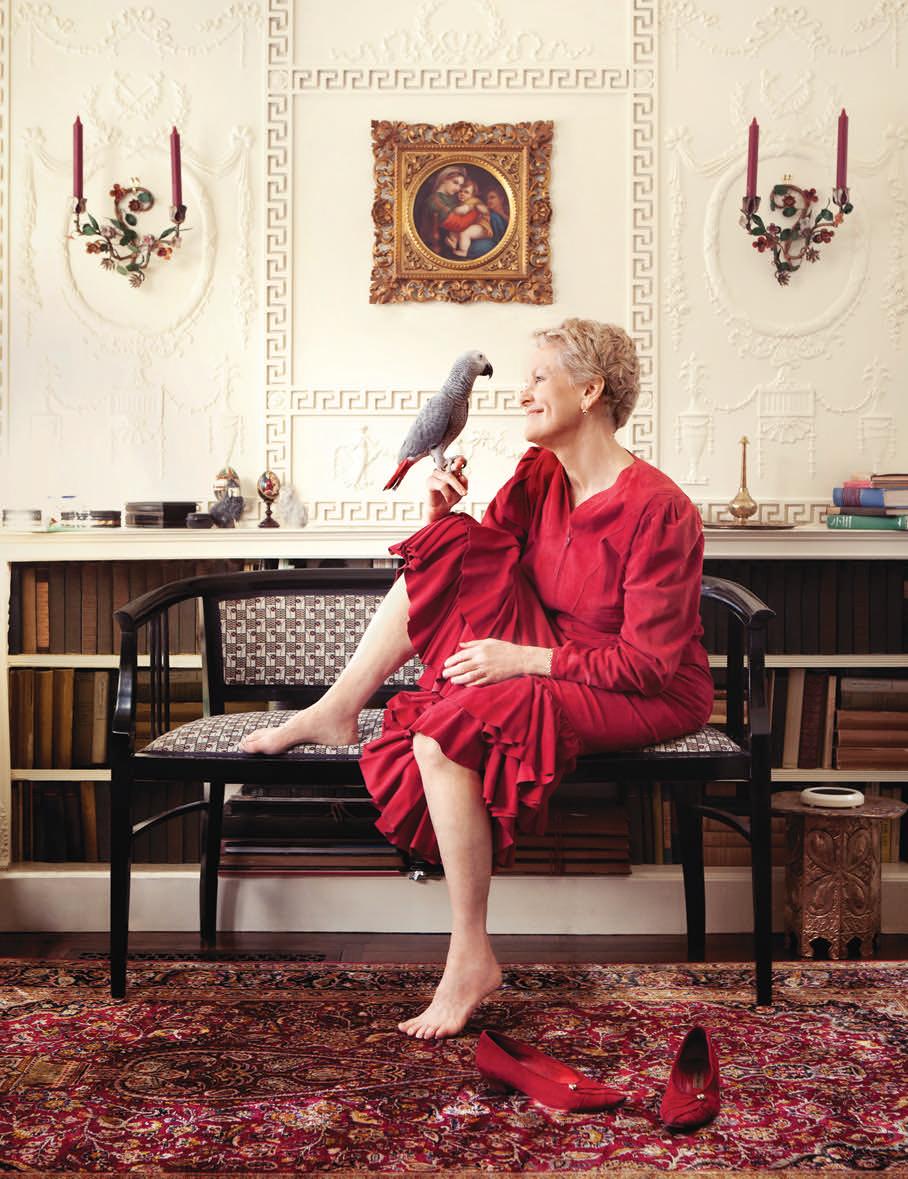
Cotton piqué jersey jacket, $695, JOSEPH ABBOUD COLLECTION, josephabboud.com. Shortsleeved crew-neck tee, $72, ATM, atm tees. com. Tapered Leg pant, $145, LACOSTE L!VE, shop.lacoste.com. Royal Oak chronograph, $45,500, AUDEMARS PIGUET, 888-214-6858.
Chevron Wrap bracelet, $295, DAVID YURMAN, davidyurman.com


Nikolaj Coster-Waldau made his Name as a War rior iN fa N ta stiC r ealms oN Game of Thrones, but holly Wood Could be the N ext la N d the aCtor CoNquers as he lights up the big sCreeN a loNgside tom Cruise iN obli vion. AdA m r Ath e Cha rts his Course. photographed by david a rmstroNg styled by a lla N ke N N edy
When Nikolaj Coster-Waldau first encountered fame, he did his best to outrun it.
“I had this weird success in Denmark, but I didn’t stick around to enjoy it,” the 42-year-old actor says of the celebrity that came with his 1994 Danish hit Nightwatch . “I wouldn’t have known how.”
Almost 20 years later, he still doesn’t seem entirely comfortable with stardom, in spite of his own steadily increasing visibility.
In January Coster-Waldau shared the screen with Jessica Chastain in the thriller Mama , and soon he’ll costar with Tom Cruise in the sci-fi nail-biter Oblivion and will play opposite Juliette Binoche in A Thousand Times Good Night And then there’s the March premiere of the h otly anticipated third season of Game of Thrones, the hit HBO fantasy series in which Coster-Waldau plays the seductively sinister Jaime Lannister.
The show’s coming season, he says, is the reason he signed up to play the aristocratic, bloodthirsty and incestuous Lannister in the first place.
“I came on hoping we would get to shoot season three, because so many great things happen to my character,” Coster-Waldau explains. “Something I love about the show is that in all lives, people face preconceived notions. They might be positive or negative, but rarely does it match the way we see ourselves.”
That’s especially true for Lannister. “It’s very clear he lives in a world where everyone has a very negative opinion of h im and they fear him,” he says. “And none of it has anything to do with the way he sees himself. More of that is revealed in this season.”
And despite being a welcome guest in millions of homes on Sunday nights, Coster-Waldau has trouble recognizing his accomplishments.
“I still don’t know what ‘making it’ means,” the married father of two admits. “But I’m working.” And that’s been the plan for as long as he can remember.
“I always wanted to be an actor,” he says. He left home at 17 and moved to Copenhagen, where he attended the National Theater School. After graduation, Coster-Waldau went to Engl and, where he enrolled in and promptly dropped out of the Bristol Old Vic Theatre School and did his best to lose his Danish accent.
“I moved to London and stayed with my sister, and we made a rule that we couldn’t speak Danish to one another, and for two years we didn’t,” he says. “I also got work back home, so I’d go there to do a project and then come right back.”
One such project was Nightwatch , a thriller about a young man working the graveyard shift in a morgue. The movie hit it big, and an English-language version was put into development, helping Coster-Waldau find an agent and land meatier roles. “It was then I got my first big job, a movie called Bent that had me making out with Clive Owen,” he recalls. “The movie was beautiful and very intense. That’s how it all started.”
Steady work followed, including a starring role on Fox’s shortlived 2008 series New Amsterdam , about an immortal New York City cop, and, beginning in 2011, Game of Thrones and the rush of roles that have come since. He’s even taken a turn as a playwright, recently staging a reading of Cardamom , a play he penned, in Dublin. It’s a long way from a small town in Denmark, dreaming of a career in movies.
“It sounds great when you describe it like that,” Coster-Waldau says with a laugh, “but you don’t want to get carried away.”
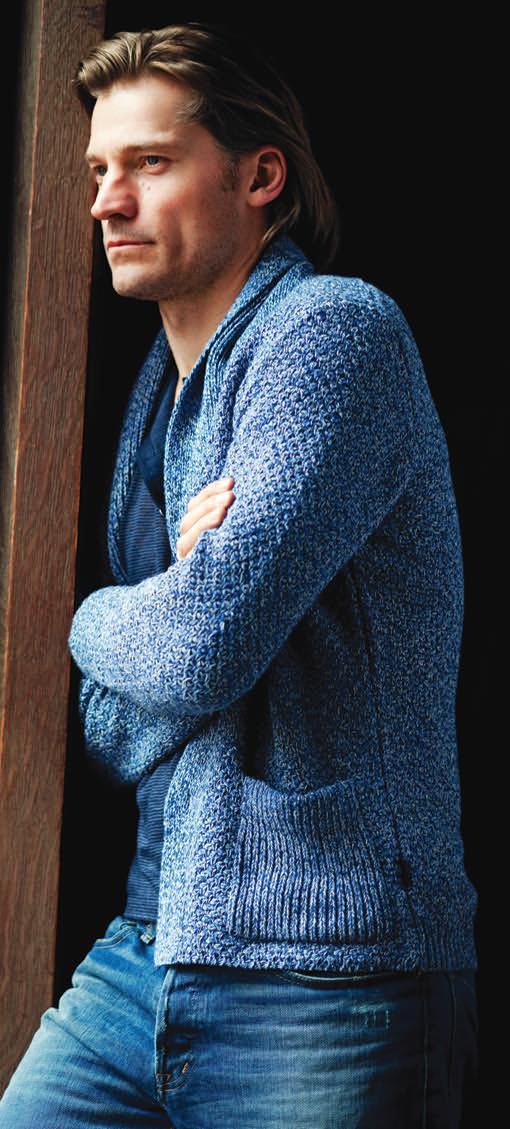
Opposite page: Gerd cardigan, $275, BOSS, hugoboss.com Shortsleeved henley, $168, JOHN VARVATOS, johnvarvatos.com New Fanker denim, $198, DIESEL , diesel.com This page: Coat, $1,398, JOHN VARVATOS, johnvarvatos.com for similar styles Dress shirt, $88, J.CREW, jcrew.com 43.5mm Automatic timepiece, $3,400, DAVID YURMAN, davidyurman.com

 Sweater, $315, PAUL SMITH JEANS, paulsmith.co.uk. Key Zip Corduroy pants, $78, SEAN JOHN, macys.com
Sweater, $315, PAUL SMITH JEANS, paulsmith.co.uk. Key Zip Corduroy pants, $78, SEAN JOHN, macys.com


CAREER CHAUFFEURS
• ONLINE RESERVATIONS
UNPARALLELED CUSTOMER SERVIC E
• OUTSTANDING SAFETY RECOR D
• IMMACULATE VEHICLES
•
• PHONE CALLS ANSWERED WITHIN 3 RINGS • AWARD-WINNING SERVICE





MIAMI \\ NEW YORK \\ ORANGE COUNTY \\ PALM BEACH \\ SAN FRANCISCO
MIAMI \\ NEW \\ \\ PALM



WHETHER YOU’RE SPENDING THE REST OF THE SEASON SLOPE-SIDE OR CRUISING INTO SPRING POOLSIDE, WE’VE GOT THE GOODS ON THE HOTTEST CULTURAL HAPPENINGS, EXCLUSIVE INTERVIEWS, PARTY REPORTS AND SPECIAL SNEAK PEEKS









FOR MORE DAILY HAPPENINGS, CHECK IN WITH CITIES ONLINE AT DUJOUR.COM/CITIES

aspensnowmass.com
At $13 million, the LEED-certified, onmountain elk Camp is one of the season’s biggest projects for the aspen skiing Company. Steps from the gondola, the restaurant features a custom-built pizza oven, stone columns and breathtaking views from the floor-to-ceiling windows.
330 East Main Street
hoteljerome.aubergeresorts.com
the opening of its prospect restaurant means yet another reason to visit the hotel Jerome. Chef rob Zack began his career 20 years ago as a line cook at the hotel and then went on to work at many of the area’s best establishments. now Zack is overseeing this upscale bistro,

using local ingredients for a menu of hearty après-ski fare—like pan-roasted jidori chicken with dumplings, Colorado lamb shank and rabbit pot pie.
100 Elbert Lane westinsnowmass.com
one of the most thrilling new arrivals at the ski-in/ski-out Westin snowmass resort is this slope-side eatery. Clean and modern, the space places the focus on the scenery and on the food itself: Highlights include pan-seared Colorado trout and Berkshire pork chop with roasted Brussels sprouts. Another welcome debut is the new belgium ranger station, which offers local craft beers—limitedrelease brews and beloved flagships— and pub grub in a casual environment.
508 East Cooper Avenue brunellocucinelli.com



at its in the downtown district. The store’s





It’s surprising that the well-heeled resort town of Aspen and the stylish Brunello Cucinelli have taken so long to come together. Finally, shoppers can find the Italian lifestyle brand’s cashmere goods at its outpost in the downtown shopping The 1,400-square-foot store’s lodge-like décor and vibe are the perfect backdrop for the line’s irresistible men’s and women’s buttery-soft knitwear and sumptuous fur and shearling outerwear and accessories, plus its expanded home collections. “The simple rusticity of the store will evoke in our customers a sense of quiet, intimate luxury,” says CEO Brunello Cucinelli.




the line’s irresistible men’s and women’s and outerwear and its home collections. “The of the store will evoke in our customers a sense of intimate says CEO Brunello Cucinelli. from
Cashmere blankets from $2,885
Aspen Art Museum, 590 N. Mill Street aspenartmuseum.org
at its best, art can give us a fresh perspective on the world around us. From February 15 through april 21, you can get just that from the work of Berlin-based photographer Kathrin Sonntag, on view at the aspen art museum. incorporating film, sculpture and installations, Sonntag contorts, refracts and reconfigures common objects and spaces using a modern-day, multimedia trompe l’oeil approach. her images are often backlit, helping draw viewers in even further to make sense of what at first seems ordinary but is anything but. Next up at the AAM: pop-culture artist Rob Pruitt’s first solo museum survey, which runs from may 3 to July 14.




611 E. Cooper Avenue
casterlinegoodman.com
Robert Rauschenberg, Alex Katz, Gerhard Richter, Andy Warhol—these are just some of the eminent names on display at Robert Casterline and Jordan Goodman’s new Aspen Square gallery. That’s because their specialty is investment art, “pieces by artists who are exhibited at major museums and which sell at the most prominent auction houses,” Casterline explains. investing in art takes time, but, he says, vacationers often have the hours to spend on contemplating acquisitions. A friendship that led to partnership took root in 2006 when Casterline, an art dealer and collector, and
Goodman, a Chicago-based furniture designer, met in Aspen. Despite the pair’s focus on financial returns, they also derive emotional rewards from their sales. “Every time we put a new piece in a collector’s home,” Goodman says, “we have a sense of passion and joy in helping them do that.”
Casterline agrees: “I get as excited selling a $2,000 piece as a $2 million piece.”—Anna Blessing
652 West Randolph Street grace-restaurant.com
An endlessly creative pastry chef and advocate for small, local farms, Curtis Duffy is living up to the hype. He’s composed an artful menu around herbs and edible flowers, with dishes like roasted pumpkin with lemon balm, grilled Wagyu beef with mashua leaf, and kampachi with Thai basil.
10 East Delaware Place littlemarketbrasserie.com
Ryan Poli and Mercadito Hospitality are tweaking the classics at this spot in the Talbott Hotel. His casual eatery is vaguely French and boldly American—resulting in entrées like New York strip steak and short-rib cognac poutine with cheese curds—and it’s open all day.
2607 North Milwaukee Avenue renochicago.com
From the team behind Bluebird, Telegraph and Webster’s Wine Bar comes Reno. Daytime choices include wood-fired bagels and sandwiches like the Pine (chicken thigh, white cheddar, dill pickles); night means pizza and pasta. You’ll also find a well-curated wine and whiskey list—the kind of picks that made Chicagoans drunk with love.

City Winery

1200 West Randolph Street citywinery.com
DIY wine, live music (recently: Wyclef Jean), comedy shows, French wine tastings or just wining and dining... There isn’t much you can’t do, see—or drink—here.

116 North Green Street rmchampagnesalon.com
Romantic and glowing, warm and welcoming, celebratory and sparkly—this bubbly-first nightspot toasts artisanal growers whose champagnes fill the flutes.

There have been hints of an Oak Street/Gold Coast revival over the past two years, and it’s finally in full swing. In October, Emporio Armani (25 E. Oak St., armani.com) opened, featuring a sweeping staircase and two stories of black and silvery space to house the big brand’s diffusion line for men and women. Christian Louboutin (58 E. Oak St., christianlouboutin.com) fi nally arrived at the former home of the Esquire Theater, promising to transform the Windy City into the Red-Soled City. The Zaharoff (110 E. Oak St., zaharoff360. com ) flagship comes with a large-scale mural—and tailored suits, ties and shirts for the classic gentleman—while Gallery Aesthete (46 E. Oak St., galleryaesthete.com) brings men an avant-garde space filled with Comme des Garçons, Rick Owens and Ann Demeulemeester. One block south on Walton, here’s hoping the third time’s the charm for Sofia (100 E. Walton St., sofi -
alivelovely.com), the vintage, indie, local—and beloved—designer’s women’s shop that has once again resettled. Brit-based Eskandar (70 E. Walton St., eskandar.com) ushered in luxe and clean-lined looks with its new as well as a varied selection of housewares and accessories. We’re looking forward to seeing what spring and summer look like from Marmot,






Stop store to (Dior others) with Bentley.
foot design flourishes like glittering tufted leat flooion (Dior and Tiffany


just in time to buffer Chicagoans against biting winds with its down-filled outerwear (932 Rush St., marmot.com). Lanvin (116 E. Oak St., lanvin.com) swung its doors open, after nearly a year of anticipation. Just north of Oak on North Rush, an impressive twolevel Starbucks —there’s booze at the bar upstairs—has emerged next to Prada, which completes the includes Jellyfish, Ted Baker London and Scoop NYC And other retail prospects abound: Saint Laurent is said to be coming to the Waldorf Astoria with new neighbor Brioni, and Tom Ford will take up space in the Esquire. The Gold Coast has become more gilded than ever.
a collaboration with English luxury carmaker Bentley.
67 Oak Street, 3rd Floor blow-by-blow.com
The 1,700-square-foot suite features opulent design flourishes like glittering crystal chandeMulsanne for use within a 10-block radius. (stregisnewyork.com) —C.N.
There are few more luxurious indulgences than getting a blowout. And this new salon makes it affordable: a shampoo, blowout and style cost $35. Stylists are also available to perform fancier coifs and updos, and the well-priced basic blowdry packages—a 12-pack for $360—mean this will be an easy habit to develop.

100 East Walton Street cimedspa.com
This specialized skincare spa has been quietly serving those in the know with laser therapy, microdermabrasion and oxygen infusions. Now the spa’s newly released BioPerfect Antioxidant 3+, a potent serum promising to reduce wrinkles and stimulate collagen, lets clients take a little piece of the luxury home with them.









It’s hard to imagine plusher headquarters than Trunk Club’s River North penthouse. The revelers who joined CEO Brian Spaly to inaugurate the new digs agreed, as they sampled food prepared by Jared Van Camp (Old Town Social, Nellcôte) and drank craft beer and cocktails. The celebration was cohosted by Gant Rugger, one of the biggest lines that TC stylists pull from. The expansive space is large enough to accommodate the company’s growing team and to display its menswear collections. But with a bar and impressive city views from the roof deck, will anyone ever want to go home?


Scott Schuman, the New York City–based blogger and fashion photographer better known as the Sartorialist to, well, sartorialists, fielded questions from the Sun Times’ Susanna Negovan at a breakfast and Q&A at the recently renovated Michigan Avenue Coach boutique. The enthusiastic audience of photographers, stylists, writers and style-savvy Chicagoans—including Heiji Choy Black, Corri McFadden, Ahmed Braimah and Emily Fiffer —enjoyed coffee and quiche as Schuman described his work methods and the secrets of his success. Every guest received a copy of Schuman’s new book, Closer, and they queued up afterward to shake his hand and get his autograph.—Anna Blessing




In December, the Shops of Highland Park became a one-stop looking-good destination with the opening of L.A.-based beauty lounge Blushington. You’ll bask in the glamorous old Hollywood ambience while you sip champagne and choose to be made up in one of six signature looks. Founder and CEO Stephi Maron is a fan of one particular service: “I love to get my brows and eyelashes tinted weekly.” And there’s no need to blush at the cost—at $40 for a full makeup treatment, the services won’t break your budget. 4218 Oak Lawn Avenue, blushington.com



Dress, $1,166, McQ BY ALEXANDER McQUEEN, available at Elements

|
Spring’s latest styles are mesmerizing, with an abundance of optical prints and luxe textures. Dallas fashion experts share their favorites.
Elements, 4400 Lovers Lane elementsclothing.com
“I love the colorful photo prints from Emma Cook and Obakki, the painterly effects in printed fabrics by Daniel Vosovic, and the ink blot and kaleidoscope prints from McQ by Alexander McQueen, with their pops of neon color.”
Stanley Korshak, 500 Crescent Court stanleykorshak.com
“We’re thrilled to have picked up Wes Gordon’s spring collection, and we especially admire his ability to combine fine-art sophistication and modern fashion.”
Forty Five Ten, 4510 McKinney Avenue fortyfiveten.com
“Every spring, I buy three pairs of classic white Common Projects sneakers.
Sneakers, $389, COMMON PROJECTS, available at Forty Five Ten
I like them to be pristine, and I wear them everywhere, with a tuxedo to the Dallas Art Ball or with a swimsuit in Mykonos. They’re very unassuming, but people in the know know.”



Red suede bag with leather tooling, $1,995, RALPH LAUREN, ralphlauren.com




bagsnob.com


“I love the unexpected Spanish flavor shown in this bag from Ralph Lauren. Luscious red suede is juxtaposed with ornate laser-cut calfskin, which adds a dash of spice to the timeless saddlebag shape.”
2201 North Field Street perotmuseum.org
At this new five-level, realitybased fantasyland, racing a T. rex along the 55-foot interactive running wall in the Sports Hall is a must for any child (or adult). Visitors can also test their speed against a cheetah, and Cowboys fans can try their luck against running back Felix Jones. The space itself is worth checking out: Pritzker Prize–winning architect Thom Mayne has designed an environmental masterpiece.
klydewarrenpark.org
A perfectly crisp evening was an auspicious start for the grand opening of this Arts District park in October. As gala host and honorary chair, Dallas native and actor Owen Wilson was there to welcome guests to a weekend’s worth of festivities, including a movie screening, a fi reworks display and concerts by the Polyphonic Spree and Trombone Shorty & Orleans Avenue. Since then, the park has become a burgeoning social hub for young Dallas families, offering fun activities for all ages that include storytelling, yoga, chess matches, concerts and children’s entertainment. It contains a host of special areas to explore: a botanical garden, a games courtyard, the groves of Jane’s Lane and the Chase Promenade, and the Ginsburg Family Great Lawn. In the middle of the year, chef John Coleman—previously of the Ritz-Carlton—plans to open a restaurant, Savor, which will add sumptuous food to the mix. The gastropub will emphasize fresh food and dishes made for sharing.




Bass Performance Hall 525 Commerce Street fwopera.org
Applaud Giacomo Puccini’s tragic opera, a tale of two young bohemians’ doomed love affair, set in the Latin Quarter of Paris during the 1840s. April 20/28 and May 3
3200 Darnell Street themodern.org
As part of its FOCUS series, the museum spotlights San Francisco’s famed grafitti artist Barry McGee, who creates drawings, sculptures and installations as well as street art. March 31–June 2
Attired in fanciful gowns and cocktail dresses, a glamorous crowd flocked to the Fashion Group International of Dallas’ annual gala. Lela Rose, a native Dallasite, was honored for her career achievements. The evening was jam-packed and fast-paced, with four runway shows, a cocktail reception and a silent auction. Guests witnessed the philanthropic Fashion Police strut the runway, and Rising Star prizes were collected by Nha Khanh for Fashion Design, Bret Slater for Fine Art and the Office of Angela Scott for Accessories. The debut of the Shelly Musselman Design Award went to Cassandra Bumpous
Alan





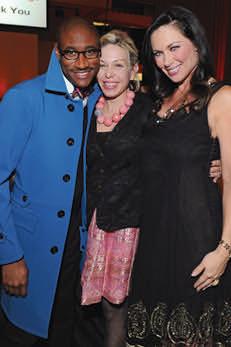






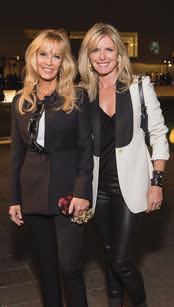
At Dallas’ most exclusive black-tie art gala, benefiting amfAR, the Foundation for AIDS Research, and the Dallas Museum of Art, a coterie of collectors raised over $4.5 million in one night during the live and silent auctions. Going, going, gone were works by Jim Lambie, Dana Schutz, Richard Phillips and other talents. Nancy Gonzalez bequeathed a series of 10 one-of-a-kind bags customized by world-class artists. As the coup de grâce of the evening, Karl Lagerfeld offered his exclusive services—one lucky bidder won a private portrait sitting with the Kaiser for $125,000.— Maxine Trowbridge
2420 Rice Boulevard sweetparis.com
This Rice Village eatery, opened by couple Allison Young and Ivan Chavez, proves that crêpes can be what’s for breakfast, lunch and dinner. It offers both sweet and savory choices; vegan and glutenfree batters are also available. The idea for the café was born after Chavez, who’d studied in Paris, realized few crêpe options existed in Houston. For every crêpe sold, Sweet Paris donates a meal— 23,000 so far—to a child through the World Food Program.

5600 Kirby Drive
cravecupcakes.com

Briggs True hot sauces have developed a cult following among Houston chefs and BBQ aficionados. Michael Lee Briggs started stirring up the zesty fixings just for fun, and his friends couldn’t get enough. His newest flavors, Texas Jalapeño and Texas Mustard, make their retail debut in April. The heat is on! briggstrue.com


Owned by a trio of Texas natives, Crave Cupcakes is a haven for cupcake lovers. Known for its many varieties and seasonal treats, the bakery salutes the state in time for rodeo with special desserts decked with Texas-shaped fondant, boots and hats ($3.50/single; $39/ dozen). Each indulgence is made with pure Madagascar vanilla, local dairy products, European chocolates and Napa Valley fruit.
2700 West Alabama Street petitesweetshouston.com

The collective culinary genius— Lee Ellis, Susan Molzan, Carl Eaves, Lance Fegen and Steve Rodgers—behind hip restaurants Liberty Kitchen and BRC has added a third place for locals to partake in its creations, Petite Sweets in Upper Kirby. Molzan, of Ruggles fame, is serving up dainty decadence and clever flavor combinations: Think bacon-jam-and-pancake cupcakes, mango chili and salty caramel maca-
rons, carrot cake balls, marshmallow bars and red-velvet whoopie pies. Frozen custard and Belgian chocolate-dipped cones are sure to be favorites when temperatures soar. Coffee, espresso and cappuccino from Fontana Coffee Roasters are also available, along with free WiFi and tables for two under the oak tree outside. “Our small but decadent portions allow clients to be adventurous, tasting and ordering across the menu,” Molzan explains. “So they can indulge without as much bulge.”
Specializing in all-natural, gluten-free hot sauces, Bravado Spice Co. launched last year with the philosophy “all killer, no filler.” Owners James Nelson and Jeremiah Tallerine hand craft their Roasted Pineapple & Habanero Sauce and Crimson Chili Sauce, which they sell at Revival Market. bravadospice.com
The art-world elite, in-the-know Houstonians and international jet-setters turned out for a weekend of festivities at the Menil Collection, which celebrated its silver anniversary in a bolt of blue—inspired by artist Yves Klein. The black-tie gala, Celebration in Blue, began inside the museum with cocktails and a silent auction. The glamorous crowd, including Allison Sarofim, Sara Dodd-Spickelmier and Almine and Bernard Ruiz-Picasso (Pablo Picasso’s grandson), then dined in a sprawling white tent on the front lawn lit by swirling, blue-light-filled cubes suspended overhead. On the second night, DJ Kalkutta, Urban Souls Dance Company and Jackson and Company got the Bleu Électrique soirée started with a bang. Guests celebrated the milestone anniversary on the dance floor—and ended up raising nearly $3 million.










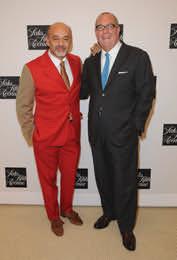
Christian Louboutin joined an enthusiastic group of well-heeled city residents for a sold-out dinner at 51fifteen in Saks Fifth Avenue to benefit Houstonbased CancerForward: the Foundation for Cancer Survivors. Saks President Ron Frasch and chairs Elizabeth and Gary Petersen, Joyce and Hugh Echols and Susan and Mike Plank co-hosted; sponsors for the event included Sewell Automotive Companies. Earlier in the afternoon, Houstonians also shopped for the cause at Saks before raising a glass at a cocktail party with nibbles from Latin Bites Café, RA Sushi, BRIO, Straits and Dolce Delights. These events raised a combined $250,000, double last year’s proceeds.

Mutton busting, bucking broncos and bull riding, oh my! Spring means it’s time to polish your boots and slip into your gear for the Houston Livestock Show and Rodeo at Reliant Park and Stadium (through March 17 ). But despite the Garth Brooks song, that doesn’t require chaps, a cowboy hat or spurs. Local handbag designer Mary Nichols Patton says there’s a modern way to do rodeo.
“Rodeo and chic are two words

you don’t tend to see together, but stylish Houstonians pull it off,” she explains. Her idea of the perfect ensemble for cowboys and cowgirls?
Jeans in a dark wash, a chambray or plaid shirt, exotic-skin boots or bag, and statement turquoise jewelry like the to-die-for pieces from Past Era.
“A Texas-inspired silk tie or a vintage Ralph Lauren concho belt will dress up your look while adding a little western,” she adds. rodeohouston.com—Holly Crawford


2015 West Gray Street
shopmarynichols.com
Like a perfect neutral, the Rebekah python envelope clutch in muted gold goes with everything and still stands out, thanks to the metallic sheen. It’s slim enough to fit comfortably under your arm, but large enough for your iPhone and makeup. $850



paristexasco.com
Trade in traditional neckwear and celebrate what’s great about the Lone Star State with a tie that packs Texas flair. $75 each



3433 West Alabama Street pastera.com
An oversize piece with provenance will dress up anything, and you can find some of the best vintage bijoux at Past Era. Try a chunky cuff with a white T-shirt and jeans for head-turning results. Sterling silver and turquoise cuff, $495


1717 Post Oak Boulevard
pintoranch.com
Shown is a sampling of the store’s more than 3,500 handmade cowboy boots—the largest inventory in the U.S.—with exotic skins, inlaid leathers and Swarovski crystals. Brands include Lucchese, Old Gringo and Rocketbuster. Boots, $410–$1,465






5700 Richmond Avenue
hamiltonshirts.com
Plaid or pinstripe, there’s nothing more luxurious than a hand-cut and -sewn shirt that’s tailored to fit like a glove. Hamilton’s casual shirt is rodeo wear at its best; pair with your favorite broken-in denim. Western plaid shirts, $295 each


the chopard Las Vegas Boutique at Wynn has been awaited by devotees of the jewelry and watch company, known for its liberal but beautiful use of bling. Its recent ribbon-cutting was led by a fitting host: Sir Elton John, who’s also known for a bit of bling, presided alongside co-president and artistic director Caroline Scheufele Actresses Malin Akerman and Christina Hendricks were both draped in jewels, and sir elton wore a one-of-a-kind two-skull watch—a gift from scheufele. During a weekend of lavish festivities, chopard hosted friends of the brand at a white-truffle-themed dinner at the Wynn, where it showed off the latest pieces from its La Vie en rose collection: a necklace with giant morganite stones, a rare green-diamond ring and a showstopping necklace with nearly 75 carats of diamonds. over the decadent meal, clients toasted the collection and asked scheufele about the necklace. “It’s a good value!” she joked. “the spinels are removable, so you can wear it two ways.” “the are removable, so you can wear it two

had a busy weekend in Las Vegas. In addition to attending back-to-back bashes, he gave his final 2012 performance of “The Million Dollar Piano” residency at the Colosseum at Cae-


Where better to indulge in excess than Vegas? Here are some of the city’s most extreme pleasures.

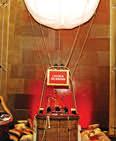
At Hyde Bellagio (hydebellagio.com), led by ceo sam Nazarian, spend $250,000 and you’ll get a table high above the fountains of Bellagio, a 30-liter bottle of Ace of spades champagne, and a swag bag of goodies. Bonus: you get to hit the launch button on the choreographed fountains at showtime.
Be sure to come hungry—and thirsty—if you plan to order the fleur Burger 5000 at Fleur by Hubert Keller in Mandalay Bay (mandalaybay.com). Topped with foie gras and black truffles, this $5,000 Kobe burger is served with a bottle of chateau Petrus 1995 poured in Ichendorf Brunello stemware. the staff will even ship the glass to you after dinner.
At chef Masa takayama’s barMASA in Aria (arialasvegas.com), the Masa toro with caviar is a mountain of fatty toro topped with osetra caviar and served with crisp, buttery brioche ($240). Just leave room for Takayama’s truffle ice cream ($100).
L’Atelier de Joël Robuchon at MGM Grand (mgmgrand.com) is the sole Vegas restaurant with three Michelin stars. find out why with its 16-course Degustation menu. Warning: you’ll need serious time for the Gault Millau chef of the Century’s $425 menu—our evening lasted five worthwhile hours.
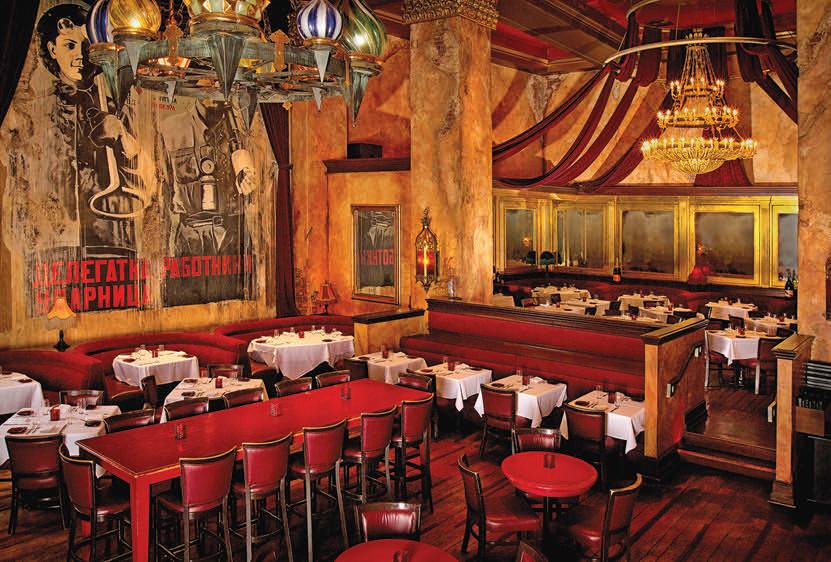
As Morgans Hotel Group and MGM resorts International are in the process of replacing the 1,017 rooms in the tower of Mandalay Bay’s old hotel with a new Delano Las Vegas—projected to open in early 2014—restaurant and nightclub pioneer the Light Group is also revamping the property’s restaurants, opening a nightclub, and amping up the overall energy. Mandalay’s dining scene has been strong since its 1999 opening, but in a town whose clubs and restaurants have a notoriously short shelf life, regular reinvigoration is a must. out are china Grill and red White and Blue; in are Light (a new cirque du soleil–themed nightspot), a revamped red square, and a citizens Kitchen & Bar. DuJour caught up with Light Group founder Andrew Sasson to find out his recommendations.
Having undergone a face-lift, the russian-inspired restaurant now offers more approachable favorites (think chicken Kiev with bacon Brussels sprouts) and a new range of inventive vodka-based cocktails—like the russian Apple Pie with Grey Goose, apple cider and Leopold Brothers Apple Liqueur. don’t miss: the zero-degree Vodka Vault. It’s hosted by a special ambassador who helps guests devise their own custom infusions. fur coats and russian-style military jackets are provided at the door. While you’re there, look for the statue of Lenin’s head frozen in a block of ice.
still American in concept, citizens now aims to be that place where you go for a great dinner at 4 a m after you’ve been clubbing. New design elements include
subway tiles and edison lights, ornate lampposts on the patio and counter stools with a view of the casino. don’t miss: Bacon-wrapped meat loaf and all the other comfort foods from chef Brian Massie that Vegas visitors crave after a big night out.
Light is the name of the club that started the scene at the Bellagio, but the moniker is the only holdover. the club, which opens this month, “is a marriage between cirque du soleil and the nightclub,” sasson says. “the deejays are the main focus.” expect a massive sensory overload: 38,000 square feet of cirque theatrics, performers, video, and you in the middle.
don’t miss: the upholstered-leather tunnel from the casino—which leads you into the space—has the urban-chic feel of an abandoned warehouse.






















For the new year, all 424 of the rooms and suites at Four Seasons Hotel Las Vegas (fourseasons.com) underwent a modern, Art Deco–inspired transformation. It’s much improved—backlit lighting makes the bathrooms wonderful places for basking, and, perched high in the Mandalay Bay tower, there are stunning views from the floor-to-ceiling windows. It’s also more high-tech: All the televisions now have multimedia hubs (in the baths, they’re integrated into mirrors).
As the Palms Casino Resort (palms.com) redesigns its rooms in the Palms tower, big changes are under way elsewhere. The ONE Group, known for high-energy hot spots and restaurants, is building Xishi, a sexy lounge with a DJ spinning nightly, offering casual bites as well as a full menu of Pan-Asian fare. Next


door on the casino floor is the sports-themed Heraea, also from the oNe Group.
the MGM Grand’s massive $160 million renovation (thegrandrenovation.com) to its 3,570 rooms and 642 suites is complete. It includes a major greening (LeD lighting and solar-powered shades were installed), but the jewel in its refurbished crown is Hakkasan, opening on Memorial Day weekend.
A new venue has arrived at Encore at Wynn Las Vegas (wynnlasvegas.com). Named Andrea’s by ceo steve Wynn in tribute to his wife, the Asian restaurant will be helmed by Joseph elevado the boîte, which sparkles with champagne-colored Venetian glass, is sure to be packed, both for the music (thanks to resident DJ Steve Angello of Swedish House Mafia) and for its vast menu. Diners can sample Dungeness crab fried rice, duck confit and shareable dishes.

She has been called the mother of reinvention, and Diane von Furstenberg’s dynamism is in full effect in her new store concept in the Forum Shops at Caesars Palace. The black-and-white interior features dramatic canvas wall coverings in black steel frames, setting off the designer’s trademark colors and patterns. “The Vegas woman is bold, and she embraces color. She is not afraid to go for it,” von Furstenberg says. In the new space, look for an expanded accessories lounge accented by her iconic lip pattern. While in Vegas, you just might see DVF herself: perhaps staying at the Wynn, browsing the Forum Shops or the Shoppes at the Palazzo—home of her first Vegas store—or dining at Le Cirque or Guy Savoy. dvf.com
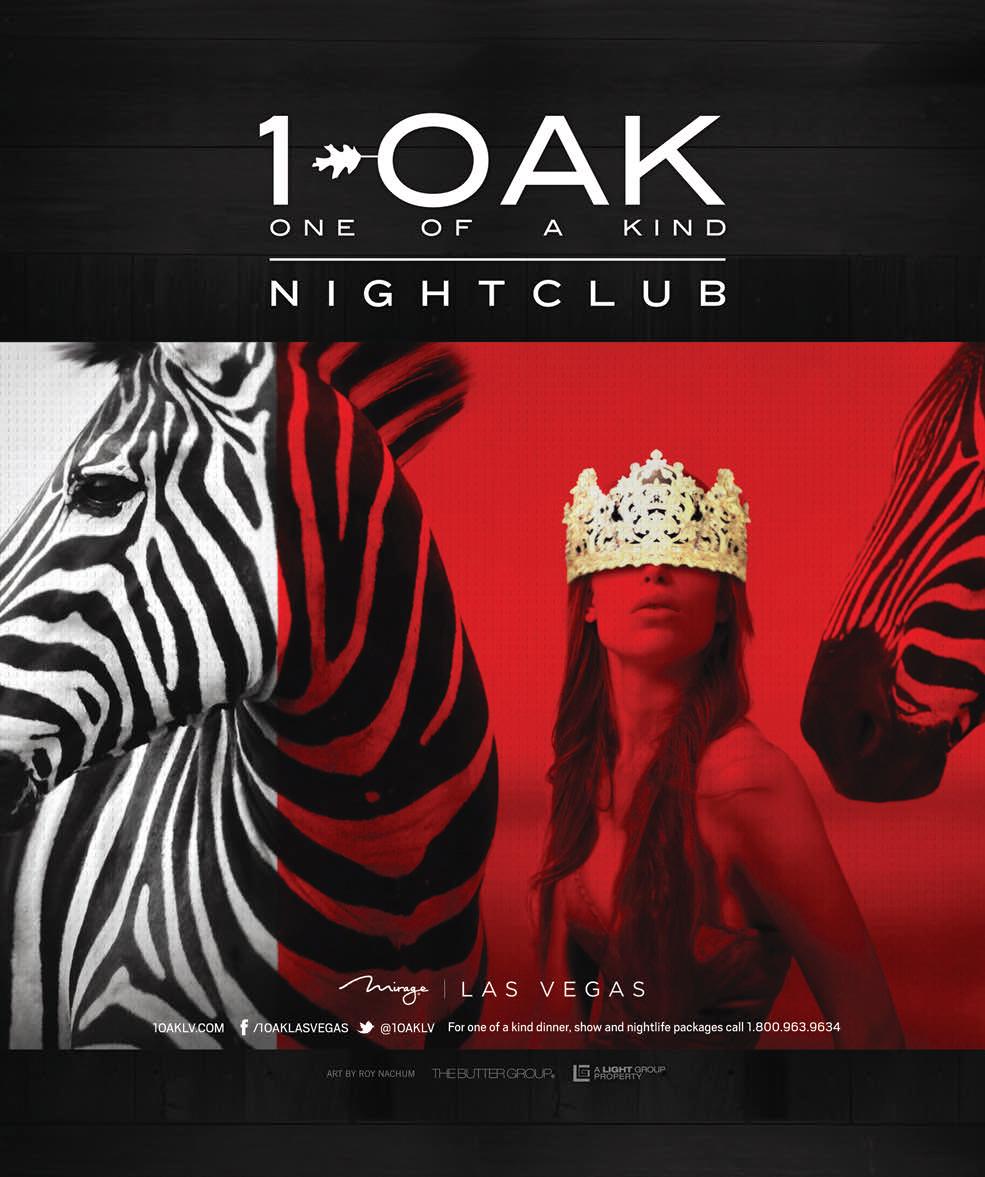
2600 West Harmon Avenue
vdara.com

At spa & salon Vdara, the therapists specialize in holistic health. the massages, treatments and facials are built around natural ingredients from herbs, flowers and fruits, like a cactus and agave nectar toning wrap or an Italian blood orange flowers “hold life” ritual for the body. for extra detox, get a four-hands massage, and to add to your relaxation, spend the rest of your day in one of the six spa cabanas at the Vdara Pool & Lounge.
3400 Las Vegas Boulevard South mirage.com
At the Mirage, achieve Zen-like calm in the underwater viewing area at siegfried & roy’s secret Garden and Dolphin Habitat, where you can practice your poses in a 60-minute session with an instructor as the habitat’s resident mammals swim by. take it one step further and pair up with a flippered friend to paint a work of art together. We’re serious—you even get to take the masterpiece home with you.


arialasvegas.com
3730 Las Vegas Boulevard



sign up for a hike at Aria resort & casino, and a personal trainer will lead you through sets of stair climbs, squats, push-ups and crunches. It’s grueling but also edifying—the workout also includes a tour of citycenter’s $40 million art collection (which houses works by Henry Moore and Jenny Holzer). consider capping off the experience with a relaxing breather in the softly illuminated shio salt room at the spa & salon.
3600 Las Vegas Boulevard South bellagio.com
With Aquastretch at spa Bellagio, you’ll work on stretching and decompressing with a therapist in an otherwise empty pool—and the only therapy pool on the strip. As you lie in the water, buoyed by floats, you’ll be gently massaged and stretched. It’s like getting a thai massage in four feet of 94-degree water. Book a couples treatment to share the bliss with a loved one.—Andrea Bennett
Naughty nightclub owner Simon Hammerstein has landed in Vegas! His New york and London clubs offer everything from titillating burlesque to drag striptease, and you can expect more of the same—with heightened theatrics—at the Act at the Palazzo. No expense was spared at this new venture: Windows were sourced from Grand central station’s old post office; the wood paneling, doors and mirrors came from other historic locations; and the madcap, 15,000-square-foot labyrinth includes theater boxes, all the better from which to see whatever pops out next. palazzo.com














3922 West Sunset Boulevard intelligentsiacoffee.com


Hipster central. Local-wildlife sightings include the indie-rock blogger, the Girl Who Thinks Lena Dunham Stole Her Life and the underemployed screenwriter.
A trailblazer in carrying directtrade and seasonal coffees, this Chicago-based company continues to raise the bar with its expert baristas and latte art.

“Irony is dead.”
582 Mateo Street handsomecoffee.com

2000 Avenue of the Stars coffeebean.com
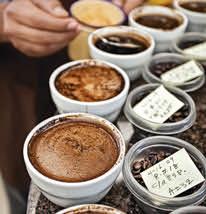
925 Montana Avenue caffeluxxe.com





Coffee downtown jonesing for a caffeine
snobs, 9-to-5ers fix
This coffee shop is so serious that it sells only three items (espresso, coffee, au lait) and offers nothing (sugar substitutes, soy milk) that might compromise the joe.
Proof
“One venti soy-milk mocha Frappuccino, extra whip, please.”
In the morning, harried assistants fetching their higher-ups’ orders; during the rest of the day, a stream of industry talent and the agents who shill for them
CBTL—as loyalists call it— delivers a solid cup of joe, if not quite of the same caliber as nearby offerings. Extra points for being native to SoCal.
In the spring, CBTL will debut new beverages like tea cappuccino and a selection of sweet teas like agave, mint and blood orange.
“One second—I’ll text you the script.”
Santa Monica’s usual suspects: car-pool moms, producer types, off-duty celebs like Jessica Alba and Michelle Williams
Taking cues from northern Italy, Caffe Luxxe brews a chocolaty espresso (called Testa Rossa). Pair it with steamed milk in a latte, and…that’s amore.


in flavors like mint and orange
Macaroons, seasonal and blossom


“You know what Brentwood Country Mart could really use? A Hot Topic.”



The laidback SoCal lifestyle is a vital influence on Tommy Hilfiger, so it was only natural that the designer would want to put down retail roots here. “I’ve always looked to L.A. for new ways to mix the four elements of F.A.M.E.—fashion, art, music and entertainment—into my designs,” he says. The North Robertson Boulevard store houses the entire array of Hilfiger products amid design elements that reflect its Hollywood backdrop. “There’s a VIP fitting room featuring a rotating display of iconic celebrity pieces from our vintage archives,” he says. usa.tommy.com
“The patio at Chateau Marmont. There’s always a cool mix of people; it’s a great atmosphere.”
“The Peninsula in Beverly Hills. The rooms feel like a home away from home.”
“Vintage shops in L.A. are unparalleled—like Decades, American Rag, What Goes Around Comes Around and Lily et Cie. Their owners are like curators.”
“If I’m traveling with my wife, Dee, we usually head to Madeo for lunch right after we check in.”

Running errands in yoga pants and a sports bra is as much an L.A. rite of passage as getting your first parking ticket. And no one does fresh-off-the-elliptical fashion better than high-performance women’s wear label Splits59. “Our designs’ fabrications and silhouettes are stylish without compromising functionality,” says co-founder Jonathan Schwartz (son of Calvin Klein executive Barry Schwartz).
In 2008, Schwartz launched the line in Venice with friend and former Dolce & Gabbana market-
ing guru Keith Peterson. As for why he opted for SoCal over NYC, Schwartz says, “It felt a bit disingenuous to be on Seventh Avenue. We wanted to be close to the culture we cater to.”
a former U.S. female competitor, so there are Flo-Jo running shorts and Serena W. embroidered tanks. “It was our way of paying homage to these incredible women,” Schwartz says. splits59.com




Peterson


For the is on color and also back their mesh


For spring, the pair is focusing geometric shapes, color blocking and ergonomic seaming. They also brought back their popular mesh inlays. “It offers transparency in strategic places,” Peterson explains. “You can wear a poppy-colored bra and show a little peek of it.” Inspired by the 2012 Summer Olympics, each piece is named after
Spring fever is sweeping L.A. this season with capsule collaborations and special projects from a bevy of designers. In April, jeweler Martin Katz celebrates his 25th anniversary with a retrospective collection by digging deep into the vault for iconic pieces like the chandelier Rain earrings and the floating necklace named for Julianna Margulies (martinkatz.com). Citizens of Humanity is marking an anniversary—its 10th—with a pop-up shop in West Hollywood that carries both COH apparel and local artisans’ wares. (citizensofhumanity. com). Also in April, Guess rocks

out with its Music Festival collection. Inspired by Coachella, the line features festival-appropriate attire such as reworked vintage music tees and studded denim jackets (guess. com). Meanwhile, perfumer Lisa Hoffman and jeweler Tom Binns are adding earrings to their line of scented jewelry, graced with unique scents like Japanese agarwood and Madagascar orchid. Asked if she has any plans to continue working with Binns, Hoffman—who is married to actor Dustin—jokes, “I’ve been thinking about leaving my husband for Tom. I’d be honored to collaborate with him on any project” (lisahoffmanbeauty.com ).


Frustrated by L.A. car culture’s sizable carbon footprint, eco-minded designer Stella McCartney selected the new Ford C-Max hybrid as the official vehicle of her Beverly Boulevard boutique. Averaging 47 mpg, it zips around town, delivering McCartney’s designs to VIP clientele, and rarely needs to stop to refuel. “Stella McCartney is a shining example of a designer who walks the walk and talks the talk when it comes to living green,” says Ford eco-ambassador Danny Seo. “Now her L.A. store is driving the drive!” Ford C-Max hybrid, starting at $25,200, ford.com

Stop at the new Burberry store another branded suite to its already chic collection (Dior and Tiffany are two others) via a collaboration with English luxury carmaker Bentley. The 1,700-square-foot suite features opulent design flourishes like glittering crystal chandeliers and a tufted leat flooion (Dior and Tiffany are two others) via a collaboration with English luxury carmaker Bentley. The 1,700-square-foot suite features opulent design flourishes like glittering crystal chandeMulsanne for use within a 10-block radius. (stregisnewyork.com) C.N.

When it comes to cultivating an online voice, all the experts agree: Blog what you know. For Marlien Rentmeester, the impeccably dressed former West Coast editor of Lucky magazine, that means fashion—specifically, affordable fashion. On her popular site Le Catch (lecatch.com), Rentmeester culls pieces from every price point (a Proenza Schouler PS1 bag, a Forever 21 sweater, a J.Crew skirt) to create effortlessly chic, shoppable ensembles. Meanwhile, at Spoon Fork Bacon (spoonforkbacon.com), food professionals Jenny Park (a stylist) and Teri-Lyn Fisher (a photographer) pool their extensive knowhow to devise easyto-follow yet inspired recipes like apple-pie egg rolls and boozy bacon jam. Boasting ravishing images, the site is worth a look for the food-porn factor alone. And if you’d like some lessons in living the good life, check out Heather Taylor’s L.A. in Bloom (lainbloom. blogspot.com), where the gallerist and linen designer serves as a Martha Stewart to the indie set, chronicling her charmed day-to-day existence while doling out advice on everything from floral arrangements to must-try beauty products.
Natalie Portman has discovered a big perk of life in L.A.: a garden that blooms year-round. “There are all these oranges blossoming in my garden,” says the Oscar-winning actress. “It’s an amazing night fragrance.” Not that Portman has much time to stop and smell ’em. She has been juggling family life (she has a son, Aleph, with her husband, choreographer Benjamin Millepied), a white-hot fi lm career (she just wrapped back-to-back Terrence Malick fi lms) and brand-ambassador duties as the face of the Miss Dior fragrance. This spring, her plate is particularly full: Portman will be promoting the newly redesigned scent, which Dior’s in-house nose François Demachy created. With top notes of Bulgarian rose, blood orange and Tunisian neroli oil, the perfume is as lovely its spokesmodel. Almost. dior.com
Having seen the toll that inconsistent sunscreen use took on her skin, Vicki Nguyen designed a skin-care line packed with ingredients to combat UV damage. Natural skin-brightening extracts, like licorice root, target hyperpigmentation; tripeptide-38 smooths out wrinkles; and alpha hydroxy acids promote cell turnover. Her products’ multitasking magic makes them great for busy women who, Nguyen says, “don’t have time to use several different regimens for each skin-care issue.” fairiche.com


Inspired by their father, a renowned professor of plastic surgery, sisters Rachel and Liz Edlich developed an antiaging product range that gets tough on fine lines and wrinkles. Its effectiveness lies in its Trylacel technology, which preserves antioxidants at their maximum potency; clinical trials showed an antioxidant component 300 percent more powerful than that of major brands.
“When our friends started knocking down our door for more products,” says Rachel, “I knew we had something very special.” radicalskincare.com
The purveyor of the perfect blowout is reaching new heights. The L.A.-based company is debuting a range of hair-care products and tools, all developed by founder Alli Webb, designed to enhance its signature service. “I wanted it all to be about what’s perfect for us,” she says. Riffing on the company’s bar motif, the goods have names like Happy Hour conditioner and the Morning After shower cap. Webb’s personal favorite?
“The 100 Proof smoothing oil. It’s great for layering and doesn’t get too greasy or heavy.” thedrybar.com

Armed with only a pair of tweezers, the California native first made a name for herself at Warren-Tricomi in New York City with her less-ismore approach, steering clients away from the pencil-thin, overplucked look and using custom tinting to lend a sense of thickness and definition to eyebrows.
Ask any L.A. beauty insider whom she goes to for her brows, and you’ll probably get one of two answers: Kristie Streicher or Kelley Baker. Both women opened studios last year, catapulting each from next big thing to bona fide guru. Having sampled their handiwork, we’d be hard-pressed to pick a favorite. So let geography guide your choice: Streicher is in WeHo; Baker, in Venice.

Kelley Baker Brows
Beverly Hills brow king Damone Roberts handpicked Baker to be his protégé in the late ’90s. After honing her craft at his salon, she took a brief detour into makeup before returning to her fi rst trade. Now you can fi nd her at an Abbot Kinney salon, across from Steven Alan.
For the Feathered Brow, Streicher narrows the arch but leaves the ends fuller to achieve a natural—and slightly untamed—effect that frames the face and distracts from dark circles. Think Jennifer Connelly and Keira Knightley.
Baker spends up to 45 minutes with each client, alternating between waxing and tweezing to create full, well-groomed arches that accentuate the eyes and bone structure. Clients with bushy brows, take note: She’s a whiz at trimming.
Her custom-blended salves for pre- (Aforé oil) as well as post- (Après calming cream) tweezing treatments help minimize redness and irritation.
She recently launched a product line that includes brow powder, brow gel, a highlighter pencil and tweezers. A DIY brow-shaping class is in the works for spring.
The Getty’s “Overdrive: L.A. Constructs the Future, 19401990” offers a glimpse of the city’s golden years of urban planning through a series of drawings, films, models, oral histories and photographs. Here’s your chance to learn about, for example, the origins of the freeway network (through July 21). Meanwhile, 2013 will be another good year for Ed Ruscha. Fresh off a LACMA exhibition (and the “Overdrive” show), the L.A. artist will be in the spotlight again with “In Focus: Ed Ruscha, ” a survey that examines the role of photography throughout his career (through September 29; getty.edu).
MOCA takes a walk on the wild side with the first large-scale retrospective dedicated to the famously provocative Swiss artist Urs Fischer.
The exhibit clocks in at more than 65,000 square feet, and nearly all of Fischer’s important works from the past decade are present and accounted for—from skeleton sculptures to houses made of bread (through August 19; moca.org).
Zhe School and early Ming Dynasty court paintings are the subjects of the “Ming Masterpieces” at LACMA. With pieces on loan from the Shanghai Museum’s permanent collection, it explores the art’s implicit political agendas. Opening the same day, “Matisse: La Gerbe” focuses on the large ceramic wall that an L.A. couple commissioned in 1952. The artist died two years later; the wall, which echoes the design of his iconic multicolored cutouts, is one of his final major works (both through June 2; lacma.org).



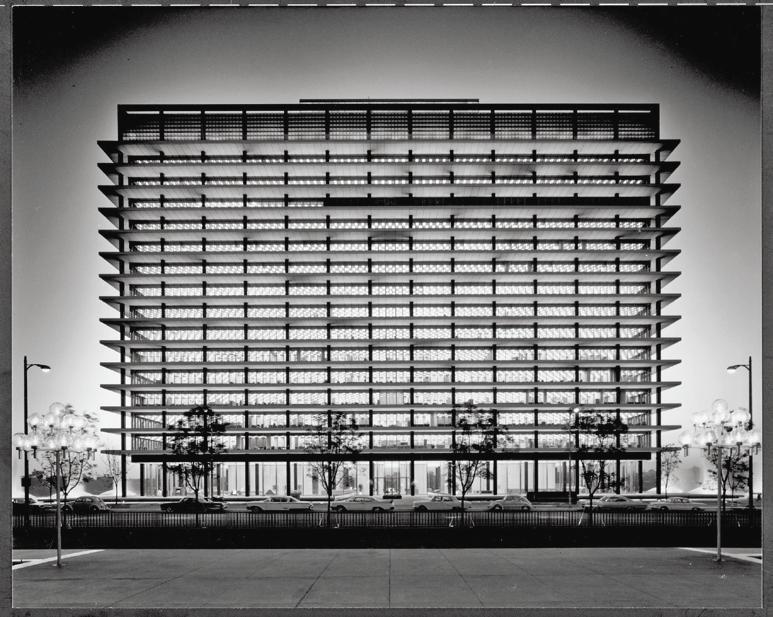





The East Coast luxury brand received a warm West Coast welcome at a poolside dinner hosted by Ali Larter, Minnie Mortimer and Claiborne Swanson Frank at the Sunset Tower Hotel. “I never compromise quality when it comes to accessories. That’s what I love about Devi Kroell— it’s modern and luxurious and never goes out of style,” says jewelry designer Anita Ko To the delight of partygoers including Crystal Lourd, Liz Goldwyn and Shiva Rose, the brand came bearing gifts: luxe skin pieces from the spring/ summer collection! Given that the label is soon opening an L.A. boutique, it was a preview of good things to come.

3328 North Miami Avenue copperbox.com
the secret supper club has arrived in miami. chef gabriela machado’s copperbox uses lavish, intimate dinner parties (there’s a maximum of 24 guests) for her guerrilla gourmet experiments. on thursdays and saturdays, atelier Nights begin with bubbles and hors d’oeuvres, before eight seasonal courses are served. a sommelier pairs wines with each dish (after dinner, corkage is available). it’s no wonder these events, sometimes announced only 72 hours beforehand, have waiting lists.
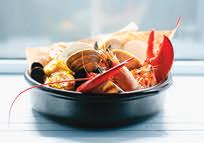
1111 SW 1st Avenue
hoxtonmiami.com
a Nobu alum’s British-inspired trio has blossomed in Brickell. Diners can start their night with happy hour at the Hoxton, a beach house with live music and classic cocktails with miami twists, and continue on to rustic fare (think grass-fed butcher steaks and hearty vegan entrées) at BoxPark before spending the night over drinks at lounge Harvey Wolf.

247 23rd Street
jelsomino.us
Finding a decent karaoke venue in south Beach is tough. But that’s changing a bit thanks to Jelsomino, an upscale spin-off of an Nyc club. Book private rooms or take the main stage with backup singers and fog machines. and while waiting your turn to belt out the Verve, sip the Bitter sweet symphony cocktail, a moscow mule/mojito mashup.
601 Biscayne Boulevard
hydeaaarena.com
Hot on the heels of opening a location at the sls Hotel, los angeles import Hyde lounge makes it a double with this outpost at americanairlines arena. But the venues couldn’t be more different. While the design of the beach’s Hyde borrows from midcentury Florida, the across-the-bay spot took design inspiration from butterfly cocoons.
565 NW 24th Street
wynwoodbrewing.com
mojito-mad miamians are warming up to good old american beer. case in point: Wynwood Brewing company, which has opened a facility with tasting and tap rooms in the arts district. “it’s the perfect location, since our beers are like works of art,” founder luis Brignoni says. two standout brews: a blonde ale and a double iPa with notes of mango and guava.
1661 Meridian Avenue
khongmiami.com

the folks behind the perpetually packed yardbird southern table & Bar are hoping to do the same for regional thai specialties that they did for fried chicken. Khong river House has a team of chefs from tiny thai towns who have tapped local farmers to grow unusual ingredients like galanga and pandan leaves so they can prepare dishes like those sold in street markets back home. Will miami diners warm to boat noodles, char-grilled issan sausage and marinated meats served steaming in banana leaves? all signs point to yes, and the house tropical cocktails—showcasing gin rather than rum—should help convert any nonbelievers. a smart selection of dry rieslings and fun gin concoctions also serve as perfect pairings for the spicy asian cuisine.
3620 NE 2nd Avenue
thecypressroom.com
Blink and you’ll miss farm-totable chef michael schwartz’s latest, the cypress room, tucked near a freeway overpass in the Design District.
35 NE 40th Street oaktavernmiami.com
chef and restaurateur David Bracha has delivered another pearl to patrons of Brickell’s the river seafood & oyster Bar. But rather than a menu of mostly seafood, his followup, oak tavern in the miami Design District, serves stick-to-your-sides small plates (think gnocchi with rabbit sausage and white truffles, as well as housemade charcuterie and artisanal cheese boards). With a prime location—opt for seats under the majestic oak tree in the charming courtyard— Bracha has added another feather to his toque.
465 Brickell Avenue cipriani.com
Also: Giorgio Rapicavoli’s beloved Coral Gables Eating House restaurant has made the leap from pop-up to permanent. eatinghousemiami.com
london’s famed cipriani completes downtown miami’s overnight transformation from ugly duckling to swan. Designed by michele Bönan (the same architect behind Downtown mayfair in london and Downtown ibiza, as well as cipriani monte carlo), the blue and white nautical décor suits the glamorous bayside setting. It’s the first miami venture for maggio and ignazio cipriani, whose greatgrandfather founded Harry’s Bar in Venice—hence, their bar’s familiar layout—and whose grandfather and father are also veteran restaurateurs. consider-
ing their mentors have hosted Queen elizabeth ii, as well as Hollywood royalty, there’s no telling what boldface names will visit this two-story hot spot.
210 23rd Street toscamiami.com
maison d’azur proprietor stephan Fortier is back on the beach with tosca. most of the places on collins avenue boast about sourcing the finest ingredients, but Fortier’s meticulous research—reflected in the hefty prices—manages to one-up even the snootiest restaurants. For example, why settle for plain lobster when you can dine on

one-in-2-million blue specimens? Kobe ribeye graded a5 with 12 marbling, Pata Negra Jamón aged 36 months and white truffles from Italy’s Alba region also appear in his menu of delicacies.





1545 Collins Avenue
jameshotels.com
With one of the most fun and enlightened menus in the state, chef Kris Wessel revisits family recipes for his Florida cookery at the James royal Palm Hotel. a descendant of miami Beach pioneers, he produces sun-kissed appetizers like alligator empanadas and corvinaand-grapefruit ceviche and creative entrées like the wild boar chops and sorrel-lychee-glazed local quail—served with pork-studded pink lentils and a watercress salad dressed in a hibiscus infusion.
2727 Indian Creek Drive
thefreehand.com
travelers nostalgic for the easy camaraderie of summer-camp days, but who also want grownup amenities, will fi nd their desires fulfi lled at the Freehand. the communal-style boutique hostel (from the same team behind New york city’s Nomad and the ace properties in New york and Palm springs) opened just in time for art Basel. the aesthetically minded crowd appreciated the Hamptons-chic interiors, as well as work by miami-based collage artist sky Farrell. But it’s as social a place to stay as it is stylish: guests can enjoy movie nights, games of ping pong, and meals from Jeremiah Bullfrog, founder of one of miami’s most popular food trucks. enjoy a cocktail from Broken shaker, concocted with herbs from the Freehand’s garden.

If anyone knows how to party in style, it’s the people behind the Bal Harbour Shops. The luxury center closed early one evening to throw a fund-raising bash for Miami Project to Cure Paralysis’s Buoniconti Fund, along with presenters Micky and Madeleine Arison and honorary co-chairs Tommy Lee and Dawn Jones Guests supped on delicacies from Barton G. under the stars as Emilio Pucci creative director Peter Dundas presented his latest collection. “I love how he strategically placed transparent panels instead of going for overt sexuality. It’s just about finding the right undergarments!” says attendee Kim Wood An Enrique Iglesias concert was the cherry atop the overthe-top evening that raked in $31 million.




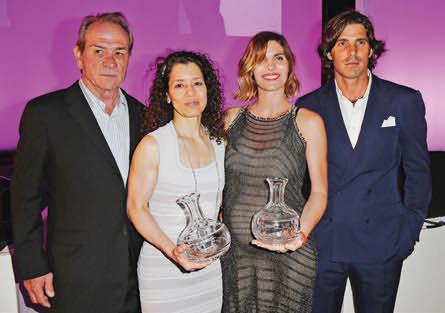

















100 NE 11th Street

Now that the miami Design District has gone full-blown luxury, much of its art crowd has decamped for downtown. that includes DWNtWN artHouse, an artists’ community housed in the former captain Harry’s Fishing supply along the city’s rough-and-tumble nightclub row. the miami Downtown Development authority came to the rescue of displaced artists whose studios were being razed to make way for boutiques—this property is a temporary donation by urban developers miami Worldcenter associates.
as part of the Design District’s model of development through art, Naomi Fisher and Jim Drain, her beau and fellow artist, relocated their studios and BFi, an exhibition and cultural programming nonprofit, to the 20,000-squarefoot compound, Fisher says. “the move gave us the chance to rebrand BFi to mean several things such as Build Future investments and Beach Front imports, depending on the show, and to establish its new mission to celebrate the city’s unique qualities and offbeat people and places.” also at the DWNtWN artHouse are turnBased Press print shop and the
studios of tm sisters and of Frances trombly (an artist who’s one third of the on-site, artist-run gallery Dimensions Variable), among others.
art Basel miami Beach goers got a taste for what’s to come from BFi during its Weird miami bus tour where participants made memorable stops at a teeth-grill fabricator in Hialeah, a lively cuban city within miami-Dade county, all to a soundtrack of vintage mix tapes streaming through the coach’s speakers. Fisher plans to offer customized tours that dovetail with its exhibits.
so a tour of chicago-based tyson reeder’s beach paintings series will give visitors postcard-worthy views and studio time on the sand just as the impressionists had painted en plein air. “oddly, it took an out-oftowner to see the beach as a subject that miami artists never seem to notice,” says Fisher, who also hosts Super 8 Night film screenings and art theory discussions. “We want to broaden art’s accessibility without dumbing it down.” basfisherinvitational.com, dimensionsvariable. net, turnbasedpress.com, davidcastillogallery.com

The French maker of fine linens has unveiled a new collection with motifs—starfish, parakeets and shells--inspired by America’s most tropical city. “Miami’s crisp, clean architecture recalled our white percale linens,” says designer Evelyne Julienne of “Postcards from Miami,” carried at the house’s New York store and at ThreadCount in the Miami Design District. “We emulated the vibrant flora and fauna that pop here.” yvesdelorme.com

9700 Collins Avenue toryburch.com
at tory Burch’s new Bal Harbour shops boutique, the concept is beach. amid a soft, island-inspired color palette, special touches like hand-stenciled painted tables complement sea-foam concrete floors, coral-print walls, pale pink sofas and denim-blue drapes. “We always consider location when designing our stores,” Burch says, “but it still feels like our aesthetic.” That means you’ll still find her signature orange lacquer doors. Here, the designer’s favorite places to be and to be seen in miami.
“Nothing beats the pool here, with its scented towels and grove of towering palm trees.”
“The Frank Gehry–designed space is worth a visit. It looks and sounds amazing.”
“Its outdoor patio is the perfect place for dinner. Order one of their fresh seafood pastas.”
“This eclectic vintage clothing store has everything from Edwardian blouses to motorcycle boots.”




the locals are lauding s outh Beach’s historic warehouse district

1905 Purdy Avenue eberjey.com
For the décor of its second miami boutique, the favorite hometown lingerie line opted for a blend of beach and industrial chic. metal chairs, cloth mannequins and whitewashed wood floors provide a stark backdrop for lacy underpinnings and pajama sets in liberty london prints. also available are stylish swimsuits and cover-ups.
1787 Purdy Avenue pbsteak.com
Neighborhood pioneer Pubbelly multiplies yet again. PB steak, the restaurant group’s fifth culinary concept, tackles regionally sourced surf and turf in a dining room of reclaimed wood walls, black tufted-leather banquettes and a communal table. along with the small plates, like bluecrab bread pudding, there is an extensive raw bar.
1935 West Avenue jugofresh.com
Proving miami isn’t all about partying and overindulgence, Jugofresh churns out cold-pressed juices, superfood smoothies and raw, vegan fare. For new breakfast on-the-go ideas, try its raw oatmeal with cashew “mylk,” agave, vanilla and grey sea salt or its take on the açai bowl with Brazil nuts, seasonal fruit, mint and raw honey.
1919 Purdy Avenue flywheelsports.com
Flywheel’s cycling classes reinvented cardio; upstairs studio FlyBarre is now reinvigorating body sculpting. instructors inject excitement into the intervalbased class—a mix of circuit training, yoga, Pilates, stretching and strength building—with their custom playlists. Ballet barres in two heights mean tall and petite friends can work out together.
1875 Purdy Avenue panthercoffee.com
the young couple who jumpstarted miami’s cafe culture with Wynwood’s Panther coffee have opened a second, larger location across the bay. caffeine addicts can still get limited-edition roasted beans, as well as pastries like pão de queijo (Brazilian cheese bread). stop by on saturdays for complimentary cuppings, or tastings.
Rebecca Kleinman







dujour ’s Jason Binn hits the town and captures the spirit of his second home, miami, in snapshots




has shot her reality show here for years but had never been to C. Madeleine’s until our cover shoot. She shopped the store’s vintage treasures while wearing a Lanvin top and pants and an Invicta watch. Speaking of Invicta, I bumped into its CEO Eyal Lalo the next day, a Miami native who loves yellow (even

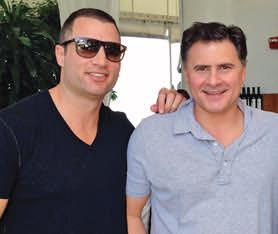




It’s all about giving back. I stopped by the Eden Roc Resort during Art Basel and dined with general manager Greg Cook and executive chairman Bill Marriott. Afterward we headed to the ballroom for Miami Heat player Shane Battier and his wife Heidi’s South Beach Battioke fundraiser for their Battier Take Charge Foundation, which funds education and scholarships for at-risk youth.—J.B.
intermiX starts its neXt chapter
PHOTOGRAPHED BY
DUSTIN COHENEarly in their careers, brothers Khajak and Haro Keledjian set out to do much more than just build a store: They wanted to transform the way people shopped. “Most customers were geared to buying headto-toe single-designer outfits,” khajak says of the prevailing retail experience in 1993, when he and Haro opened the first intermix in the flatiron district. in that shop, the inventory was not displayed by brand; instead, it was mixed, matched and merchandised with the aim of creating a specific look. “in a way, we became the stylist,” he says. This ingenious approach, which championed personal style, was a hit in Manhattan. And it didn’t take long for the one-store operation, where Khajak wore every hat, from buyer to sales-floor manager, and Haro oversaw the back end, to grow into what intermix is today. now, just weeks after joining retail heavyweight Gap’s family of brands, the men are preparing to open a boutique on the Bowery. They’re careful to make sure the same ingredients—stock that speaks directly to neighborhood residents and an interior that complements the clothing—that have gone into every one of their bricks-andmortar stores are present. “We have a different profile for who the intermix customer is based on where it is,”

Khajak explains. “There’s uptown, downtown, Greenwich, Miami. So even though we have more than 30 stores, each shop comes across as very specific to that location.” the Bowery outpost, with its exposed brick, tin ceiling and lush greenery covering the walls, will feature some of the edgiest pieces yet for intermix, a fitting way for the brothers to embark on their next 20 years in business. intermixonline.com
—Chadner Navarro
Denim-brand founder (he created Paper Denim & Cloth and Earnest Sewn) and lover (he owns more than 300 pairs of jeans) Scott Morrison took on his most ambitious project with high-end label 3x1. His 4,000-square-foot atelier in SoHo targets fellow diehards with its bespoke service, which starts at $1,200 and includes the customer’s choice of 175 different fabrics and some one-on-one time with Morrison himself. “This is a passion project for me,” he explains. “This was about pulling back and doing something really special.” So special that after only a couple of years, 3x1 has already found a fan base among influencers like Karlie Kloss, Jack Dorsey, Orlando Bloom and Scott Schuman. “What I like most about 3x1 is simply the fit of the jeans, but the ability to customize is like icing on the cake,” Schuman says. 3x1.us









Knits are getting a jolt of excitement, thanks to local fashion label Orley, a justlaunched family operation from Samantha Florence and brothers Alex and Matthew Orley. With an emphasis on playfulness, the downtown trio’s line of vibrant sweaters, scarves and hats comes in fi negauge cashmere/silk blends and cottons that transition well to warmer months. Orley’s fall collection evoked both Mondrian and Malayan tigers, and this season’s line abounds with subtle abstract geometric patterns inspired by Islamic tapestries, in a palette of cotton-candy pastels. “I think these prints add a bit of unexpected youthfulness to the pieces,” says Alex Orley. orley.us









Designer Derek Lam’s empire shows no sign of slowing down. This season, his popular diffusion line 10 Crosby (named after the address of Lam’s SoHo flagship) debuts its first handbags. “There has been so much enthusiasm for 10 Crosby—expanding was a natural progression,” says Lam, who started his label in 2003 after cutting his teeth at Michael Kors. While this line has only five styles, they’re the kinds of pieces that women about town will love: envelope clutches and slouchy hobos in deerskin and calf leather in soft, seasonal hues of yellow, sand and pistachio. They’re easy, effortless—and amazing. dereklam.com
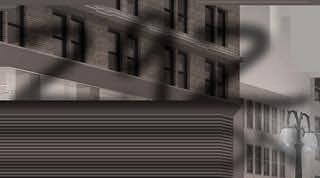


















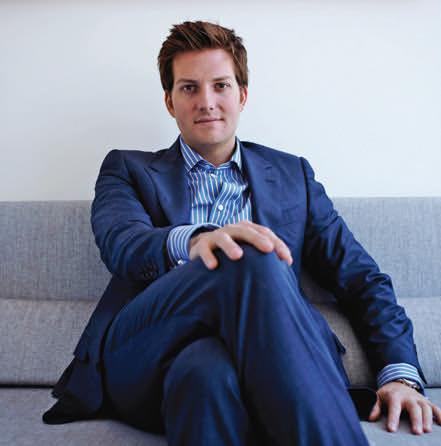
dr. Michael apa, a partner in the rosenthal apa Group, is taking dentistry to a new level, thanks to his expertise in the science of facial aging. to apa, a good smile is not just a function of the teeth and lips but also of how the face moves with the mouth. “people want to look natural. We’ve learned to create individuality with each patient,” he says. since 2007, he’s been perfecting the use of noninvasive procedures to slow the toll of time. “a good aesthetic dentist controls how the lower part of the face looks as you age,” apa explains. “it has a lot to do with the

grinding and the moving of teeth.” patients at his upper east side practice include entertainment figures and titans of industry; among them are chloë sevigny, Matt dillon and andré balazs. “i created a niche of people who want a natural aesthetic,” he says. “these customers find me.” Members of the Saudi royal family are among his most loyal patients—they bring all their sisters and brothers, shutting down his office for days when they’re in town. after your own appointment with apa, you too will have a smile fit for royalty. rosenthalapagrp.com



neatly clad in alligator loafers, Gino bifulco and his brother thomas stand atop custom-footwear empire t o dey, which has worked with everyone from Jerry seinfeld to Jennifer lopez. their cobblers have made backstage calls for Madonna and delivered emergency ballet shoes to lady Gaga. the bifulcos have been at the helm since their father, a shoemaker from italy, passed away. a visit to the store begins with a foot assessment, which is used to make a last—the wooden model around which any of the more than 300 leathers and exotic skins can be stretched and stitched. as many as eight different artisans
may work on each shoe. “Whatever you want, we can do,” says Gino, a third-generation cobbler. “one customer wanted a hornback alligator boot with horns everywhere, from vamp to heel. it took 10 skins, but we did it.” bifulco estimates that bill cosby must own 60 pairs. “When someone has a number of homes, they don’t want to carry shoes,” he explains. “they get multiple pairs and keep one here, one in aspen, one in palm beach.” still, you don’t need to be a celebrity to be treated like one at his shop. “our goal is to make everyone comfortable,” bifulco says. todeyshoes.com
Lindsey Keenan57 East 57th Street
fourseasons.com

There are plenty of famous faces at Manhattan’s luxurious four seasons Hotel, but backs are getting the real attention. in the hotel’s spa, guests and visitors alike clamor to get the Accupressure with Back-Walking massage ($245 for 50 minutes), which boosts circulation and relieves muscle tension. And if that’s not relaxing enough, the swanky spa also offers a sauna, steam room and whirlpool bath to melt away any tension left in your back—or any other body part.
35 West 21st Street dreamdry.com
rachel zoe has partnered with marketing maestro robin Moraetes to up the blow-dry-only game with dreamdry, a soon-to-be nationwide salon whose fi rst location has just bowed in the flatiron district. zoe and Moraetes’ hair destination boasts 13 styling options and client-based programs like personal profi les on the dreamdry website all geared to give you the perfect blowout every time.
1 West 58th Street, 4th Floor caudalie-usa.com
the new premier cru facial at the beauty house’s spa at the plaza hotel harnesses the anti-aging powers of its wine-based treatment to improve your visage. The 80-minute facial ($235 ) consists of an exfoliating scrub, a soothing massage and an application of caudalie’s fi rming and lifting premier cru cream.

501 Fifth Avenue joannavargas.com
in the spring, recovering from harsh winter climes can be as easy as trading in your heavy coat for lighter-weight attire. But your skin may require a bit more attention. at the Joanna vargas Midtown spa, the Berry Brightening facial ($250 ) is a 90-minute treatment designed to refresh the complexion after months of cold weather. A diamond peel

is followed by a thorough cleanse with vargas’ own vitamin c face wash, then a blueberry-and-paprika peel and a relaxing botanicalsrich strawberry-and-blueberry soy mask. “i love the fact that you are getting a detox from this treatment,” vargas explains. “it helps purge the toxins and particles in the skin that make it look uneven and dull.”


Gwen Whiting and Lindsey Boyd’s company, the Laundress, is known for its impossibly gentle detergents. Now, with the debut of a candle collection, the brand enters the realm of home goods. The line comprises three scented objets in gorgeous glass jars—Lady, Cedar and No247—all packed with a captivating combination of more than 15 different essential oils, including bergamot, grapefruit and rose. Candle set, $60, thelaundress.com
This spring’s selection of exciting exhibitions ranges from impressionist drawings on the upper east Side to pumps, sandals and booties in chelsea. now through May 22, the Guggenheim Museum is staging its first ubs Map Global art initiative show, entitled “No Country: Contemporary Art for South and Southeast Asia,” a visual study of artistic practices from india to the philippines; pieces shown will eventually become part of the museum’s permanent collection (guggenheim .org ). on March 12, visitors can view rarely seen prints and drawings by some of history’s most renowned painters, including degas, Gauguin and toulouselautrec, at the frick collection’s “The Impressionist Line from Degas to Toulouse-Lautrec: Drawings and Prints from the Clark” (frick.org ). Starting March 19, the Museum of Arts and design in columbus circle will host “Against the Grain: Wood in Contemporary Art, Craft and Design.” Expect to see more than 75 prime examples of modern woodworking—from oversize installations to furniture—created by the likes of ai Weiwei, Wendell castle and ursula von rydingsvard (madmuseum .org ). the neue Galerie’s “German Expressionism 1900–1930: Masterpieces from the Neue Galerie Collection” is a showcase of Expressionist works from paul klee, otto dix and Max beckmann, culled from the museum’s permanent collection of early 20th-century German and Austrian art, which largely explore themes of primitivism and modernity (through April 22; neuegalerie.org). for more fashionable fare, head to the Museum at fit and check out Shoe Obsession for a look at 150 extravagant pairs of heels from roger vivier, christian louboutin, Manolo blahnik and other designers (through April 13; fitnyc.edu).
Joe Davidson



KinKy boots With a book by Harvey Fierstein and songs by Cyndi Lauper, Kinky Boots follows Charlie Price (Stark Sands), a young man who inherits a struggling shoe factory, as he works with Lola (Billy Porter), a drag performer, to save it. Opens April 4 at the Al Hirschfeld Theatre. kinkybootsthemusical.com
the nance Playwright Douglas Carter Beane brings his latest work of genius to Lincoln Center Theater. In The Nance, a gay man (Nathan Lane) plays a campy version of himself to big laughs on the burlesque stages of 1930s New York—but his personal life isn’t so funny. Opens April 15. lct.org

dom pérignon hosted art-world fi xtures like Anne Pasternak and Casey Neistat, along with tv and music stars Kelly Rutherford and K’Naan, at the historic St. Bartholemew’s church on park avenue to celebrate its collaborative project, the power of creation. the evening kicked off with spellbinding performances by Lang Lang and John Legend, followed by a special dinner prepared by lure fish bar’s Josh Capon, who created dishes to pair with three fantastic dom pérignon vintages.













the Museum of Modern art’s fi fth annual film benefit honored iconoclastic writer and director Quentin Tarantino The night started with a presentation of his work, showing clips from award-winning fi lms like Pulp Fiction and Inglourious Basterds Guests then went to the mezzanine of the roy and niuta Titus Theater for dinner and entertainment. After dessert, Jamie Foxx, Christoph Waltz , Harvey Weinstein and Georgina Chapman (co-chairs for the evening), Harvey Keitel and Katie Holmes hit the dance floor while Wu-tang clan’s RZA performed for the crowd.— Lindley Pless







Local purveyor Paramount Caviar has tapped Le Bernardin’s Eric Ripert for a brand-new creation. Made of roe farmed in Italy, China and Israel, the caviar is both nutty and briny. “I love its creamy texture, and the quality for me is key,” Ripert says. $525/4 oz., paramountcaviar.com
In this town, deciding on a place to eat is never a simple proposition. The options are endless: Should you go to the new fusion joint on the LES, stick with a tried-and-true favorite in Midtown or experiment with that new food truck... and where is it parked? This season, a spate of hot spots are clamoring for your reservation. Chef Matthew Lightner’s Michelinstarred Financial District spot Atera has been tough to get into (especially because it seats fewer than 20), but now that it’s expanding into a subterranean lounge, visitors will have more tables to fight over. The main dining room won fans with its unusual but delicious New American fare, from foie gras peanuts to cured scallops with meringue. The lounge, done up to look like an old-school den with glamorous herringbone flooring and blue leather sofas, serves a limited menu and cocktails. “The drinks carry an element of surprise,” Lightner says. A perfect example: The tequila cocktail includes a mezcal float, geranium and juiced grapefruit, lending a citrusy flavor with a hint of bitterness and giving the drink more depth. ateranyc.com



Through 2013, Park Avenue restaurant takes over for the neighboring Loews Regency Hotel during its renovation (parkavenyc.com ); JeanGeorges replaces Pipa at ABC Carpet & Home with ABC Cocina, which sources elements of its small plates from Union Square’s farmers’ market (jean-georges.com ); Seersucker’s Robert Newton and Kerry Diamond showcase Vietnamese cuisine at new eatery Nightingale 9 in Carroll Gardens (nightingale9.com ); Blue Ribbon and Per Se vets Chris Pizzulli and Peter Endriss team up for Runner & Stone, a bakery, restaurant and bar in Gowanus (runnerandstone.com ).


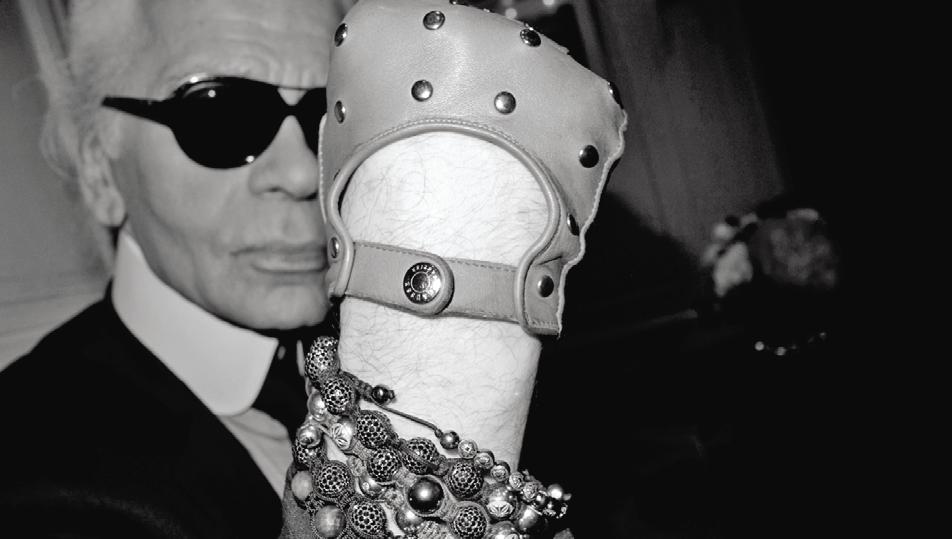


CoC o RoC ha record cold temperatures couldn’t keep guests away from a party at the darby to celebrate duJour ’s digital cover star: model coco rocha, a mentor on oxygen’s reality competition show The Face. “coco is an amazing star and an incredible woman, and i’m proud to call her my friend,” photographer (and The Face’s host) nigel barker says—and all this was apparent from the playful photos that came out of their duJour shoot. the pair mingled with guests like Hilary rhoda, fern Mallis and rebecca Minkoff while noshing on buttery lobster rolls and chewy chocolate-chip cookies. partygoers hit the dance floor en masse when the dJ played calvin Harris and florence Welch’s latest hit, “sweet nothing.”—Isabelle McTwigan
BeautyBooked.com
Scheduling a last-minute appointment at your favorite spa or salon can be a frustrating, if not nearly impossible, task. But thanks to BeautyBooked.com, New Yorkers now have access to the calendars of a select list of pampering destinations, boosting your chances for a spur-of-themoment visit. beautybooked.com
The number of life’s elements, each symbolized by a different color in flags: yellow for earth, green for air, red for fire, white for water, and blue for sky. Shamballa uses a rainbow of gems to convey these elements: rubies, sapphires, emeralds and green tsavorites, turquoises and white and brown diamonds. 5
copenhagen-based jewelry brand x Jewels, a karl lagerfeld favorite, has just unveiled its new collection, which celebrates the familiar sight of tibetan prayer flags bedecking the Himalayas. Here, we break down the pieces by the numbers.
Ruby bracelets from $13,610, wempe.com

How many master craftsmen it takes to cut each raw gem into a small square plate, which is then braided into the Lock bracelets.
3,728
The scene-stealing choker has this many pavé diamonds, laid by hand.
5,930
The cost in dollars of a small Lock bracelet, which is made with unusual peach moonstones and white pavé diamonds on yellow gold. It’s one of the line’s starter items.
du J our: s H a W n M ic H ael l o W e p H oto G rap H y; la G erfeld: Mic H el d ufour/Getty iM a G es; bracelets: courtesy of s H a M balla J e W els

Realty firm town has opened its eighth Manhattan office—making it the fourthlargest real-estate company in new york city—on West broadway and Grand Street in SoHo. Town has become a soughtafter employer, not only for its success in the industry but also for its office culture. as a customer, you’ll come in looking for an apartment and you’ll end up wanting to move into this industrial-chic space.—C.N.



Diesel Black Gold has tapped Italian jeweler Ugo Cacciatori, whose mile-long résumé includes previous partnerships with Emanuel Ungaro and Marni, for a long-term collaboration that officially starts this spring. Handmade by Italian artisans, the head-turning bronze pieces finished in titanium—from rings and pendants to leather belts—in their first collection feature fine-detail work that creates texture and depth. A special final coating process lends each item an iridescent glow, adding just the right amount of whimsy.

Boston native Halsey Meyer Schroeder is going against the grain to champion the cause of fashionable older women with her new e-shop, Halsbrook.com. “Online shopping largely caters to a young, edgy demographic,” the Harvard Business School graduate, now based in New York, says. “You’ll see a pretty dress styled with distressed-leather boots. That’s too flashy and too young.” Schroeder wants Halsbrook to appeal to the sensibilities and tastes of women over 35 looking for a sophisticated, stylish stock of clothing and accessories that will take them from a daytime meeting to a casual dinner. On the site, shoppers can browse luxe cashmere sweater-coats, subtly detailed dresses and statement jewelry from high-end brands like Armani Collezioni, Max Mara and Paule Ka. “We’re focused on quiet elegance,” Schroeder says. halsbrook.com
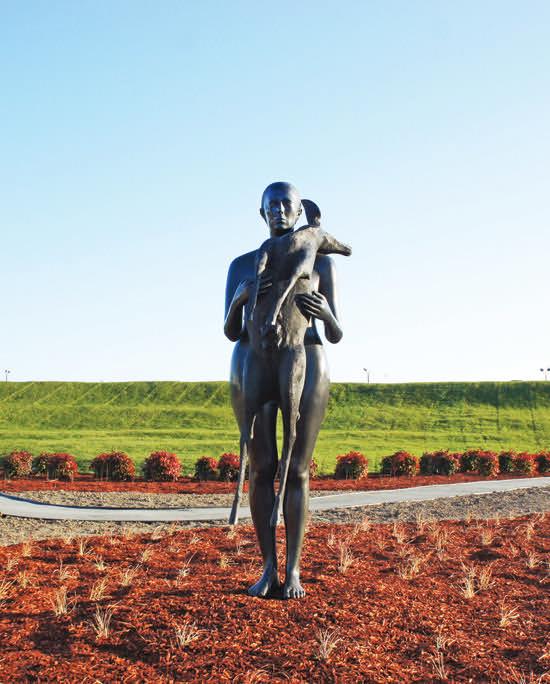
New Jersey’s seaside gaming mecca is undergoing a cultural face-lift thanks to Artlantic, a new, five-year public art program that aspires to refine Atlantic City’s party-and-go reputation. Spearheaded by Lance Fung, a New York City–based curator who has worked on high-profile exhibitions at the Beijing 2008 Olympics and the Edward Hopper Historical Museum, the project will tap art-world veterans, including Kiki Smith and
John Roloff, to create installations for two locations near the historic Boardwalk. Conceptual artist Robert Barry, a Teaneck resident, constructed large-scale illuminated words like Wonder and Glorious from materials such as anchors and LEDs and embedded them in grass mounds near the Claridge hotel (to be unveiled this spring). “I hope the exhibitions help the rest of the country realize that A.C. has much more to offer than what is in the paper,” Fung says. artlanticblog.com



Just days after Hurricane Sandy tore through the area, Borgata Hotel Casino & Spa staged its fifth annual Savor Borgata event—spearheaded by Becky Shultz—in an attempt to raise people’s spirits and celebrate one of the primary reasons Atlantic City is such an entertainment hot spot: food. For two days the Borgata’s big-name culinary masters, from Wolfgang Puck to Bobby Flay, were on hand hosting demos and workshops. During the Saturday-night showcase, all of the property’s restaurants set up stations of sushi, steak, desserts and more, feeding and satisfying 600 guests. theborgata.com


The Garden State has two new incentives to get fit with the recent unveiling of Equinox’s inaugural new Jersey locations. t he fall brought an outpost to sum mit, followed by one in Paramus: It’s a two-floor exercise haven that features handsome design touches like skylights, ivy-draped walls, and a travertine stone-sculpture centerpiece. along with the chain’s devotion-inspiring Pilates, yoga and cycling classes, the paramus location will offer other signature classes like Barre Burn, metcon3 and Whipped! equinox.com

former nobu pastry chef Jessica isa acs has set up her own bakery in Jersey cit y’s bustling downtown. t he raw-chic interiors are outfitted with mostly reclaimed wood and vintage furnishings to create an easygoing backdrop to isa acs’ ready-made and custom cakes, cookies and pastries. her specialties include cake truffles and a croquembouche, a cone tower of cream puffs filled with pastry cream and bound with spun caramel—all of which are packed with premium ingredients, like tcho chocolate from san fra ncisco and val rhona from fra nce. gluten-free folks: fret not! after the opening buzz simmers down, Isaacs hopes to expand those offerings (content yourself for now with her delicious wheat-free cookie). cocoabakerycafe.com


This 24,000-square-foot estate on five sprawling acres, available for $39 million, boasts striking views of the NYC skyline and a celebrity-studded past. poland’s Count Stefan de Poniatowski commissioned it in 1926; Joseph Kennedy and silent-film star Gloria Swanson later made it their love nest. In 2000, Control Equity Group CEO Edward Turen bought and renovated it, adding an infinity pool, a bocce court, an aviary and a home theater. soon after, Woody Allen used gloria crest in The Curse of the Jade Scorpion. And in 2012 Turen’s son’s wedding was held here; among the guests: Zac efron, Robert Pattinson and Kristen Stewart. sothebysrealty.com. Lindley Pless
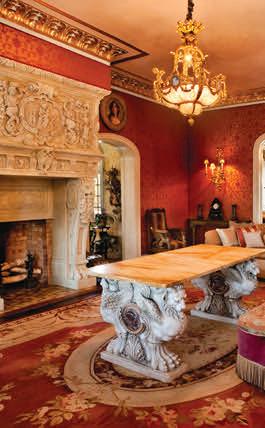
The living room still has the original carved-sandstone fireplace.


Swivel necklaces, $52, 31 BITS, 31bits.com





2405 Park Avenue, Tustin bowlmor.com

Kallie Dovel, then a college student, found her passion—and profession—in 2007 when she traveled to Uganda. There she met a community of women who had exceptional jewelry-making skills but were struggling to make ends meet. The following summer, Dovel returned with friends, and the group came up with a business plan to market their 100 percent recycled-paper bead necklaces in the States.

Today, the Newport Beach company, 31 Bits, employs 108 female artisans in northern Uganda. And its support goes way beyond regular paychecks: “We open bank accounts with them and provide English lessons, health education, business classes and more,” explains Alli Swanson, one of 31 Bits’ cofounders. It also operates a four-year training program that prepares employees to launch their own small businesses. “Our first round of 10 ladies will be graduating this year,” she says. “They are dreaming for their future, and it’s amazing to see them thrive.” 31bits.com

21095 Raquel Road, Laguna Beach thepearllaguna.com
Herb’s the word at The Pearl Laguna this spring, thanks to the eco-chic resort’s new medicinal tea garden. Co-owner Katresha Moskios grows a variety of exotic and domestic plants, which she brews into beverages to treat guests’ problems, including issues such as eczema, stress and insomnia. Adding to her teas’ popularity? They’re delicious.
Bowling and artisanal cocktails aren’t the most obvious combination, but Bowlmor Lanes Orange County pulls off the pairing with panache. Part bowling alley and part upscale lounge, the sleek, retro-inspired space contains 30 glow-in-the-dark lanes, an arcade, a full-service dining room and a bar that, come spring, will feature a revamped drinks menu. To get a taste of what’s to come, mix up a Pineapple Almond Daisy with this Bowlmor recipe.

1 ounce Bombay Sapphire
¾ ounce Disaronno
¾ ounce pineapple juice
½ ounce lime juice
½ ounce simple syrup
5 mint leaves
Combine all ingredients in a glass. Shake vigorously, then strain into a highball glass with ice. Garnish with a pineapple wedge and a lime wheel.
For its ninth annual Diamond & Pearl Ball, Beckstrand Cancer Foundation transformed the Hangar at the OC Fair & Event Center into Moscow’s Red Square, complete with enormous Fabergé egg centerpieces, Kalinka dancers and Russian Standard Vodka–bearing waitresses who swooped down from the ceiling. The black-tie gala honored the late Farrah Fawcett (who succumbed to cancer in 2009) and the actress’s close friend Alana Stewart for her continued advocacy efforts as president of the Farrah Fawcett Foundation. During the evening’s live auction, host Eva La Rue’s husband, Joe Cappuccio, paid a cool $100,000 for the actress to help test-drive and select the 2013 Robb Report Car of the Year.




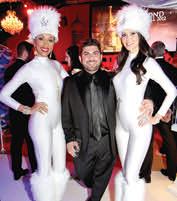





Laguna Beach’s AR4T Gallery exercised its right to free speech with “Elephants & Asses,” a politically charged group show that reached across party lines to comment on the state of our government. Local art patrons were on hand for the opening of the exhibit, which included pieces by Adam Mars (Girls Say Obama Has a Big Debt ), David Blake (Trickle Down Economics ) and Nick Simich (Vote Spicoli ). One highlight was a mixed-media work by on-the-rise trio Threee Brothers entitled The Unity Plan, which melded political and cultural icons into a large postmodern collage.— Evelyn Crowley

“Life is better underwater,” Chris Leidy says. But things are looking pretty good for him on dry land, too. The grandson of fashion icon Lilly Pulitzer, Leidy is making his own mark on the world—not through clothing but through art. The selftaught photographer, who owns a gallery in his native Palm Beach (219 Royal Poinciana Way ) specializes in images of the aquatic realm.
“When I’m underwater, I tend to get lost in my own world,” he says. That much is clear from his photographs, most recently those shot in exotic locales that include Papua New Guinea and Indonesia. Still, no waters stir Leidy’s creativity as much as the ones in Florida.
“Just take a look a round. My home is sitting on the ocean and its peaceful white beaches,” Leidy says. “There’s no place better than Palm Beach for an underwater photographer to get inspired.” leidyimages.com

Argentina native Nic Roldan, 30, is the youngest person ever to win the U.S. Open Polo Championship. A third-generation player who lives in Wellington, he opens up about sports, stardom and life off the field.
Where’s your favorite place to play polo? For me, Wellington is the greatest—the facilities are some of the best in the world. I also enjoy the Hamptons and Santa Barbara for summer polo and
Aspen, where I usually play polo in the snow.
What’s it like being on the field? Nothing compares to polo for me. It’s an extreme sport. We put our lives on the line every time we step on the field.
What do you love most about polo? The horses! They’re such beautiful animals. I’ve been riding since before I could walk.
What’s the dating scene in Wellington like? I’m in a serious relationship. It’s tough with all the traveling I do, but we manage very well.

While winter calls for warming red wines and summer’s heat is best cooled by a chilly glass of white, the spring months offer the opportunity to serve your guests a wider variety. Mariya Kovacheva, sommelier at Palm Beach’s Café Boulud, shares her picks for the bottles to bring out this season. danielnyc.com
Rosé champagne can be an aperitif or it can be paired with vegetables, seafood and light meats.
Arinto wines from Bucelas, Portugal, are terrific with different types of shellfish.
Reds from Sicily, like Nerello Mascalese or Frappato-Nero D’Avola blends, are great with grilled fish or pasta.

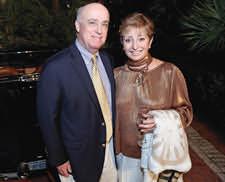
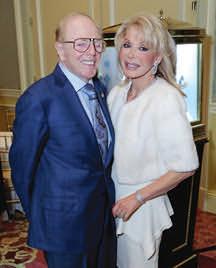
Henri Barguirdjian, president and CEO of Graff, celebrated the launch of the Cavallino Automotive Classic, a six-day event for Ferrari owners and car enthusiasts, with a cocktail reception at the Breakers Resort. On the front lawn, guests like Bridget Koch, Lawrence Moens and Hilary Geary Ross enjoyed caviar, vintage cars and many carats of fine jewelry—including a $12 million, cushion-cut Burmese ruby “We are thrilled to be sponsors, and what a perfect time to celebrate with our friends,” Barguirdjian says.




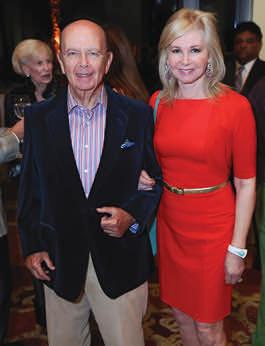




“The Great Gatsby hosting Casino Royale”—that’s how Paradise Fund chair H. Loy Anderson described the nonprofit group’s fifth annual casino fundraiser. Held at Palm Beach’s Flagler Museum, the black-tie event attracted a mix of locals and visiting New Yorkers. The snacks came courtesy of Būccan chef Clay Conley, and drinks were from New York City cocktail bar Death & Company. “For one night, we bring Monte Carlo to the island. It’s elegant, energetic and fun,” Anderson says. “And the best part is we get to do it all for a great cause: helping children near and far.” As crooner Doug Acosta performed, revelers danced and gambled for the chance to win amazing prizes, including one-of-a-kind earrings by John Brevard.—Adam Rathe

With his popular cooking shows, restaurants, cookbooks and NapaStyle stores, Napa Valley chef Michael chiarello always has multiple irons in the fi re. Now his newest ventures are Coqueta, meaning “flirt,” a spanish restaurant on Pier 5 in the Embarcadero, and a cookbook, Live Fire, both coming soon. Inspired by years of trips to Spain, the chef is tackling regional dishes from Madrid, catalonia and the Basque Country and bringing them to the Bay Area. architects alberto rivera and Michael Guthrie outfitted the new waterfront eatery with a glass-enclosed

terrace so that tapas may be savored with the stunning views.
At Chiarello Family Vineyards in Napa, the chef hosts a beloved tradition every spring: a live-fire party, where he slow-cooks a young lamb or kid goat on an iron cross. Having grown up with “meatless” Fridays, chiarello also relishes preparing tiella, a vegetable casserole roasted until it’s caramelized, bubbly and succulent. The father of four thinks a vineyard is the perfect place to raise a family. “I try to live as a vintner,” he says. “Growing grapes lets you observe the cycle of life, and my children and I get to watch our ecosystem at work.” michaelchiarello.com

Julie Wainwright started refining her eye early on: Her mother taught her the color wheel when she was little more than a toddler. Today Wainwright is the founder and CEO of the RealReal, an online resaler of luxury brands like Prada, Balenciaga and Lanvin marked down as much as 90 percent. (Bonus: They even take returns.) With celeb stylists (Jeanne Yang, Elizabeth Stewart) and consignors (Jennifer Garner, Courteney Cox), Wainwright has access to the most fashion-forward pieces. therealreal.com



What is your signature accessory? A classic Chanel bag is timeless.
Who is your favorite celebrity consignor? Vivica A. Fox’s shoes absolutely blew my mind—she proves that every woman can be gutsy with footwear.
Which pieces from your current sales are you pining for?
Alaïa caged booties, Chanel dresses, Rick Owens jackets and a pair of mesh cutout Louboutins.







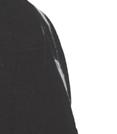
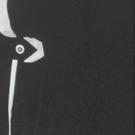




Which innovative designers do you admire? Victoria Beckham’s line is to die for. I love the Row, too. Their materials take my breath away.
Your weekday go-to ensemble? Pencil skirt, Chanel jacket and Louboutin heels, four inches or higher.
Favorite style icons?
Georgia O’Keeffe wore an effortless uniform in all black to focus her creative energy on her canvas. When I was growing up, my mother was always current with graphic ’60s prints, and her hair was just so, but she was still edgy for southern Indiana.
Laguna at Hayes
louesaroebuck.com
Roving artist Louesa Roebuck forages for flowers to create her elegantly imperfect arrangements. She supplies Bay Area restaurants Chez Panisse, Camino and Bar Tartine with her flora, and now they’re available alongside ceramics and pottery in her new store. This fragrant—she’s particularly fond of magnolias—shop in Hayes Valley shares a space with In Bed with H.D. Buttercup, an organic beds and natural linens store.
3811 Noriega Street establishsf.com
A wall of succulents, bold-hued macramé and sandworthy style all mingling in an airy space—Establish might be the next best thing to a trip to the beach. Owners Sara Stockalper and Erica Maver curate a selection of housewares and locally designed clothing and jewelry in a space that’s equal parts art gallery and boutique; it’s been the site of recent art openings and trunk shows. Custom design services are also available.
222 Sansome Street mandarinoriental.com
Glide in cozy slippers past a six-foot statue of Kuan-Yin, the Buddhist goddess of mercy, to your private suite complete with a rainforest shower. The Signature Spa Therapy at the hotel’s new spa, a balancing massage ritual with custom-blended essential oils tailored to your needs, was developed with input from consultants in traditional Chinese medicine. After the treatment, you can extend your relaxation over hibiscus tea in the candlelit lounge.


200 Post Street, shreve.com
2257 Larkspur Landing Circle, Larkspur marincountrymart.com
The Marin Country Mart just keeps getting better. The proof: new addition Space NK Apothecary. The U.K. import is chock-full of blushes, brushes, shampoos and serums from luxe beauty brands such as Kevyn Aucoin, Natura Bissé, Philip B and Ren.
When you think of old Hollywood glamour, you picture the big-screen luminaries of yore dripping with diamonds. In celebration of its 105th anniversary, jeweler Kwiat launched its Vintage collection at Shreve & Co., which explores styles spanning from Edwardian to Art Deco.


The devil was in the details at man-abouttown Ken Fulk’s revamping benefit for the Strand Theatre. Shuttered for 10 years, the former cinema and grind house is reopening as a venue for the American Conservatory Theater. The costume party, held in Fulk’s soMa studio with help from clients Laurie and Jeff Ubben, raised funds for the refurbishing. In keeping with the Victorian haunted-theater theme, fiendish revelers dressed to kill as gladiators, vampires and even popes. The space was transformed for the benefactors dinner prepared by renowned chefs Gary Danko, Tyler Florence, Jennifer Puccio and Nancy Oakes. under a full moon, partygoers rocked out to a performance by Stevie Nicks, who thanked San Francisco for being the place where it all began for her. “We really pulled out all the stops this year and hope to make it an annual event going forward,” Fulk says.






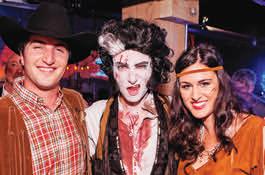


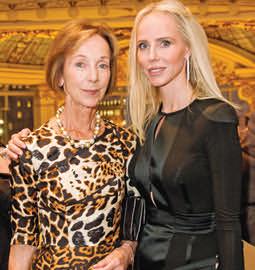


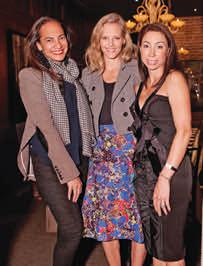
The Brits filled Neiman Marcus with their good cheer, saluting u.K. brand Belstaff over Pimm’s cups and a chic dinner at Quince in Jackson Square. As lovely as the English roses on display, Claiborne Swanson Frank , Vanessa Getty and Connie Nielsen celebrated the revival of Belstaff’s tailored clothing by CEO Harry Slatkin and head designer Martin Cooper Thanks to their efforts—and a gorgeous ad campaign featuring actor and rebel Ewan McGregor —the 89-year-old brand is hot again. “Belstaff is an aspirational brand but also one you can really live in,” says swanson Frank.
561 Valencia Street
bartartine.com
chad robertson devotees and Mission hipsters can order sandwiches—to eat in or to go—at his new cafe and bread shop in Bar Tartine. Crowd-pleasers include the smørrebrød: an open-faced rye-bread sandwich spread with either chicken liver pâté, apricot and parsley, or corned beef, horseradish cream and fried onion. The bakery’s famous bread is made from heirloom grains and baked in a custombuilt oven.
468 19th Street, Oakland duendeoakland.com
Oakland’s uptown has much to celebrate with the opening of Paul Canales’ Duende, next to Flora, which he cooked up with partner Rocco Somazzi. The Spanish phrase tener duende means “to have soul,” and it’s a fitting name. The authentic Spanish and Basque comfort food includes classic tapas—both frios (cold) and caldas (hot)—like fritos mixtos, canalones, croquettas, albondigas and cazuelas; leave room for Canales’ paella, too. In a loft above the kitchen, guests can enjoy some of the Bay Area’s best musicians, such as Charlie Hunter. Among the offerings in Duende’s on-premises bodega are artisanal olive oils, house-made charcuterie and confections, and Ici Ice Cream treats. Morning people will be tempted by the sweet and savory breakfast creations and the expertly made Verve coffee and espresso drinks.

740 Valencia Street
dandelionchocolate.com
Willy Wonka has arrived in the Mission. At Dandelion, you’ll pore over artful displays on bean anatomy and how to taste chocolate. The High Seas bar ups the enlightenment factor—packaged with the salty sweet is If I Were a Wizard Chocolatier, a book of stories, poems
in case you’re still hungry...
813 Main Street, Napa thethomas-napa.com
Housed in a historic building that boasts Napa River views, this swank canteen, wood-fire grill and raw bar is a great happyhour hangout.
1900 Telegraph Avenue, Oakland floraoakland.com
From perennially packed Flora grew sister bar Fauna, where you can have a cocktail as you wait for a table next door.
kaTsu
and drawings by students at 826 Valencia, a nonprofit writing center cofounded by author Dave Eggers (some proceeds from the bar benefit the organization). The chocolatiers roast, crack, sort, grind, conch and temper small batches of highquality beans, which they then hand-mold and package. Sip hot cocoa at the café overlooking the workroom, and see the care this staff puts into all the products.
160 W. Main Street, Los Gatos katsulosgatos.com
Los Gatos has welcomed a chef bearing an impressive pedigree (Katsuhiko Hanamure worked at Nobu) with this decadent, upscale Japanese restaurant.
swee T Bar bakery
2016 Shattuck Avenue, Berkeley belliosteria.com
Craving a taste of northern Italy? Berkeley’s cozy new osteria offers heaps of pasta that will knock you into a satisfying daze. Fresh ravioli brim with surprising fillings, from braised pork, red cabbage and caramelized onions to roast duck and shiitake mushroom. Devour squid-ink tagliolini with tarragon prawns—they’re sprinkled with pecorino bread crumbs that you’ll chase to the bottom of the bowl. Warm-hued with brick and bright-red walls, Belli is casual and inviting. And don’t fret when your meal winds down: There’s still heavenly lemon verbena panna cotta to enjoy.—Nicki Richesin
2355 Broadway, Oakland sweetbarbakery.com
Heirloom flours, local fruit and Bay area chocolate: You’ll find artisanal baking at its finest at this new shop, helmed by Michael Jackson’s former chef.
Belcampo meaT co.
2405 Larkspur Landing Circle, Larkspur belcampomeatco.com
This organic meat shop—all animals are pasture-raised—brings farm to butcher and farm to table at the Marin country Mart.
Rabble-rousing rocker Courtney Love has a lot to say—but here, her handwriting does most of the talking
People who have an innate musical skill often form letters that look like musical symbols, like the f and d seen here.


Love’s dominant middle zone may indicate she’s an extroverted people person with an interest in psychology and learning about what makes people tick.

She uses a combination of print and script, which is a sign that she’s a skilled writer—and it might even be her calling.
With a last name like Love, it seems almost too fitting that singer-songwriter, actress and artist Courtney Love would operate based on a heart-centric mentality. But judging by the latent messages her handwriting sends, the rock superstar does just that—though it might be something she’s changing. After the words “Rule to Live By,” Love crosses out the symbol of a heart,
See the wide spacing between words? She has difficulty connecting with others and difficulty linking her unruly emotional process to logic and intellect.
perhaps indicating that earlier in her life, her “rule” was to follow her own heart, explains Toronto-based graphology expert Annette Poizner. “That’s not a successful way to live. However, if she adheres to the sensibility she describes in this quote, she could become a great role model for other emotional, sensitive types,” says Poizner. The 48-year-old Hole vocalist and guitarist—whose writing
Her letters vary greatly in size—the variability usually suggests an emotional, sensitive type.
Notice the elegant, whimsical way she forms her letters and connections— it’s a sign of aboveaverage intelligence and fluidity of thought.
The big presentation of her si gnature and her handwriting in general is characteristic of someone who enjoys being the center of attention.
demonstrates intelligence and musical skill—calls the quote, originally spoken by actress Jacqueline Bisset, “the wisest thing I have ever heard.” What does it mean to Love, exactly? “It means that age is not an issue, nor are looks,” says the musician. “It means that character is the most important part of being sexy or being youthful and of standing for something.”—
LINDSAY SILBERMAN
